THE FIRST



Junior Leagues are full of incredible women - here, we highlight just a few who stand out.
Understanding two of the strongest tools for effective League workCommunity Impact and Advocacy.
A look back on the life and legacy of one of The Junior Leagues' most notable Members.
Discover how Junior Leagues around the world are "Developing Women to Do a World of Good."
How two Junior League Members found a way to share with others how to celebrate their differences.
A highlight of what Members can expect at our upcoming event in New Orleans!
An exploration of different ways to motivate your team and how to learn to trust others to share the load.
What does the 2023 AJLI Mission change mean for the future of the Association?
2023 was a busy year for AJLI. Discover what we've done to improve your Junior League experience.
An incredible story of shared history between two Leagues across the nation.
The Junior League has a long history of publications – dating back to as early as January 1911. The first Junior League publication was the Junior League Bulletin , in which our founding League of The City of New York defined the organization “[as an organization of the young society women of New York whose objects are, first to promote, among its members, an interest in all kinds of charitable and social effort. Second to bring the members in touch with already organized philanthropies so that they may find the sphere of usefulness best fitted to their individual capacity.” As our organization changed, so did our publications, and over the course of the magazine's 83-year history, we see a variety of titles, from the Junior League Magazine to the Junior League Review - which is where its run ended in 1994.
We are pleased to revive these efforts to further unite our growing international organization, celebrate our Leagues and their Members, and provide insights and resources to advance members’ civic leadership skills.
Jacquelyn Bauman, Co-Editor-in-Chief Nicole Bergman, Co-Editor-in-Chief Inés Sucre, Managing Editor Melody LaRose, Editor
Elizabeth Whited, Graphic Designer
Emma Briggs, Contributing Writer
Jennifer Shea, Contributing Writer
Articles in this publication do not necessarily reflect the opinions of The Association of Junior Leagues International. Stock images courtesy of www.canva.com and www.istockphoto.com.
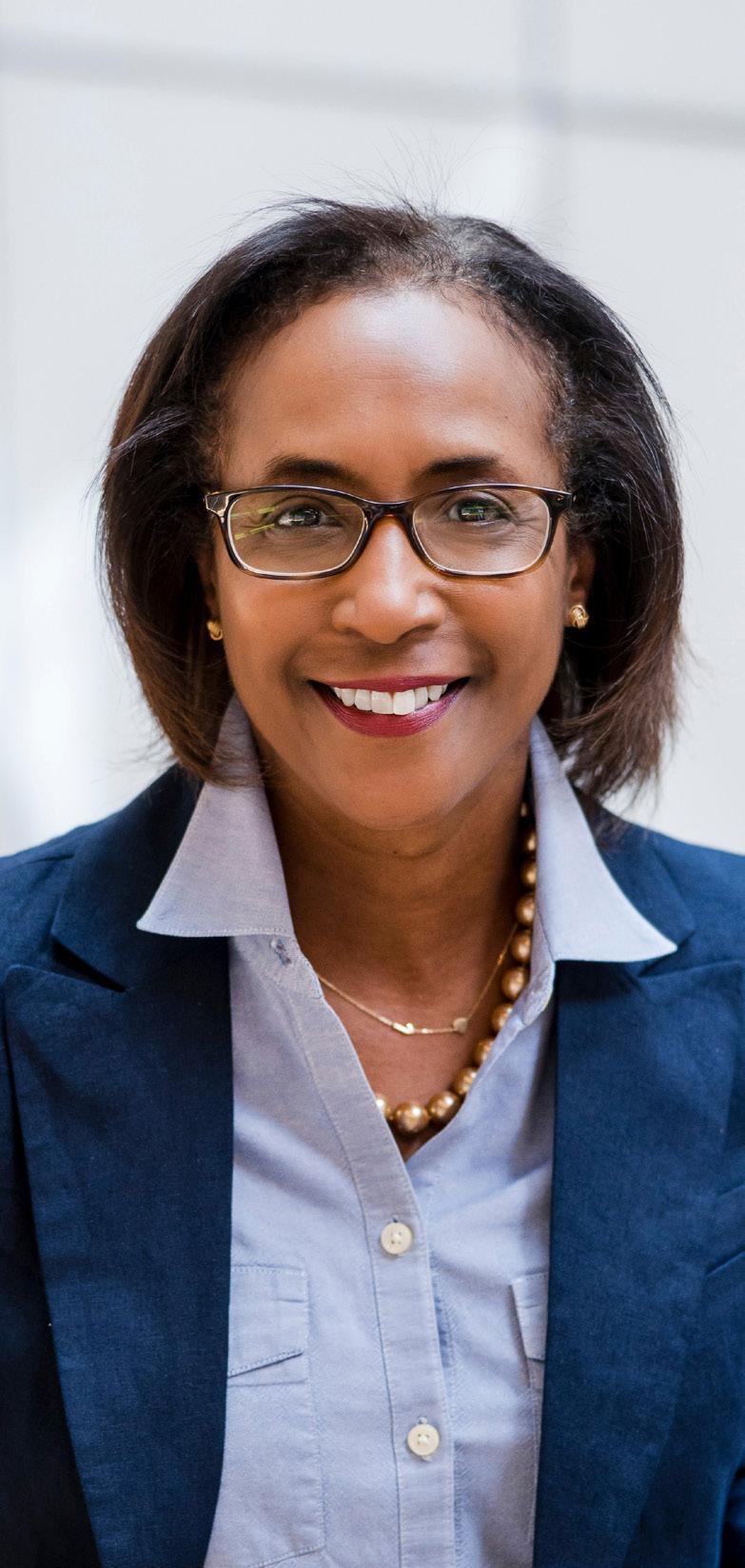
Now that 2024 is solidly underway, I find myself buzzing with excitement about what is to come. With some tough years for our organization firmly behind us and getting smaller in the mirror as we advance onward, there is so much to look forward to on the road ahead.
2023 brought us unprecedented growth and development as an association. Our inaugural Day of Giving in honor of Mary Harriman’s birthday surpassed its goal of 100 donors and fostered community involvement and support.
This year also saw the creation of our League Success department (through which we have assisted Leagues with thriving through challenges), and our first ever Find the Good Day which had a widespread impact on both our Leagues and their respective communities.
I could go on and on about all that we have accomplished this year. If you want more information, flip to page 30 in this magazine.
I am so incredibly proud of our association, which is 295+ Leagues strong and now exists in five different countries. There is incredible power in those numbers – there is SO MUCH that we can accomplish together. THAT is the power of association – our collective voice makes us unstoppable. The widespread community work that you all do tirelessly throughout the year never ceases to amaze me. Thank you all for all that you do to build better communities.
Here’s to each one of you and all the great things ahead for us in 2024.
Cheers, Dona Ponepinto AJLI President, 2022-24AJLI’s annual gathering provides training and connection for all League Members and attends to Association business. New Orleans, Louisiana
15-17

In May of last year, Julie Nolan, a longtime Member of the Junior League of Washington DC, was named Vice President of External Affairs for the United Network for Organ Sharing (UNOS) – a nonprofit that runs the organ transplant system for the United States. In her tenure on their senior leadership team, she advocates for patients in need of transplant by helping to advance the legislation and initiatives that will benefit those who are most in need of life-saving procedures.
A Junior League Member for over 18 years, she credits her Junior League experience with helping her build the skills that have made her successful in her professional life.
“There’s a complement between my League experience and my professional life, which is largely focused on federal policy making and advocating for change,” she explained. “In my League work, I’ve been able to build advocacy skills and coalition building skills that have complimented my professional success.”
In her work as a Junior League Member, she was co-chair for the Auction Subcommittee of the Junior League of Washington’s “Tossed and Found” event, which has raised over $2.5 million over the last 30 years for the community and the League. Her work in this endeavor earned her the Junior League of Washington’s Peer Award in 2022. The Peer Award is a Leaguewide distinction whereby Members of the Junior League nominate others in the League to recognize their work and contribution for a particular effort.
“I believe that was awarded to me because, much like other women in the League, I take the approach that no job is too small,” Nolan shared. “You need to pitch in wherever possible to achieve an end result.”
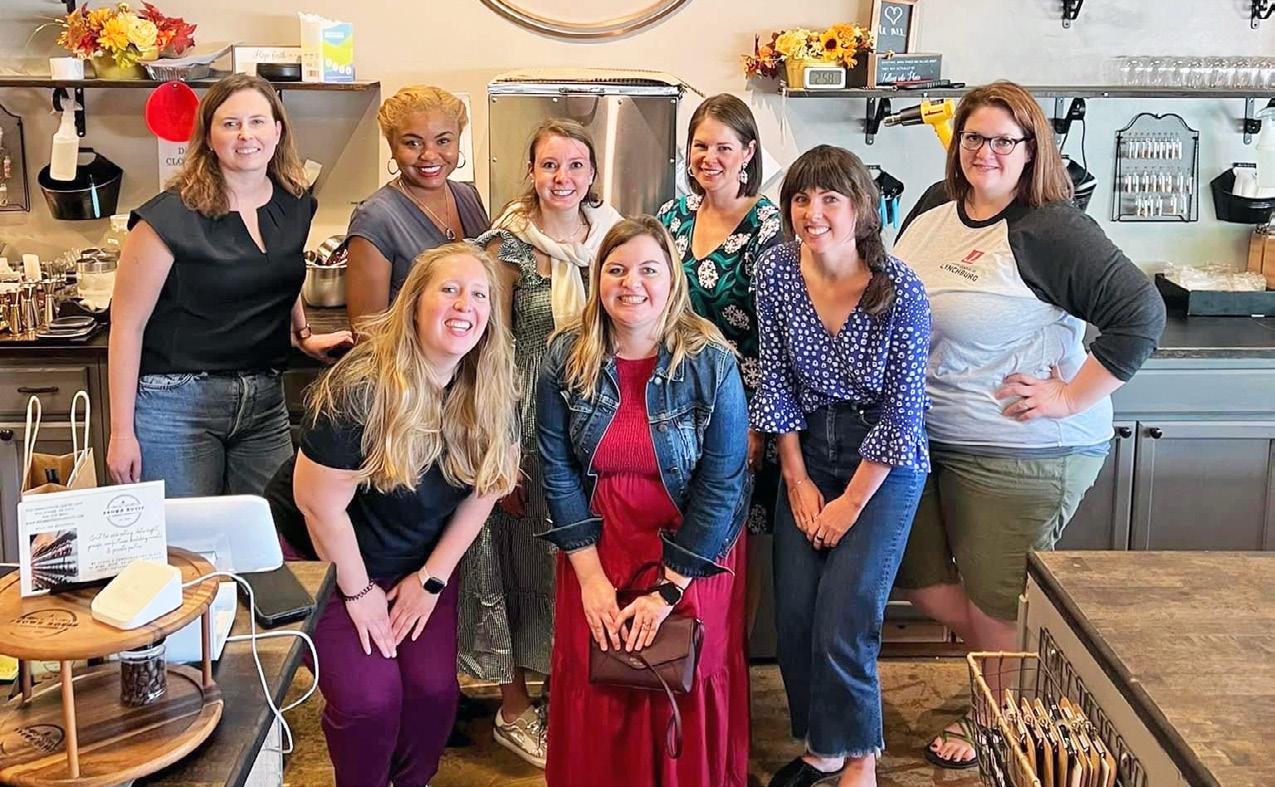
That tenacity has helped Nolan accomplish major changes in her short tenure as Vice President of External Affairs for UNOS, as she was a crucial player in the adoption of legislation that changes the way organs for transplant are transported.
“The coalition building skills I developed at the League helped in advancing the legislation to have organs no longer be transported as cargo,” Nolan explained. “There were 21 organizations across a broad spectrum of the healthcare industry who coalesced together to urge congress to include a provision that would enable the return of organs to be transported above wing in the cabin of an aircraft versus the current practice of cargo. This provides more opportunities and efficiency for transporting organs so that the precious gift of life can be transplanted in the most expedient manner for that individual who needs the organ.”
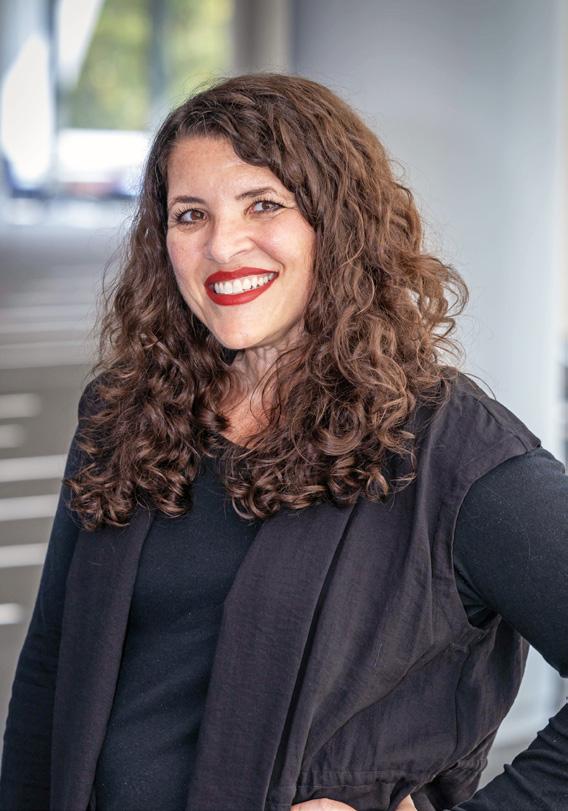
Barbara Kakiris is the current President of the Junior League of Cleveland. Professionally, Barbara is Director of Engagement and Stewardship for The MetroHealth Foundation, a role in which she designs, implements, and evaluates comprehensive donor engagement and stewardship programs for the hospital system. MetroHealth is redefining healthcare by going beyond medical treatment to improve the foundations of community health and well-being by focusing on health equity: affordable housing, a cleaner environment, economic opportunity and access to fresh food, convenient transportation, legal help, and other services.
Prior to her foray into the healthcare arena, she spent a decade in higher education (as Deputy Chief of Staff at Cleveland State University and Director of Summer Programs at Kenyon College) and 20 years in the federal government at NASA’s
It’s no secret that the Association of Junior Leagues International is full of incredible, accomplished women! Below are some highlights of the impeccable women of the Junior League and what makes them stand out! Would you like to be featured in a Member Spotlight? Click here to fill out our form to be considered for a future issue.
Glenn Research Center in various public relations, protocol, and event management roles. Before moving back to Cleveland, she was an elected official in Knox County, Ohio, helping to run and manage Gambier, OH as a member of Village Council. She earned a Bachelor of Arts (Hons) degree from Kenyon College in Gambier, OH and a Master of Studies (one of the first graduates in Women’s Studies) from The University of Oxford in Oxford, England. She has also completed certifications from Cleveland State University, MIT Sloan School of Management, The Brookings Institution, and The Protocol School of Washington.
Barbara has been recognized by various organizations with honors including the NASA Public Service Medal, United States Congressional Achievement Award, Inside Business Magazine’s ATHENA Award, JLC’s Frances Payne Bolton and Ruth T. Lucas Awards, Kenyon College’s Anne J. Robinson and Distinguished Service Awards, GLAMOUR Magazine’s Women at Their Best Award, and the Greek America Foundation’s Forty Under 40 Award. She was also inducted into the Lakewood Rangers Education Foundation (LREF) Alumni Hall of Fame. Barbara is active in her community, serving on the LREF board in addition to JLC.
Junior League of Orange County, CA
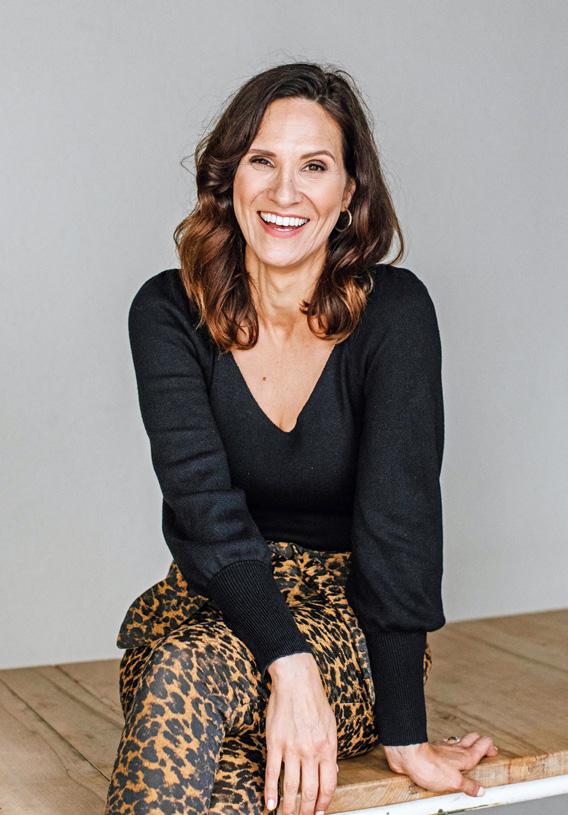
Erin Stone believes that her God-given purpose in life is helping others. This purpose drove her to join the Junior League of Orange County, CA, where she served on the Board of Directors for four years, including as President of the League.
“The opportunities afforded to me through the Junior League have been fundamental to everything I have done both personally and professionally,” Stone confessed.
In the past 12 months, Erin has co-authored three books aimed at small groups for women.
“I believe words have the power to heal, influence, and shape the world,” she shared. “I know that our most transformational moments can happen in small circles of authenticity and vulnerability, and I’m passionate about helping women know their inherent value and purpose.”
She credits the League with developing her skills through on-the-job training and the opportunity to gain exposure to leadership and collaboration opportunities that would not otherwise be available and credits the Junior League for shaping her into the woman she is today.
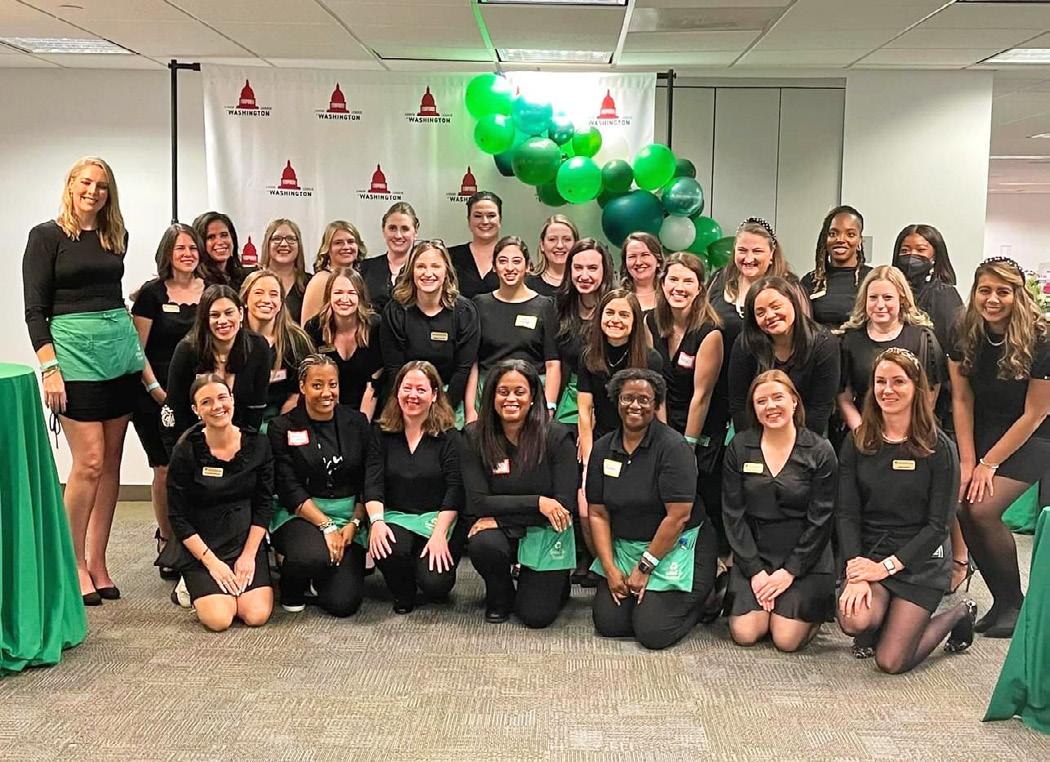
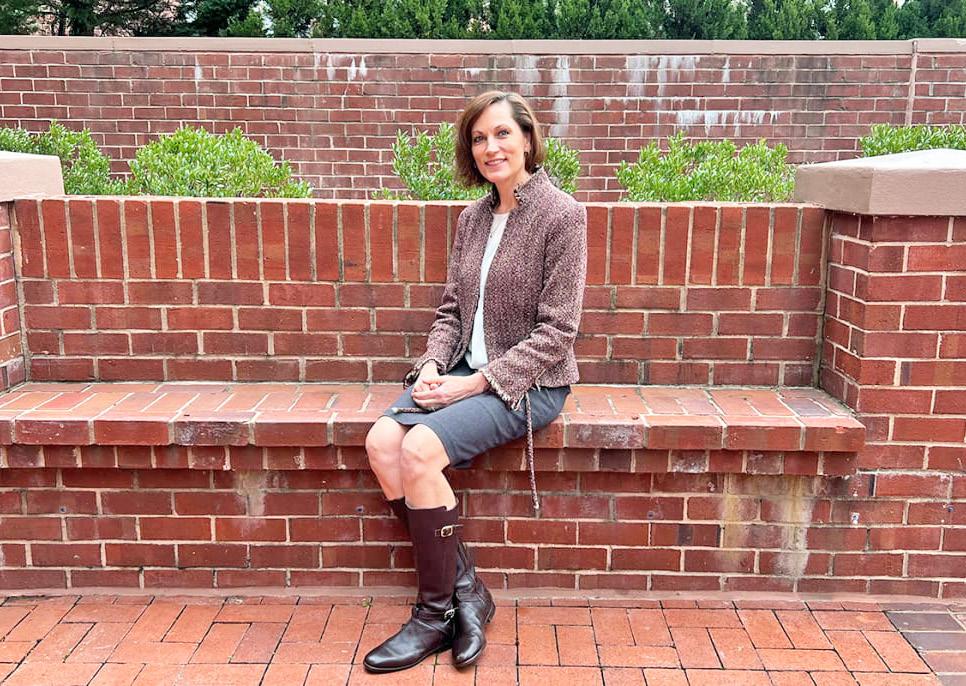
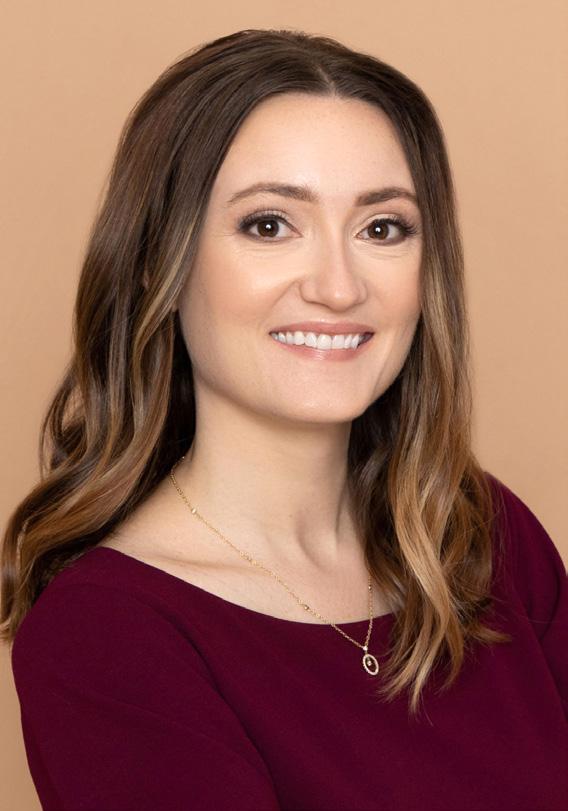
Nominated for a Member Spotlight by her League’s VP of Marketing & Communications, Kara Apfel, Alice Hudson Pell’s work in and outside of the League made her a stand out for the opportunity to have her accomplishments uplifted.
Pell has been a Member of the Junior League for over 10 years and has served in many different capacities during her time. From acting as Vice President of Development during her League’s Centennial year to serving on the Nominating Committee, to now participating as a Provisional Advisor, she has worked at almost every level within the League.
“Early on in my League career, I found myself at a crossroads,” Pell revealed. “I was a Member of a committee that wasn’t a great fit for me and was forced to ask myself, ‘what am I getting out of this?’ I had to decide whether to jump in or jump out and after reflecting on it I jumped in with both feet which set me on a phenomenal path. I love leadership and I love this organization. I think so much of what I’ve gotten out of this experience is not necessarily through attending trainings or a course or a class, but the learning by doing and developing those soft skills. Learning how to manage a volunteer who won’t call you back or learning how to manage your time or how to handle conflict or changes in processes.”
Pell credits that jump in, jump out’ moment in her League career as a turning point in her leadership journey, which has now led her to her current position serving as the Executive Director of TennGreen Land Conservancy, where her team continues to break fundraising records for their organization. In 2020, Pell and her team ran a virtual “Hike-a-thon” for their organization to replace the annual fundraising dinner they were unable to host due to COVID-19.
In the first year of the “Hike-a-thon,” Pell and her team raised over $76,000 and that number has only grown over time, now raising over $155,000 through this program.
“Being a part of the League helped me accomplish our fundraising goals through the Hike-a-thon in so many ways,” Pell noted. “I manage a team of 12 people and they’re all very diverse in the ways that they think and work and accomplish goals. My League experience taught me very well over all of my placements how to handle many different personalities. Plus, I learned how to pivot.
Our annual dinner presented so many challenges. Tennessee is a long state, so getting everyone to downtown Nashville for a dinner is a lot already and then considering we’re a naturebased non-profit, a gala isn’t a major draw for our outdoorsy crowd. My League experience taught me to look outside the box and look to others so it was very helpful using that to establish our organization’s Hike-a-thon to reach our goals.”
“Early on in my League career, I found myself at a crossroads,” Pell revealed. “I was a Member of a committee that wasn’t a great fit for me and was forced to ask myself, ‘what am I getting out of this?’ I had to decide whether to jump in or jump out and after reflecting on it I jumped in with both feet which set me on a phenomenal path. I love leadership and I love this organization.
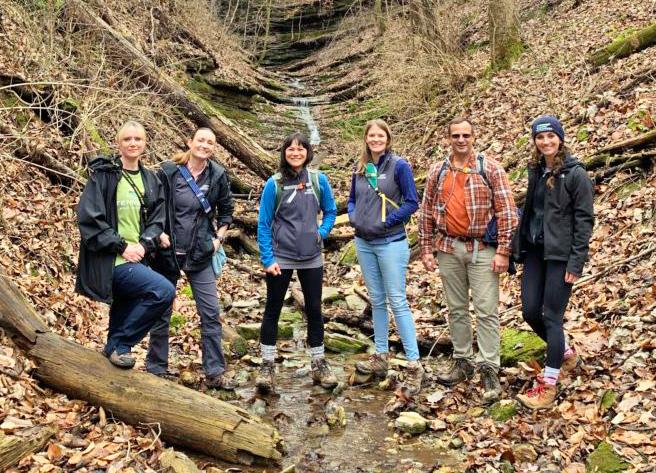
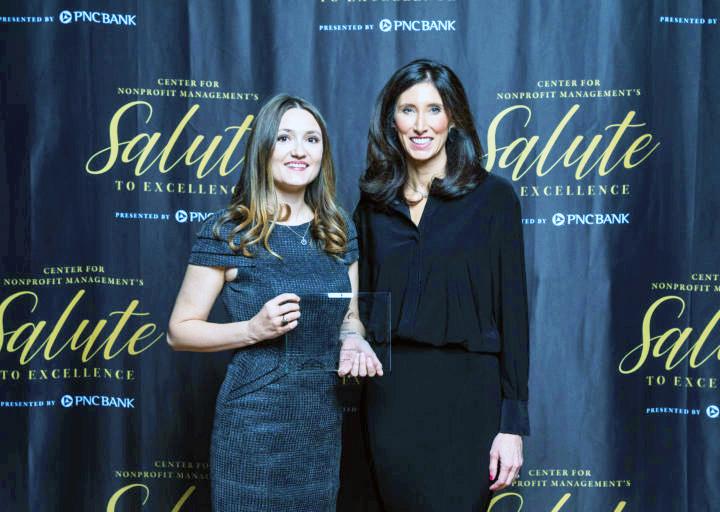
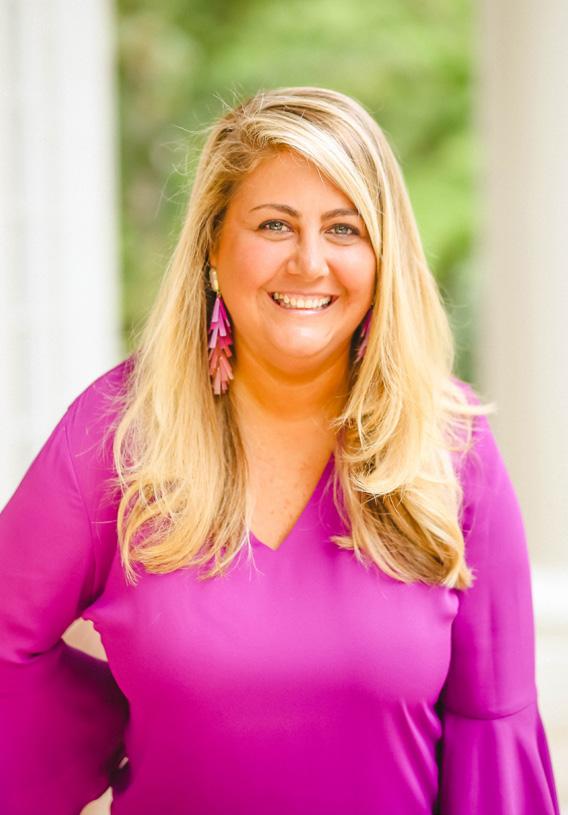
A relatively newer Member of the League, Hara Henshell of the Junior League of Atlanta is already making an impact both in and out of her League. Having joined as a Provisional in 2019 and becoming an Active during the height of the COVID-19 pandemic, Henshell is driven by and dedicated to the Junior League mission. Last year, she was appointed as Fund Development Vice President-Elect of her League. During this time she has helped to fundraise for initiatives like Wallspring Living, Atlanta Mission, Agape Youth and Family Center, Journey to Literacy, and more.
“Being a part of the Junior League has helped me develop skills in a more expedited way than I would have achieved outside of my experience,” Henshell explains.

T“Being connected with incredibly motivated women and learning from them, as well as getting hands-on work in areas of non-profit work may not have had the opportunity for elsewhere has helped to strengthen my skills.”
Outside of her League experience, she was recently appointed as the Executive Director of Phi Mu Fraternity. She originally joined the Fraternity staff in 2008 as the Director of Member Services and was most recently the Assistant Executive Director where she is well-known to Phi Mu members and volunteers, and also to the organization’s interfraternal partners through her work at the Junior League of Atlanta.
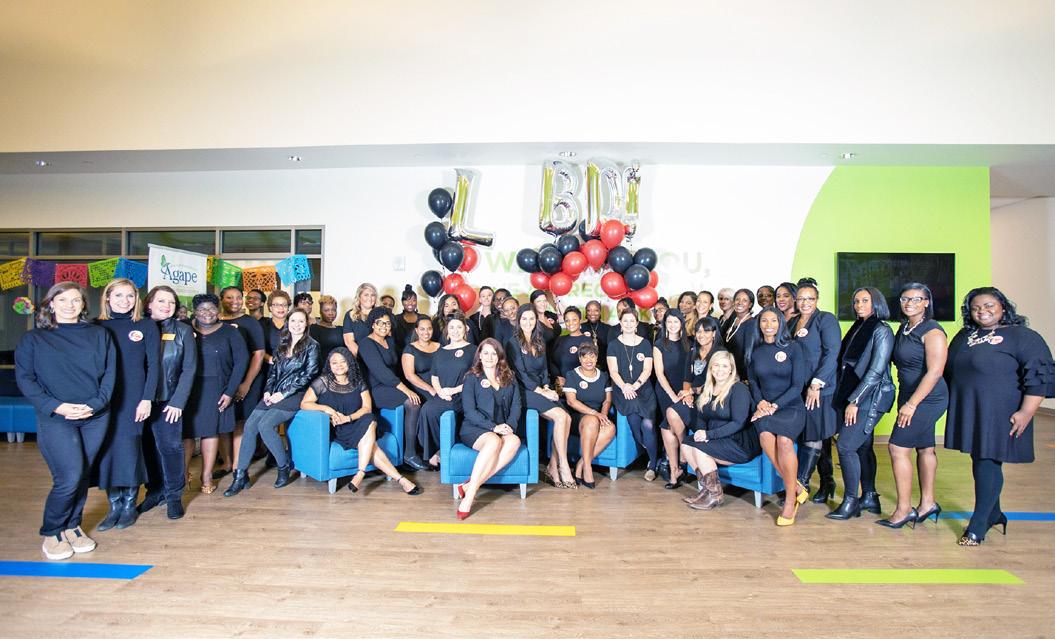


he Association of Junior Leagues International is thrilled to announce our inaugural 40 Under 40 and 40 Over 40 biannual recognitions. These recognitions aim to celebrate and honor outstanding Junior League Members who have demonstrated exceptional achievements in their various fields and careers. We believe in acknowledging and highlighting the accomplishments of women who have made a significant impact on their professions and within their communities.
Both awards will be given every two years. The 40 Under 40 will be awarded in 2024, followed by the 40 Over 40 in 2025 – the application for which will open in the winter of 2025.
To be eligible for consideration, nominees should embody the following criteria:
• The nominee, through her work and community involvement, empowers both herself and others. Examples may include initiatives that uplift and inspire individuals to reach their full potential.
• The nominee demonstrates outstanding leadership in her profession or area of service. This can include accomplishments, innovations, or a demonstrated commitment to driving positive change.
• The nominee is actively creating a positive impact on her community. This can encompass contributions to local organizations, volunteer work, or initiatives that address community needs.
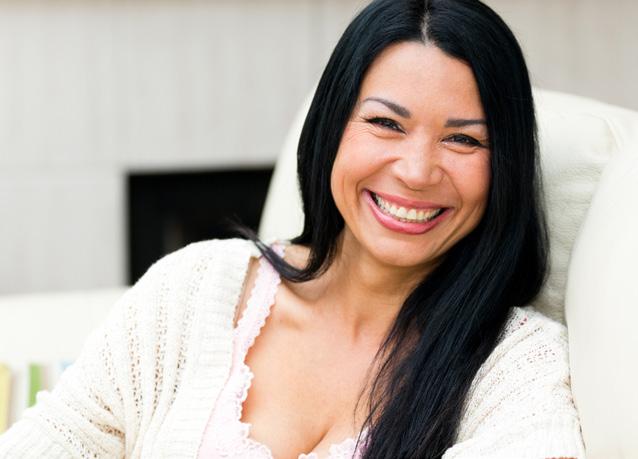
Junior League Members who have been in The Junior League for at least two active years may submit information to their League for consideration as a 40 Under 40 nomination. Applicants will complete this form and submit it to their Board or appropriate committee as their League sees fit. Each League will then nominate one Member to AJLI for consideration.
Nominations to AJLI will be accepted until March 15, 2024. Those selected and their League will be notified by April 15, 2024. All 40 Under 40 winners will be recognized at our Annual Conference’s opening event. Please note that the nominee and/or League will be responsible for the cost of attending Annual Conference.
If you have any questions, please reach out to Ginny Manguno at gmanguno@ajli.org.
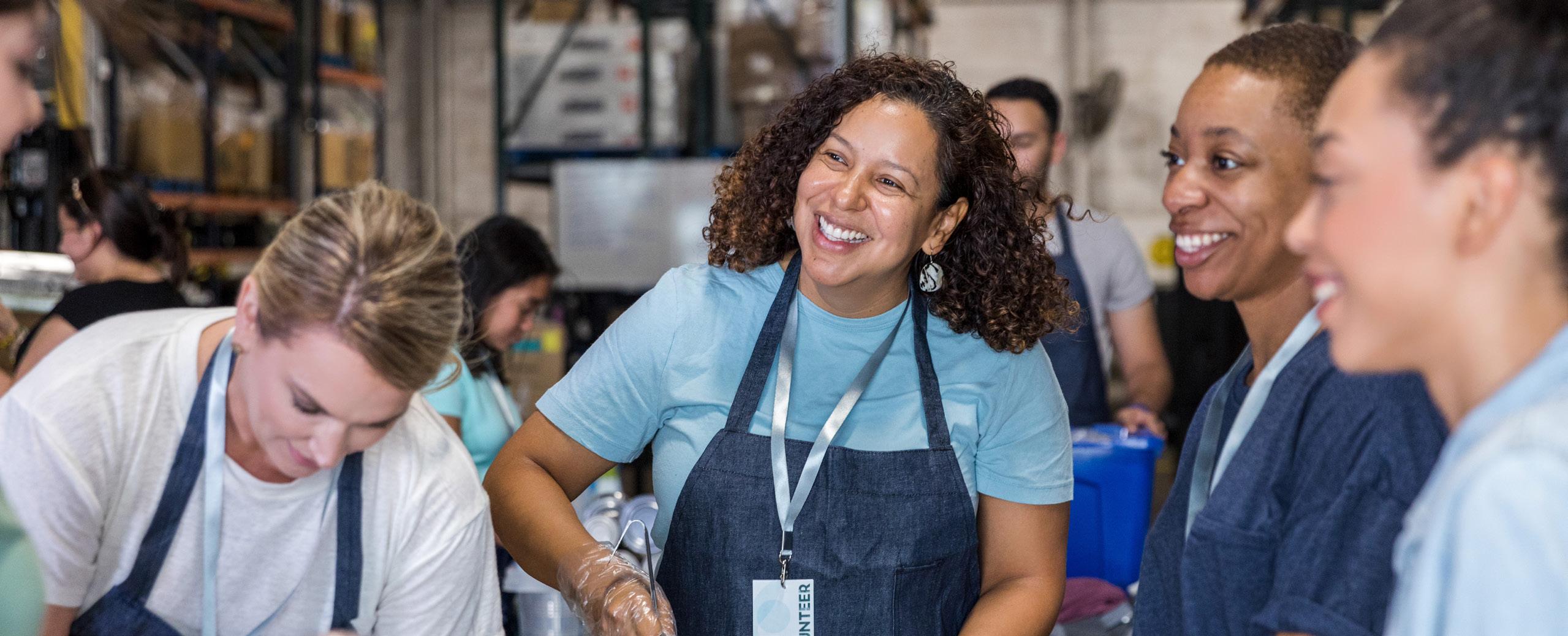
As a Member of the Junior League, it is likely that you have heard the terms “community impact” and “advocacy” thrown around more than once. As dedication to improving communities is often a driving factor for an individual to join our organization, and with advancing “…women’s leadership for meaningful community impact through volunteer action…” as a major component of AJLI’s mission, these tenants are core to the Association’s identity. But what do these terms actually mean?
Community impact is different than direct service through volunteering. Community impact is rooted in long-term, sustainable effects, not a Band-Aid fix. For example, while providing direct relief through volunteering for a food bank shift is important work, a community impact initiative would be one that centers around the root cause of food insecurity in the community.
As a long-standing organization, The Junior League should be focusing locally on the most pressing needs in their community based on research and conversations with key stakeholders and investing in projects and programs that address these needs on a deeper level.
Advocacy is a strategy used to further community impact goals. It focuses on developing long-term systemic changes through actions such as creating public awareness, public policy, lobbying and more. An example of legislative advocacy would be Junior League Members meeting with local government representatives to ask for their support on increased voter registration access. An example of public awareness advocacy would be Junior League Members monitoring a voter registration booth at a street fair.
So many of our Leagues have established massively successful efforts in both the community impact and advocacy spaces. Whether your League is large or small, community impact and advocacy are the tools you need to make a difference in your community. Here are just a couple of examples of some of the amazing work our Leagues are doing:
• Despite being a small League, the Junior League of Mexico City used their collective action for greater impact by partnering with the Pro Mexico Indigenous Foundation on the Drop of Water that Spills project. This initiative took preventative measures to stop the spread of COVID 19 and combat extreme poverty through access to water by building cisterns to capture rainwater. Over the past four years, they have built 4,500 cisterns in conjunction with the community.
• The Junior League of Billings, MT hosts a Free Laundry Project which provides access to free laundry services for 40-60 families per event and distributes $7,000 to families in need.
• Last year, Members of the Junior Leagues of California State Public Affairs Committee had a sponsored bill passed that requires employers to provide employees and their partner with up to five days of job-protected reproductive loss leave following a miscarriage, unsuccessful assisted reproduction, failed adoption, failed surrogacy, or stillbirth.
• In January 2023, The Junior League of New York hosted a Legislative Breakfast which created necessary dialogue between representatives from the mayor’s office, city council, and community partners on the mental health care needs of their city. They also advocated for the Michelle Alyssa Go Act which repeals limitations to Medicaid coverage of services provided in institutions for mental diseases.
These are just a handful of examples of the great community impact and advocacy work performed by Leagues all across the Association. Next we delve more into one more such program from the Junior League of Evansville, IN.
If you would like to have one of your League’s community impact or advocacy initiatives elevated in a future issue of The League Life , go to www.surveymonkey.com/r/LLCIA.
In 2019, after researching the greatest needs in their community, the Junior League of Evansville (JLE) selected food insecurity as their new issue area. According to Feeding America, “food insecurity is an official term from the United States Department of Agriculture (USDA). It’s when people don’t have enough to eat and don’t know where their next meal will come from.” In the United States, “over 44 million people, including 13 million children, experience food insecurity annually.”
There are four main dimensions of food insecurity – availability, access, utilization, and stability. In food-insecure households, people must make choices between getting only what they can afford – which is usually cheap and/or nutrient-deficient – or skipping meals. Living in an extended state of food insecurity can have negative impacts on physical, emotional, social, and mental well-being.
In the beginning, JLE partnered with the Welborn Foundation and health community partners to determine which areas of food insecurity they needed to dedicate their focus. To get to know the neighborhoods and talk with community members, JLE started handing out free lunches at parks and community events, as well as going door to door to introduce themselves and speak directly with community stakeholders. During this time, they would distribute an average of 100 lunches every Saturday.
Through this work, the JLE learned that community members had an access problem – they could not get to the food that was available to them. Like many other communities, when the COVID-19 pandemic hit, that access problem was exacerbated. JLE received a call from the Evansville School Board asking if they were still handing out lunches and JLE saw an opportunity, in a time of great distress, to make an impact on their community. For the first two months of COVID-19, Junior League Members handed out 2,000 lunches! Even as the need decreased, JLE was still providing a couple hundred lunches each weekend at a local school. They continued to do this until students returned to school in September 2020, at which time JLE returned to handing out lunches in community neighborhoods.
In 2022, the JLE secured funds through grants and fundraising to purchase The Neighborhood Food Market after several years of research and development on ways to help combat food insecurity in the community. They partnered with Evansville Food Oasis, which began as a business school proposal at the University of Evansville Changemaker Challenge. For this project, they converted a bus into a mobile market to sell food at reduced prices to underserved residents in the area.
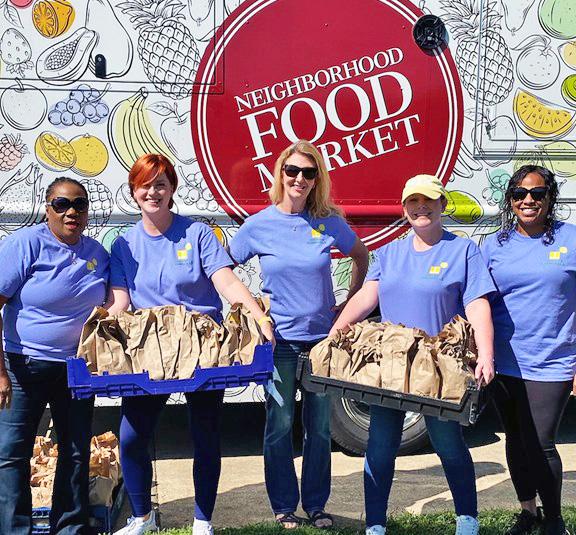
“I’ve seen firsthand what a difference this project has made in our community,” explained the mobile food market’s truck driver, Kami Richardson. “When I was growing up, we often couldn’t afford to keep food in the house. In our community, we have a 33-percent poverty rate. With this project, we help a demographic that is often overlooked – those who make too much to be on assistance but who still can’t afford the cost of living.”
According to the USDA, 40% of Vanderburgh County, Indiana (where Evansville is located) is in a food desert. The USDA defines a person in a food desert if they live more than one mile walk from a grocery store that offers fresh produce. The JLE, along with Evansville Food Oasis, hoped to alleviate their community’s food access problem by coming into food desert neighborhoods each Saturday and on select dates on a rotating basis. They provide free lunches for children, as well as selling fresh produce, meat, eggs, cheese, and non-perishable food items at a discounted or reduced rate.
Each weekend, JLE provides between 50-100 free lunches to their community, and encourages other community partners and nonprofits to collaborate and sign up to either make or pass out the lunches. During their Neighborhood Food Market, JLE also conducts educational crafts and lessons for the children in the community.
Learn more about The Junior League of Evansville work to reduce food insecurity in their community here: https://www. juniorleagueofevansville.org/neighborhood-food-market-clickhere-for-more-info
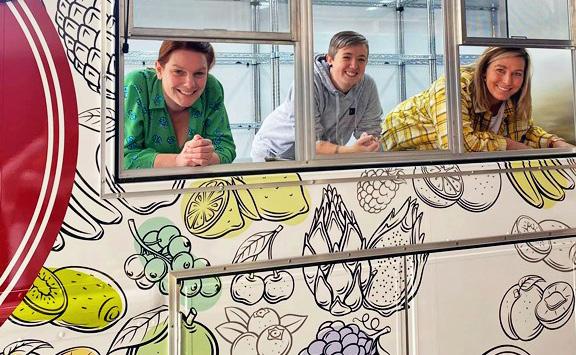
Each weekend, JLE provides between 50-100 free lunches to their community, and encourages other community partners and nonprofits to collaborate and sign up to either make or pass out the lunches.
On September 1, 1981, Junior League Member and Past President of the Junior League of Phoenix, Sandra Day O’Connor, was appointed to the United States Supreme Court – the first woman to serve as a U.S. Supreme Court Justice. In celebration of this barrier-breaking event in U.S. history, the Association of Junior Leagues International published a feature in the Junior League Review, with an interview and article recognizing Justice O’Connor’s achievements, including her dedication to the organization. At that time, her service to the League was described as “giving far more than her name to any organization she associat[ed] with. She [gave] her commitment.” Overall, her accomplishments were described as “legend.”
Over forty years later, we again acknowledge Justice O’Connor. On December 1, 2023, our country mourned the loss of this great civic leader. It is in the spirit of respect and remembrance that we reflect on the contributions and impact she made during her life of public service.
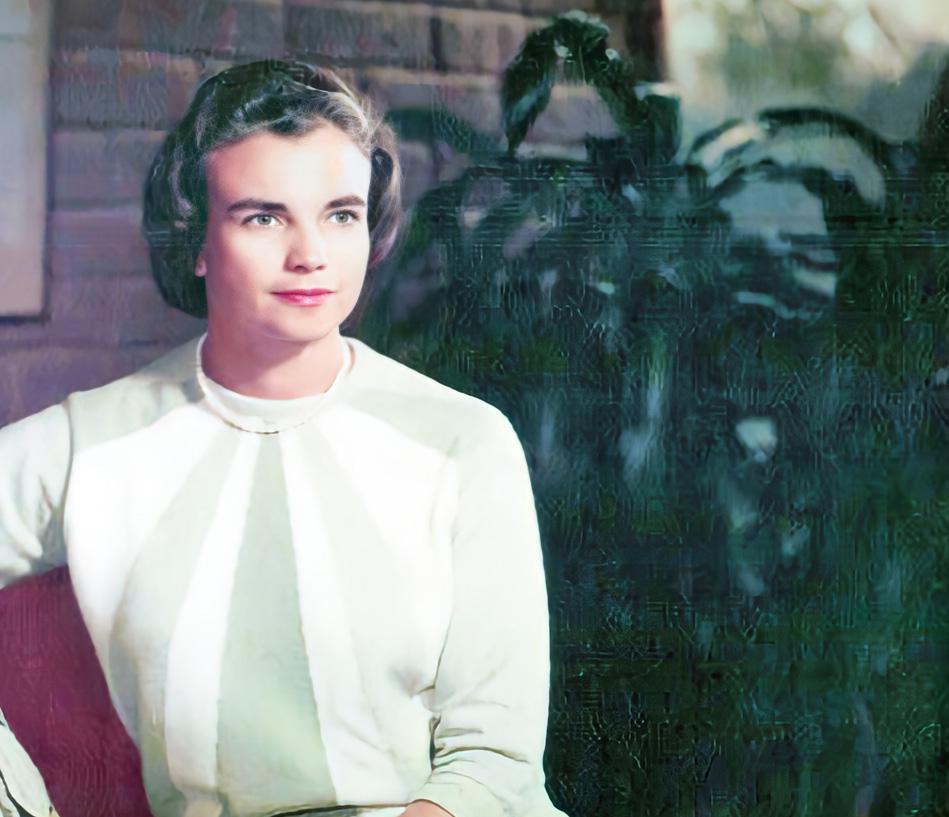
Born in El Paso, Texas, on March 26, 1930, Sandra Day grew up on the Lazy B Cattle Ranch – an almost 200,000-acre area straddling the border between southern Arizona and New Mexico. Isolated and thirty-five miles from the nearest town, Sandra and her family did not have running water or electricity until she reached the age of seven. At the age of six, Sandra was sent to live with her maternal grandmother in El Paso during the school year to begin her education. She excelled in her studies, skipping two grades, and attended Stanford University at the age of sixteen. After graduating in 1950 with a BA in economics, she earned her law degree from Stanford two years later.
While attending law school, Sandra Day met classmate William H. Rehnquist who would later become the Chief Justice during much of Justice O’Connor’s tenure on the High Court. During her final year of law school, she met and eventually married fellow law student John Jay O’Connor III.
Although she graduated near the top of her class from a prestigious law school, Sandra had difficulty finding employment as an attorney. In fact, after applying to one major law firm, she was only offered a secretarial position. With this difficulty of finding work as an attorney, Sandra Day O’Connor went to Germany with her husband, who had been drafted into the military. There, she worked as a civilian attorney with the Army’s Quartermaster Corps.
After spending three years in Germany, John and Sandra Day O’Connor returned to the States, settling in Maricopa County, Arizona, and had three sons. Upon her return, Sandra opened a part-time legal practice, but spent much of her time engaging in civic volunteerism and political engagement. In 1965, she returned to full-time work as an Assistant State Attorney General. Within a year of her employment, she served as the President of the Junior League of Phoenix from 1966-1967.
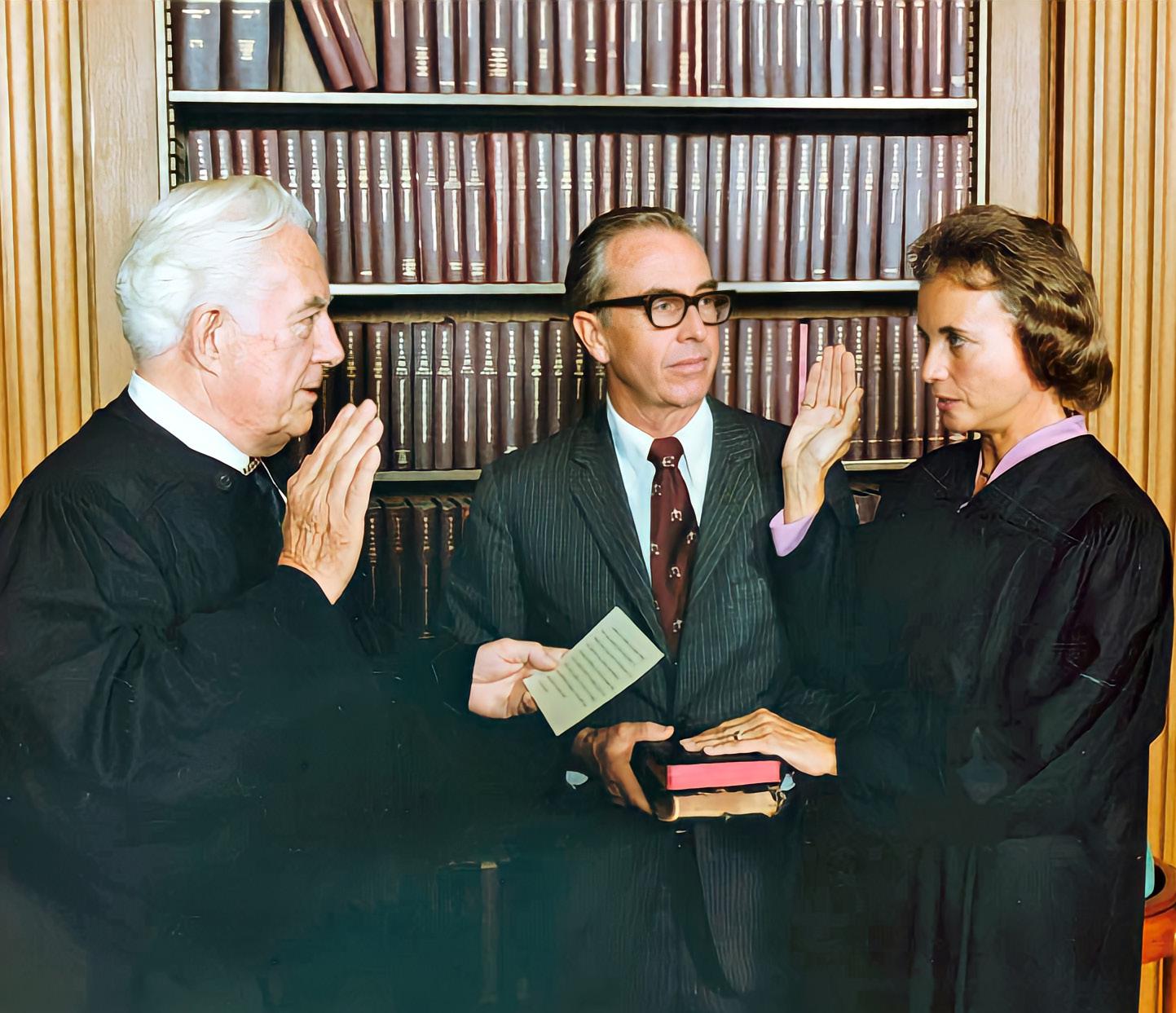
She was described by fellow Junior League Board Member and First Vice President, Patty Simmons, as “tireless” and “liv[ing] 38 hours out of every 24.” Sandra led by example, and from a position of growth and change, stating that The Junior League “must make a major effort to accommodate the business and professional lives of our youthful members and still provide opportunity for meaningful volunteer service to the nonprofessional members.” She noted that The Junior League gave her some of her first training towards voluntarism, including opportunities for public speaking, parliamentary procedure, and board membership.
Sandra Day O’Connor joined The Junior League for an opportunity to meet people in her community who also held interest in current community issues. She was passionate about issues that impacted society and understood the need for collective support in addressing those issues. In a 1982 interview with AJLI, Justice O’Connor stated there was “no other feeling more rewarding than helping someone who needed help.” The Junior League afforded her the opportunity to effect change on a larger scale by participating in group efforts with those who shared similar goals and aspirations.
She acknowledged that The Junior League should be tuned in to relevant issues and current events to maximize the opportunity for training and involvement. This passion certainly continued throughout her career, as she has been quoted saying, “Rare is the legal victory – in court or legislature – that is not a careful byproduct of an emerging social consensus.”
Not long after she served her term as the President of the Junior League of Phoenix, but prior to rising through the ranks of the judicial bench, Sandra Day O’Connor was appointed to the Arizona State Senate in 1969. She was reelected twice and ultimately became the first female majority leader of the Arizona Senate in 1972. She later served as judge for both the Maricopa County Superior Court and the Arizona State Court of Appeals.
On September 1, 1981, she was brought to the forefront of the nation’s attention as the United States Senate unanimously approved Sandra Day O’Connor’s nomination to the country’s highest court with a vote of 990. Four days later, Justice O’Connor took her oath of office and became not only the nation’s 102nd United States Supreme Court Justice, but also the nation’s first woman appointed to the Court.
1946
Attended Stanford University at age 16
1950
Graduated from Stanford University with a BA in economics
1952
Graduated from Stanford University with her law degree
1965
Became an Assistant State Attorney General
1966
Served as the President of the Junior League of Phoenix
1969
Appointed to the Arizona State Senate
1972
Became the first female majority leader of the Arizona Senate
1981
Became the nation’s 102nd United States Supreme Court Justice, and the first woman appointed to the role
2006
Retired from the Supreme Court
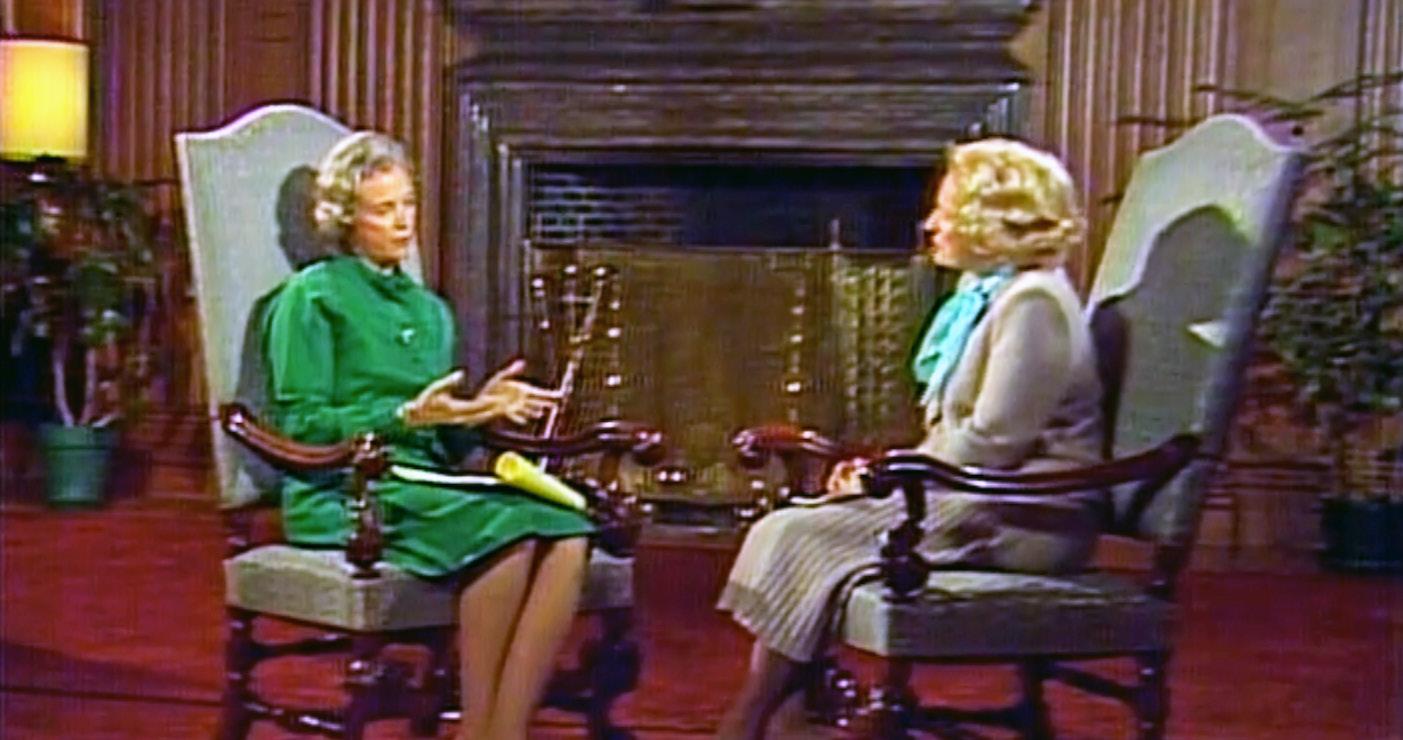

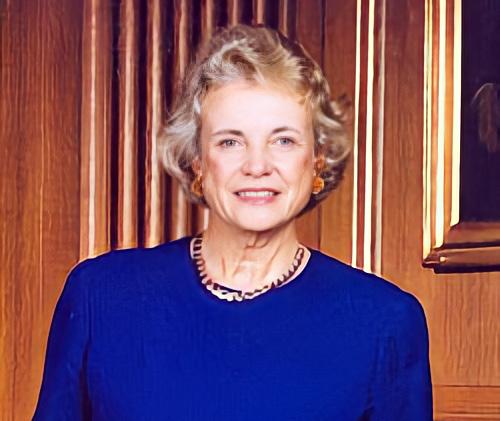
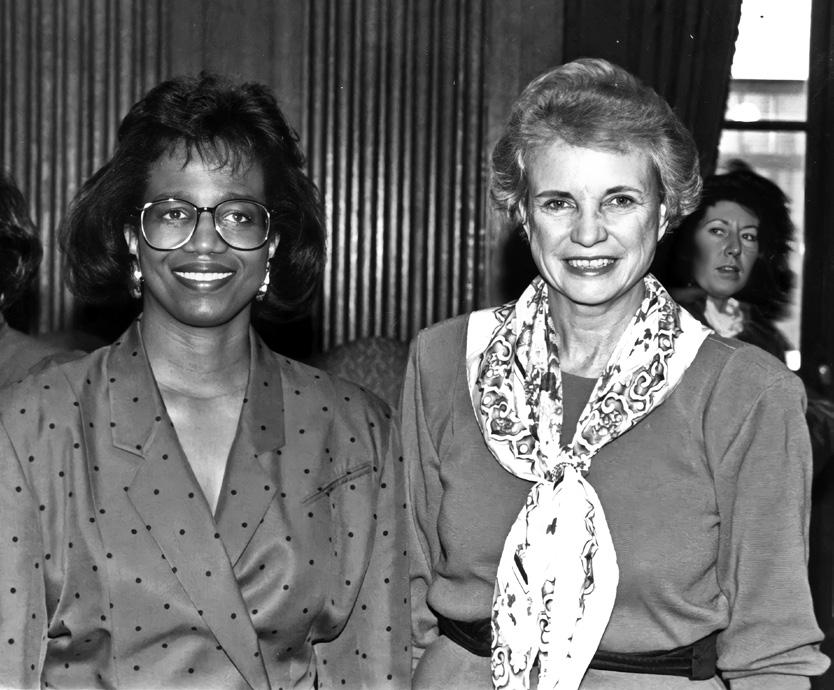
Justice O’Connor served as an Associate Justice for twenty four years before announcing her retirement. She was known to have a fierce presence on the bench and was often the first Justice to ask questions during oral argument sessions. She authored judicial opinions that still impact our country today. After retiring from the Supreme Court, she remained active, often serving as a visiting judge on federal appeals courts around the country. She also spent her time writing and speaking in support of judicial independence and civics education.
In her 1982 interview with AJLI, Justice O’Connor was asked where she would like to see The Junior League in the year 2082. She recognized that The Junior League, for more than a century, has been on the forefront of social reform, identifying problems and finding solutions in a collaborative way. She had this to say about the future:
“I would like to think that The Junior League will continue to grow and to have a capacity and flexibility for change – to meet the changing needs of the members and communities it serves. None of us can predict what conditions will be at that time and what you need is the capacity and willingness to change and adapt to changing conditions. If we can give our Members that training…capacity… desire and that willingness to change as changes outwardly occur, I think that Junior Leagues will be as strong then and as helpful as they are today.”
Throughout her life, Justice O’Connor showed incredible dedication to The Junior League Mission, both in her work with the League and her career. As Members of The Junior League, it is truly an honor to share this connection with her. Justice O’Connor’s bravery in accepting the call to be first in uncharted territory has made both a profound impact and helped pave the way for other women to follow. Her enduring legacy inspires future generations for years to come.
Image courtesy of The AJLI Digital Collections Image courtesy of AJLI's Photo Archives Image courtesy of The AJLI Digital Collections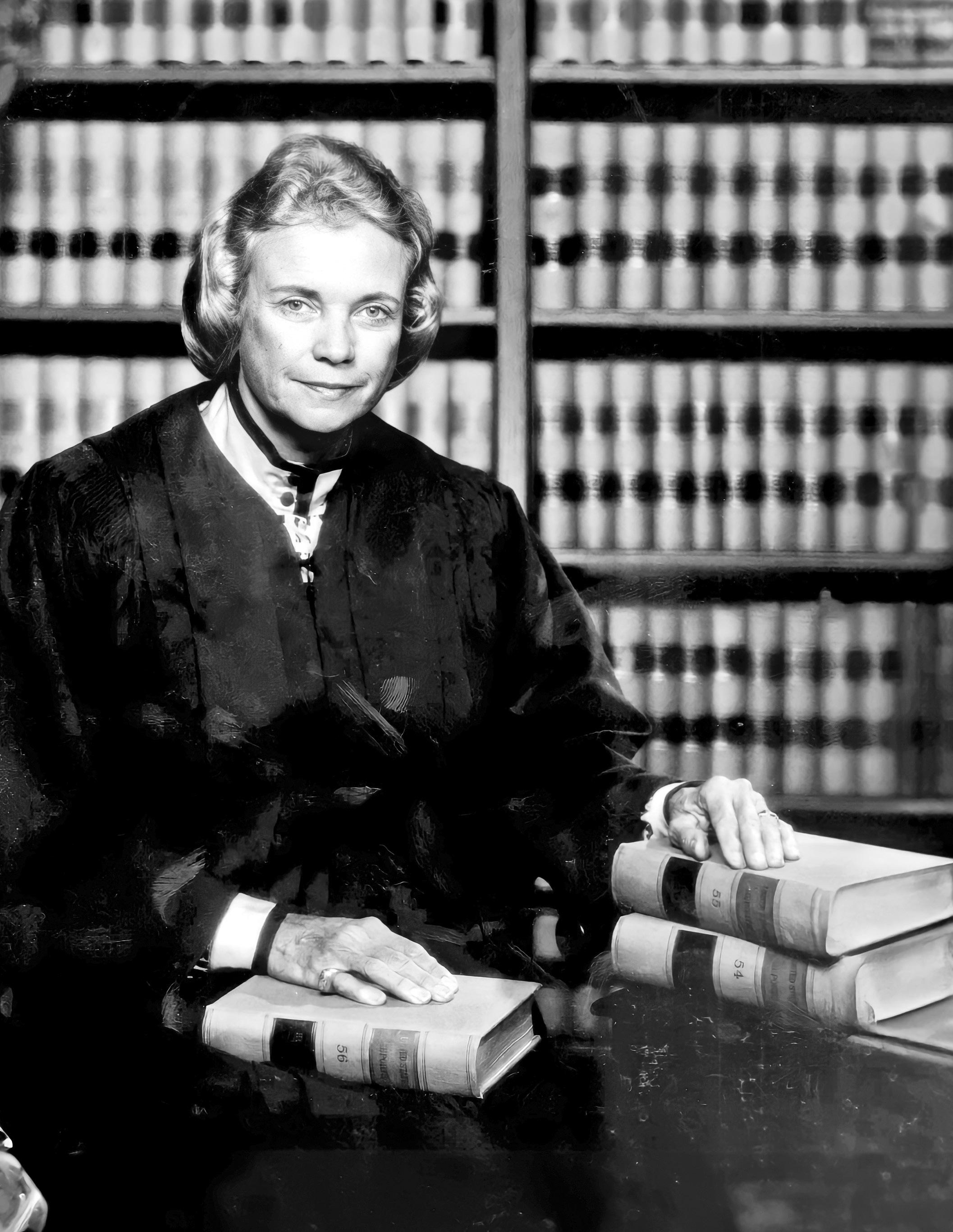
“I would like to think that The Junior League will continue to grow and to have a capacity and flexibility for change – to meet the changing needs of the members and communities it serves. None of us can predict what conditions will be at that time and what you need is the capacity and willingness to change and adapt to changing conditions. If we can give our Members that training…capacity…desire and that willingness to change as changes outwardly occur, I think that Junior Leagues will be as strong then and as helpful as they are today.”
- Sandra Day O’Connor, 1982Our 2023-2025 AJLI Treasurer, Gena Lovett, has been a Member of the Association for almost three decades. A longstanding Member of the first League, the Junior League of The City of New York, she takes a lot of pride in her experience, both in her League and on the Board of Directors. We sat down with Gena Lovett to get to know her a little better.
What is your Junior League story? How did you get started with the organization?
Well, I was born and raised in Little Rock, AR, and I remember looking at the Arkansas Gazette, which was like our New York Times. They had a section of all the social things that would be going on in Little Rock, and I remember seeing articles about the things The Junior League was doing in the community and the main thing I remember, the thing that stuck out for me, was how everyone was always smiling. They looked so happy to be a part of the organization and to give back to the community. So even back then, I thought to myself ‘I want to be a part of that.’
In 1995, after I moved to New York City, the wife of my boss at the time was a part of The Junior League in New York City. So I met up with her and told her flat out, “I want to join the League,” and she looked back at me and said, “Alright, let’s get you in!” The rest is history. I’ve never been a part of any other League and honestly, I don’t think I ever will be. I just love my League so much.
What is it about the Junior League of The City of New York that makes it so special?
Besides being the first League, I think that being a part of an organization that has such rich history and knowing that there was a woman over 100 years ago who looked at the needs of her community and wanted to help fill those needs while also helping develop women at the same time, and now looking back and seeing the over 100,000 Members strong – it makes me feel like I’m a part of history and that I’m making a difference as well.
What do you think is the thing that sets Junior Leagues apart from other women’s organizations?
We have the Junior League of The City of New York and the Junior League of Little Rock, AK, and everyone is doing their own thing, but we come together as this larger organization – we’re a collective. Because of the diversity that comes with 295+ Leagues, each community is different, and each League’s experience is going to be different. But we all have something very precious in common, which is we are all volunteers improving peoples’ lives. There are a lot of things our city, state, and federal government cannot do. When that happens, we as Leagues can pick it up and move it forward because of our collective action. And while we’re helping our communities, we’re all developing our leadership skills, whether through AJLI training or hands-on experience, or what we pick up from our peers. It’s a beneficial experience for all involved.
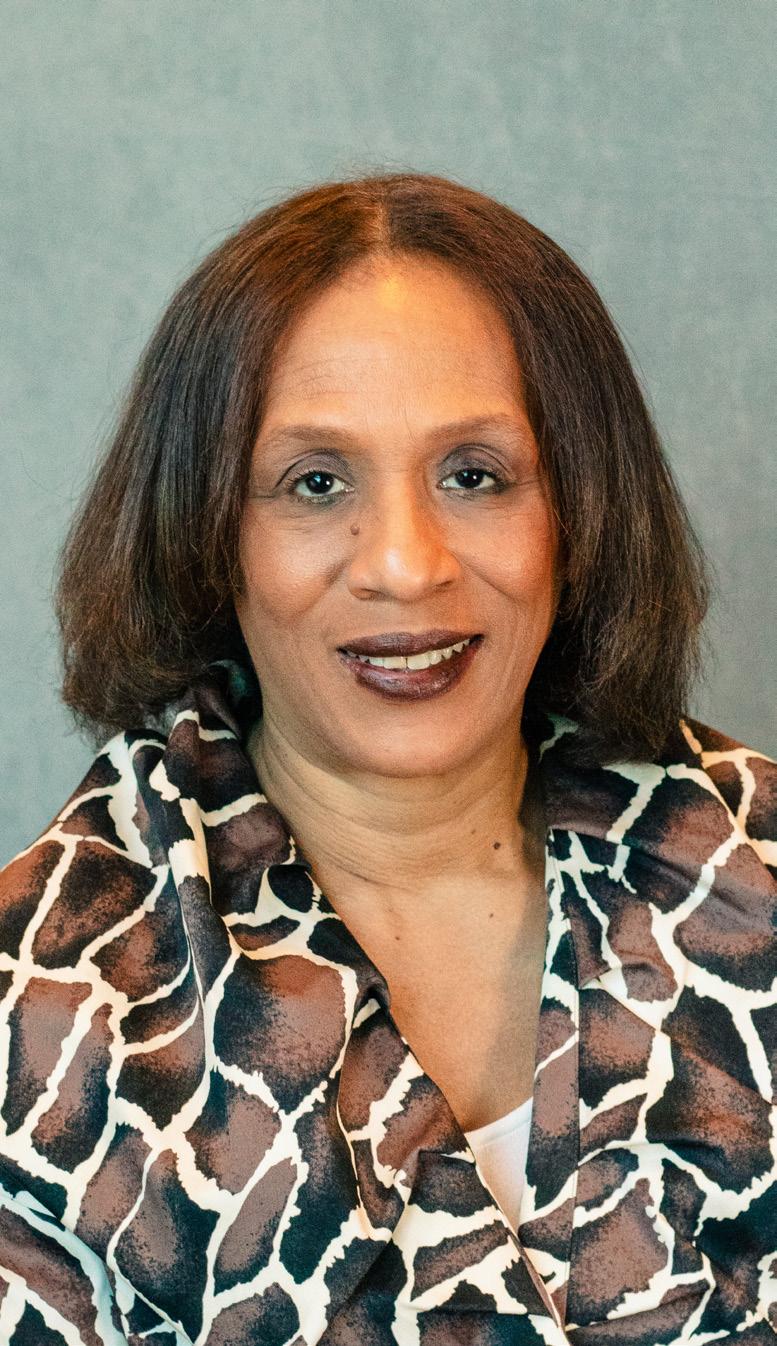
I think that being a part of an organization that has such rich history and knowing that there was a woman over 100 years ago who looked at the needs of her community and wanted to help fill those needs while also helping develop women at the same time, and now looking back and seeing the over 100,000 Members strong – it makes me feel like I’m a part of history and that I’m making a difference as well.
You’ve been with The Junior League for nearly 30 years now. The Junior League that you joined is different than The Junior League of today and different from The Junior League when it was first founded. Where do you see the future of the League?
Well, I always like to kind of make a joke about this – what’s the difference between yesteryear and today? Well, the dresses got shorter.
But in all seriousness, there are a lot of different generations involved in Junior Leagues, from baby boomers to Gen Xers to millennials, and even now a few Gen Zers as well. They all bring something different to the table. While out in the world there are these generation wars, inside the Leagues we should be working together to move the organization forward. Politics have recently had a tendency to shake up day-to-day work in our Leagues, but we are, at our core, a nonpartisan organization. When you see the political dynamic in this country going haywire, we should be holding steadfast where we are rooted and stay focused on our Mission – developing the leadership potential of women. We can be addressing the needs of our communities and also focusing on our Mission by addressing the barriers to leadership for women. These barriers include lack of training, sexism in the workplace, family and caregiver responsibilities, and more. I expect this is where we will be putting more of our focus in the future to keep Junior Leagues moving in the right direction.
You’ve now served in leadership positions at both the League level and the Association level. What do you think is the importance of being in the driver’s seat of the Association, and how do you think it affects your experience in The Junior League?
I think that having been a President of the Junior League of The City of New York and now being on the Association Board as the Treasurer, it gives me an opportunity not only to work with women from other Leagues, but also other women from other professions. And then I have been able to take what our everyday work is at our Junior League and bring that back to the Association level and look at how we can, as an Association, help our Junior Leagues to move the Mission forward by supporting them and their needs. It’s important to make sure they’re not worrying about things that we can provide for them, such as training modules, conferences, ways to help them as individuals to help their communities, etc. Right now we are so excited with our new CEO, Melanie Schild. She has really looked at the dynamic, and landscape of Junior Leagues, and being a League Member herself, has brought that experience forward to expand on what we do to offer more services to our League Members. I’m excited to work alongside her to help make this version of the Association the best it can be!
What is one thing you want to say to all Members starting out in their Junior Leagues?
While it’s important to think about what The Junior League can give to you, it’s also about what we give to The Junior League. You will get out what you put in.
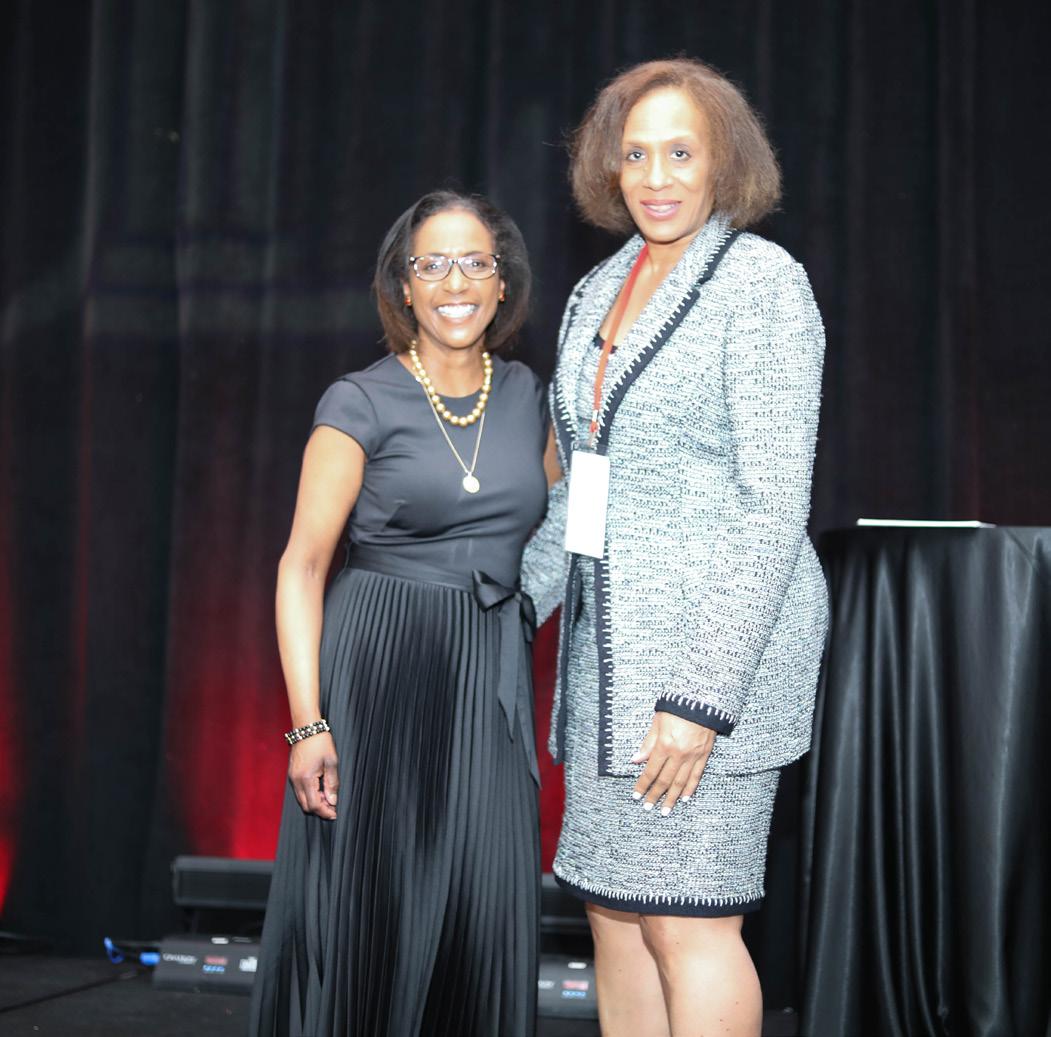
"While it’s important to think about what The Junior League can give to you, it’s also about what we give to The Junior League. You will get out what you put in."
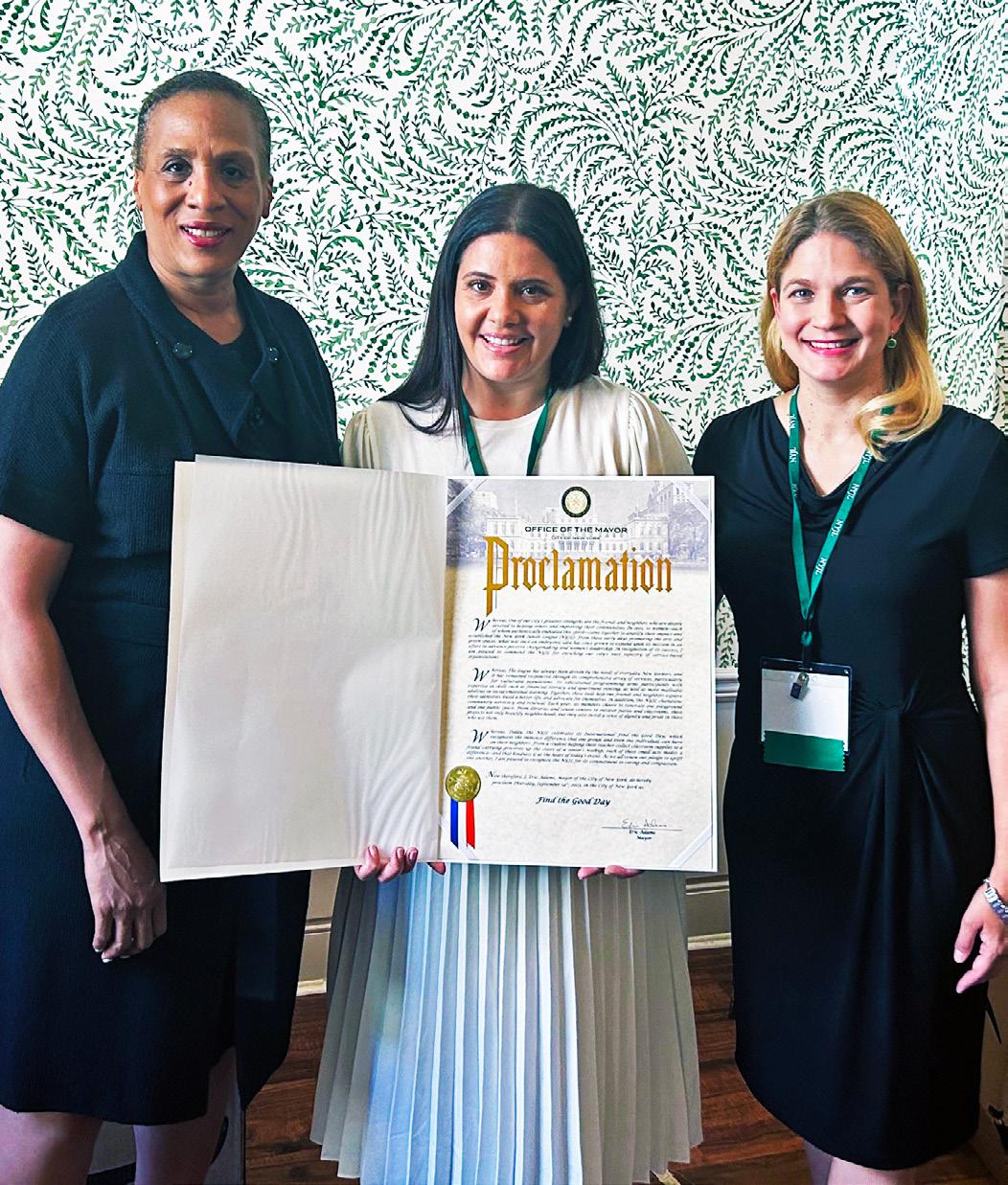 Image courtesy of Erika Cain
Image courtesy of Erika Cain
Read about the accomplishments of Junior Leagues from across the Association!
Information provided by Casey Ardoin, Communications Vice President of the Junior League of Lafayette
The Junior League of Lafayette began in 1957 after 17 civic-minded women organized with a mission to effect positive change in their community. These charter Members established the Service League of Lafayette, which had 48 Members within the first year.
By 1958, Service League Members, clad in their signature pale yellow dresses, began pursuing their goals by coupling hands-on voluntarism with creative fundraising. In 1974, the Service League of Lafayette was admitted into the Association and officially became the Junior League of Lafayette.
Now, more than 65 years after first organizing in their community, the League’s membership has grown to nearly 600 women from diverse backgrounds, and they’re proud to continue the spirit of voluntarism and community service their founders started!
The projects and initiatives of the Junior League of Lafayette center on these focus areas and strategies women’s leadership,, the health and development of women and children, and collaboration for lasting community change. Some highlights of the League’s work include:
• Women's Leadership: The Spark Teen Board program gives 12 high school junior and senior girls an opportunity to learn hands-on leadership skills. The program sparks a culture of volunteer action and leadership in young women.
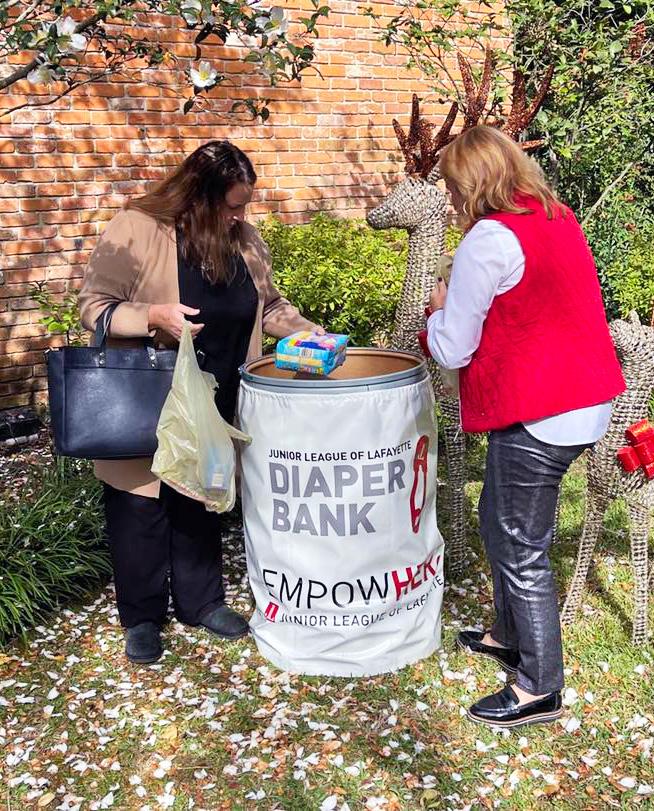
Additionally, each year several participants are selected to serve as representatives on boards of other nonprofit organizations.
• Health & Development of Women and Children: The League’s Health Essential Resources (HER) committee is made up of three subcommittees: Diaper Bank, EmpowHER., and Happy Wheels. Every Diaper Bank diaper, EmpowHER. period supply, and essential item from the Happy Wheels hospitality cart impacts the lives of women and children, providing tangible resources during a time of need.
• Collaboration for Lasting Community Change: One of the most important ways the League contributes to lasting community change is through its Collaborative Opportunity Grants. The League provides monetary grants and hundreds of volunteer hours to 1015 nonprofits each year. Each nonprofit can receive up to $2,000 for a shortterm community project. However, the League doesn’t just provide financial support – one of the grant stipulations is that League Members contribute hands-on volunteer hours to help finish the projects.
For their 65th Anniversary, the Junior League of Lafayette was honored to donate $65,000 towards a Ronald McDonald Family Room at Our Lady of Lourdes Women’s & Children’s Hospital. Located on the first floor of the hospital, the Ronald McDonald Family Room provides a place for families to rest and regroup while their children receive treatment.
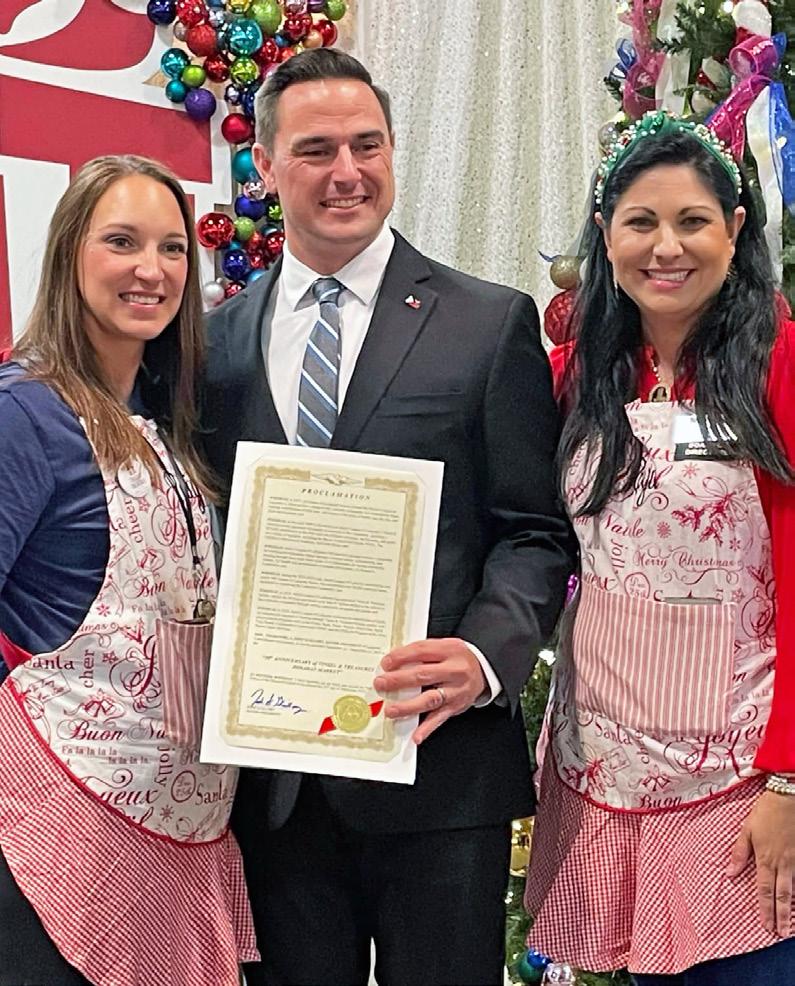
In addition, Parish Proud, a nonprofit focused on community beautification, reached out to the League for help putting on their biggest cleanup event. They received an overwhelming amount of volunteer signups and didn’t have the resources to effectively onboard all the help. The Junior League of Lafayette stepped up to help organize more than 800 community volunteers, providing a smooth start to a great day of bettering their community – together.
One challenge that the Junior League of Lafayette recently experienced was one many of our Leagues will find familiar –maintaining Member engagement in the years following COVID-19.
During the past two years, they decided to make Member engagement a top priority. They re-evaluated programs and placements to make sure they meet their community’s needs AND were accessible and attractive to Members. They rolled out Commitment Cards, where Members could track League events and volunteer opportunities throughout the year (if they participate in most of them, they’re entered to win a prize). They brought back more opportunities for Membership Development training, such as learning to create graphics in Canva and new Committee Chair training. They invested time and funds into making sure that League Members know that they are the reason the League accomplishes what it does each year. These efforts have been very successful, as the Junior League of Lafayette has seen an uptick in Member engagement and this year welcomed one of their biggest incoming Provisional classes.
Image courtesy of The Junior League of LafayetteInformation provided by Jessica Naman, President of the Junior League of Toronto
Since 1926, the Junior League of Toronto has served the Greater Toronto Area with its Mission of advancing women’s leadership for meaningful community impact through volunteer action, collaboration, and training.
With 265 members, the League aims to create a lasting, meaningful impact in the area of mental health and to help improve self-esteem in youth through its focus on Healthy Bodies/Healthy Minds.
The League is actively strengthening its connections with the Toronto community, with partners, and collaborating with other like-minded organizations to confront the challenges they collectively face in the areas of Mental Health, Human Sex Trafficking (HST), and Food Insecurity. Members are steadfast in their commitment to their community and to the projects they serve, all through a Diversity, Equity, Inclusion & Belonging (DEI&B) lens.
The Junior League of Toronto recently provided a Seed Grant to The 482 Collective, an organization that supports women, children, and gender-diverse people who have fled gender-based violence, including human trafficking, intimate partner violence, sexual assault, and physical/ emotional abuse. The program, “Fully Equipped,” is a kitchen essentials program designed to address the needs of people who, after fleeing domestic violence or human trafficking, have moved into government housing with completely empty kitchens. The Seed Grant funding will support the purchase of kitchen tools for up to 60 families.
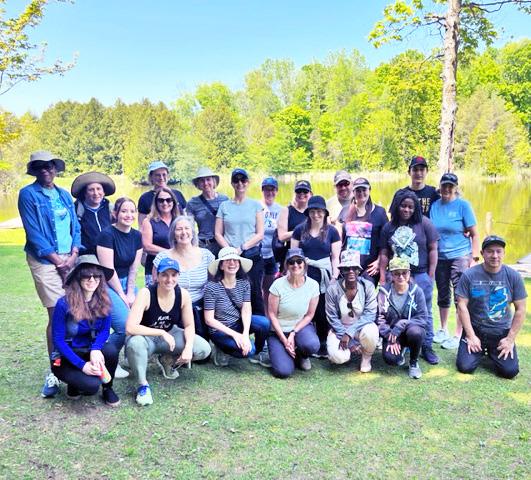
They also intend to continue working together through JLT-planned Community Impact Events and other funding opportunities.
Some of the League’s other important community initiatives and fundraising include:
• Providing funding and programming (yoga, art, music, healthy snacks) to the Centre for Addiction and Mental Health (CAMH) Early Psychosis Unit through JLT’s long-standing partnership with their Gifts of Light program. Each year The Junior League also sends over 500 holiday cards of well wishes to help spread cheer, community, and hope to individuals receiving treatment over the holiday season.
• Hands-on volunteering at the Trails Youth Initiative. Member volunteers cut logs, pick up brush, prepare the beach, stain picnic benches, and clean out cabins to get them ready for the summer program. The Trails Youth Initiative provides lifelong, consistent programming for vulnerable youth. Their mission is to challenge and equip vulnerable youth from at-risk areas to become contributing members of the community.
• H A Community Impact Event with Hand Up Toronto, where the League delivered hampers with nutritious food, resources, and necessities to families in need in the Toronto community – reaching 200 families in one day.
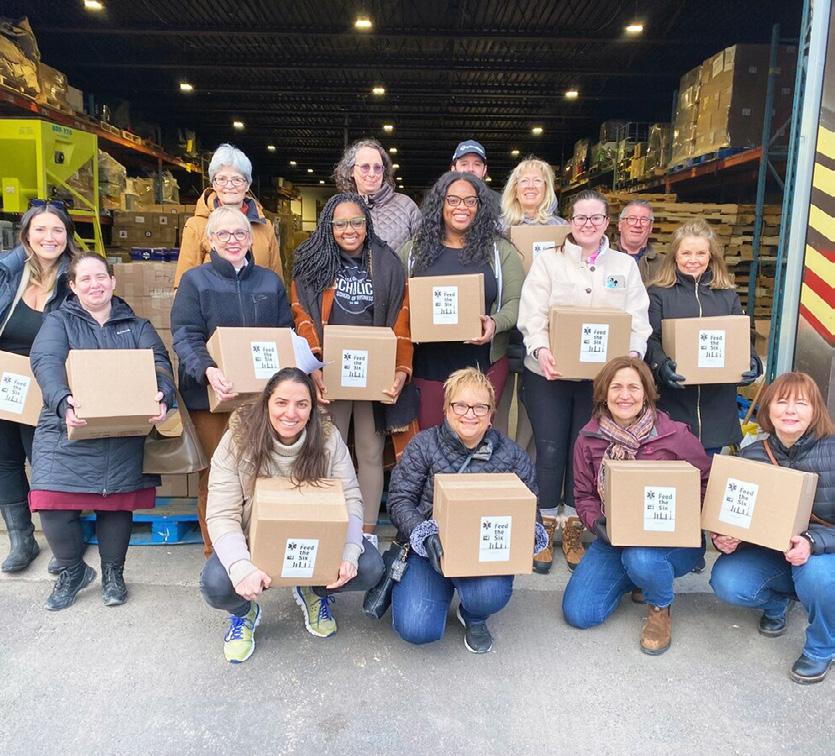
• Working with community volunteers to help Flemingdon Park Ministry prepare their community garden for spring planting. Flemingdon Park Ministry was a recipient of a JLT Seed Grant in 2022. Its work focuses on building community through compassionate service and care.
• A long-standing commitment to Youth Without Shelter – an emergency residence and referral agency serving homeless youth in which JLT Members provide and serve nutritious and fun themed meals, including one of the youths’ favorites, “Brunch in Paris” with hot chocolate, croissants, and egg croquettes.
• On April 25 th , 2024, the League is hosting its annual fundraiser – The JLT Chef’s Showcase, which raised $35,500 last year and will support the JLT scholarship for students in George Brown College’s ACET program. This is a free, supported education program for individuals who identify mental health and/or addiction challenges as a barrier to education and employment. The Junior League of Toronto absolutely feels it is important to have a Junior League presence outside of the United States. Communities across the world need support from trained volunteers, and the League has been actively involved in serving the Toronto community for almost 100 years. The League is looking forward to celebrating its centennial in 2026!
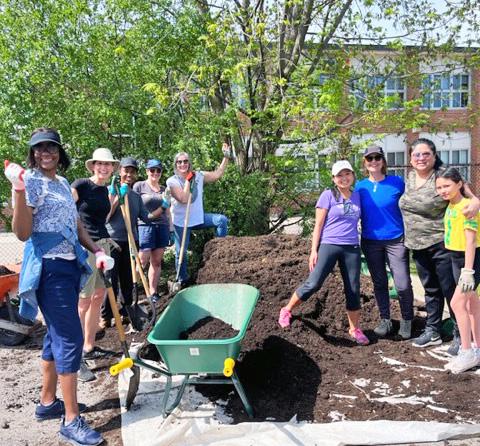 Image courtesy of The Junior League of Toronto
Image courtesy of The Junior League of Toronto
Image courtesy of The Junior League of Toronto
Image courtesy of The Junior League of Toronto
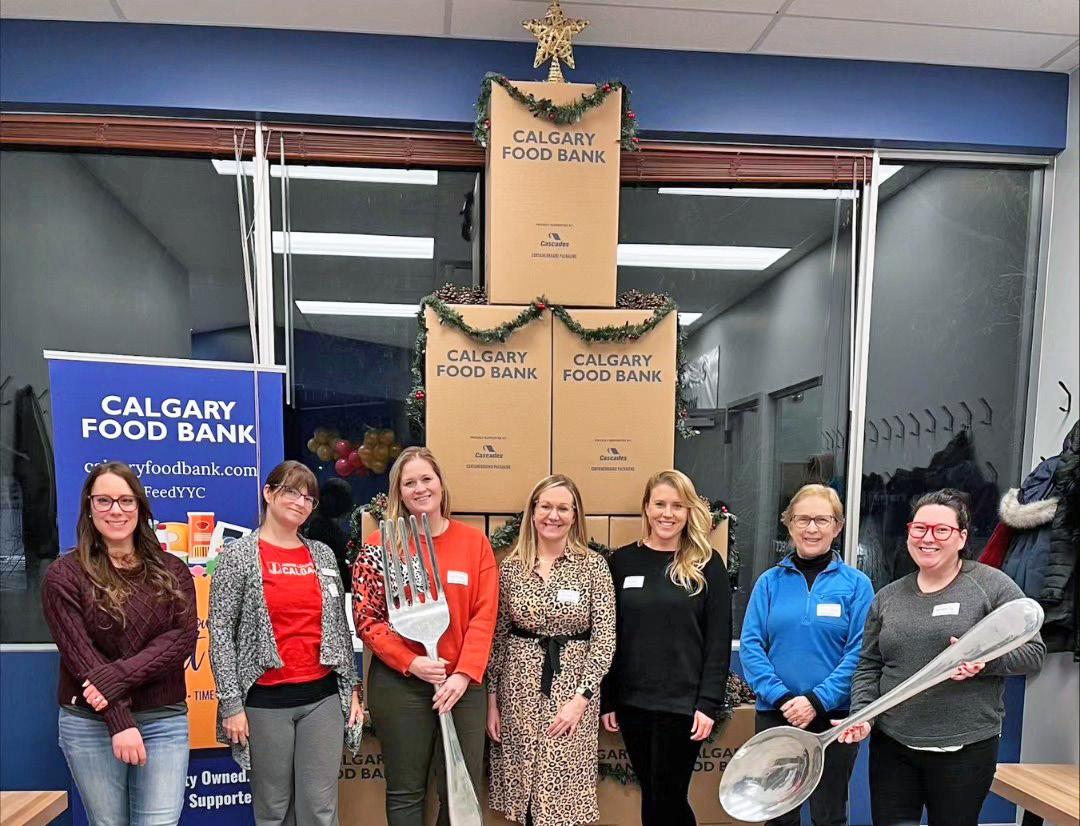
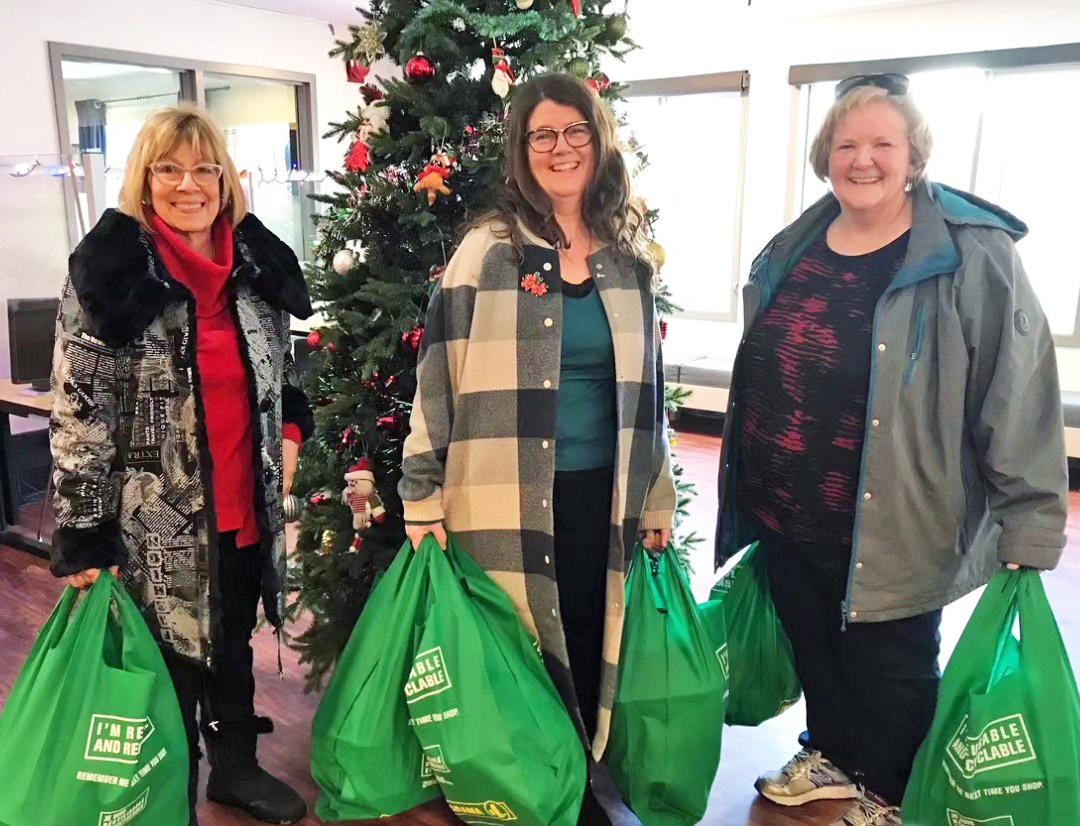
Since 1950, the JLC has provided more than 1,780,382 volunteer hours and more than $3,139,442 to address unmet critical needs in Calgary. It has been instrumental in the creation and sustainability of many Calgary-based organizations, including Calgary Reads, the Calgary Boys and Girls Club, and Propellus (formerly Volunteer Calgary).
Information provided
by Danielle Vlemmiks, President of the Junior League of CalgaryFounded in 1950, the Junior League of Calgary (JLC) strives to be inclusive to all women who demonstrate an interest in and commitment to voluntarism. JLC members come from a variety of backgrounds and nationalities and range in age from 20+ to 90+.
They are a small but mighty League. Although they have 17 Active Members, 5 Active Sustaining Members, and 126 Sustaining Members, these women are dedicated to building lasting community connections while developing leadership skills and continue to make an impact in their communities.
As advancing women’s leadership is central to the League’s Mission, each Member works to develop skills that are invaluable to both the JLC and to the community, both through hands-on experience and internal and external training opportunities.
The JLC strives to improve the Calgary community through the work of its trained volunteers and financial resources that support community programs in their issue area of youth at risk. Its issue-based approach to community programming ensures it can make a sustainable and measurable impact, supporting at-risk youth via the League’s community programs on effective parenting skills, life skills, nutritional health and wellness skills, and literacy.
Every Christmas, the League delivers Teen Totes, backpacks filled with warm clothes, gift cards and hygiene staples. This Christmas they sent over 100 backpacks to The Alex, a non-profit health and social services organization that provides outreach services for people experiencing poverty, trauma, social isolation, or health challenges including addiction.
The JLC currently provides direct volunteer hours in its community, has built capacity for effective volunteering, and has advocated for community issues.
Since 1950, the JLC has provided more than 1,780,382 volunteer hours and more than $3,139,442 to address unmet critical needs in Calgary. It has been instrumental in the creation and sustainability of many Calgarybased organizations, including Calgary Reads, the Calgary Boys and Girls Club, and Propellus (formerly Volunteer Calgary).
The Junior League of Calgary believes The Junior League, like many historical organizations, is facing an inflection point. All Leagues have an opportunity to be part of a future that supports women in their leadership journeys but need to acknowledge and adapt to the changing demands of society on the women we want to attract and retain.
We are competing for time and attention among the demands of careers, families, and other priorities. Future success lies in our ability to be agile, responsive, and have a willingness to try new things—even if unsure of the outcome.
Information provided by
Faye Tillery,President of the Junior League of Nairobi
The first Junior League in Africa, the Junior League of Nairobi started the affiliation process in 2020 and officially became a Junior League in 2023. They are ecstatic to share that they currently have 18 Members.
The League’s initiatives focus on two projects:
Toto Care Box: by partnering with this organization, the Junior League of Nairobi aims to address a critical issue in Kenya, where 30,000 babies lose their lives annually due to the absence of hygiene equipment. The purpose of the program is to reduce this staggering number by supporting expecting mothers with essential items and knowledge throughout their pregnancy and delivery.
I Can Fly International School Partnership: The Junior League of Nairobi is collaborating with I Can Fly International School, specifically their girls' school catering to victims of various forms of violence, including female genital mutilation and child marriage. Beyond mentorship, they extend their support by providing necessary donations to fulfill the school's needs, empowering these resilient girls on their path to recovery and education.
During its "Find the Good Day" fundraising event for the Toto Care Box project, the League went above and beyond. Each woman in attendance was invited to share a personal need, and if someone could meet that need, they were encouraged to step forward. What started as an initiative to benefit the Nairobi community evolved into a powerful movement of solidarity for League Members.
Establishing the first Junior League in Africa was driven by a deep-rooted passion to address enduring issues in Kenya. The League is now working diligently to confront the overwhelming array of issues demanding attention in Kenya. The League has narrowed its focus, selecting areas where Members believe their efforts could yield the greatest impact. By homing in on specific issues, they aim to steadily and significantly contribute to the betterment of their community over time. The impact of the League extends far beyond its borders.
They’ve become a symbol of progress and change for other Junior Leagues. When they interact with Members from different Leagues, it's evident that their presence means something different – it's a symbol of change in a positive direction, transforming the Junior League into a truly international force for positive transformation.
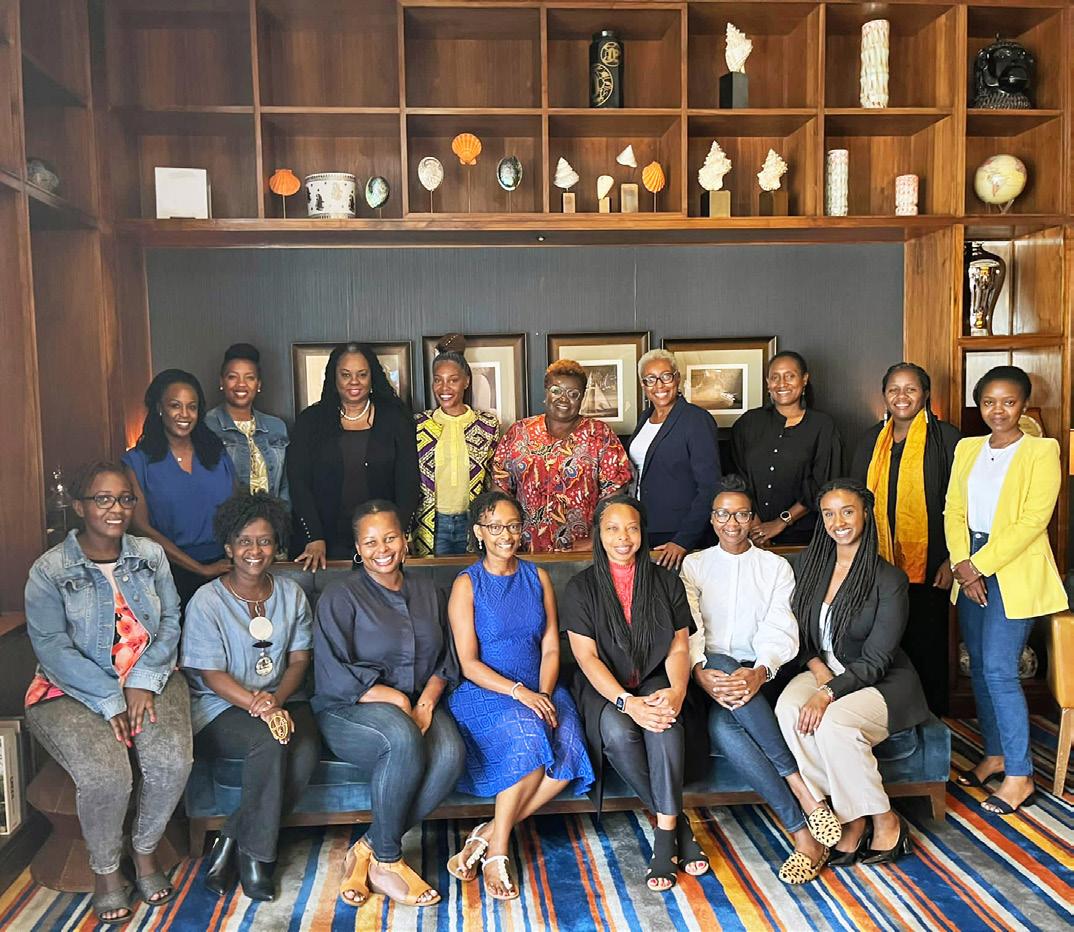
The League’s journey is not just about the local community but about contributing to a worldwide movement.
What distinguishes the Junior League of Nairobi’s experience versus a League in Europe or North America is in the context of the challenges they address. While the essence of community service unites them, the League confronts unique issues specific to the region, necessitating tailored solutions. Their experience reflects a dynamic interplay of cultural, social, and economic factors, shaping a distinct but equally impactful journey compared to our counterparts in the Association.
The Junior League of Nairobi is committed to fostering a culture of collaboration and mutual support within the League. They invite all fellow Junior Leaguers to visit Kenya, learn more about their League's initiatives and community impact, and experience the beauty of their country. They are currently organizing a group trip for their fellow Junior Leaguers to visit and enjoy this remarkable destination and look forward to welcoming them soon.
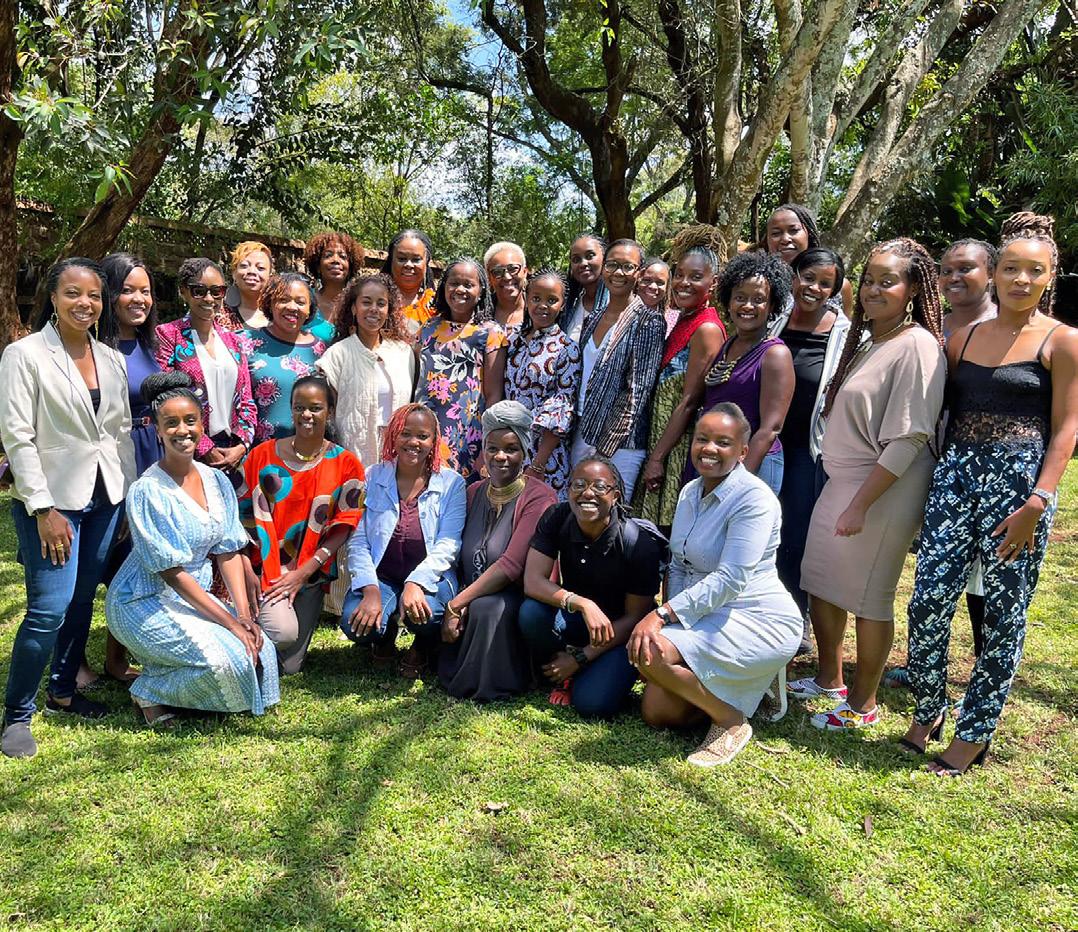
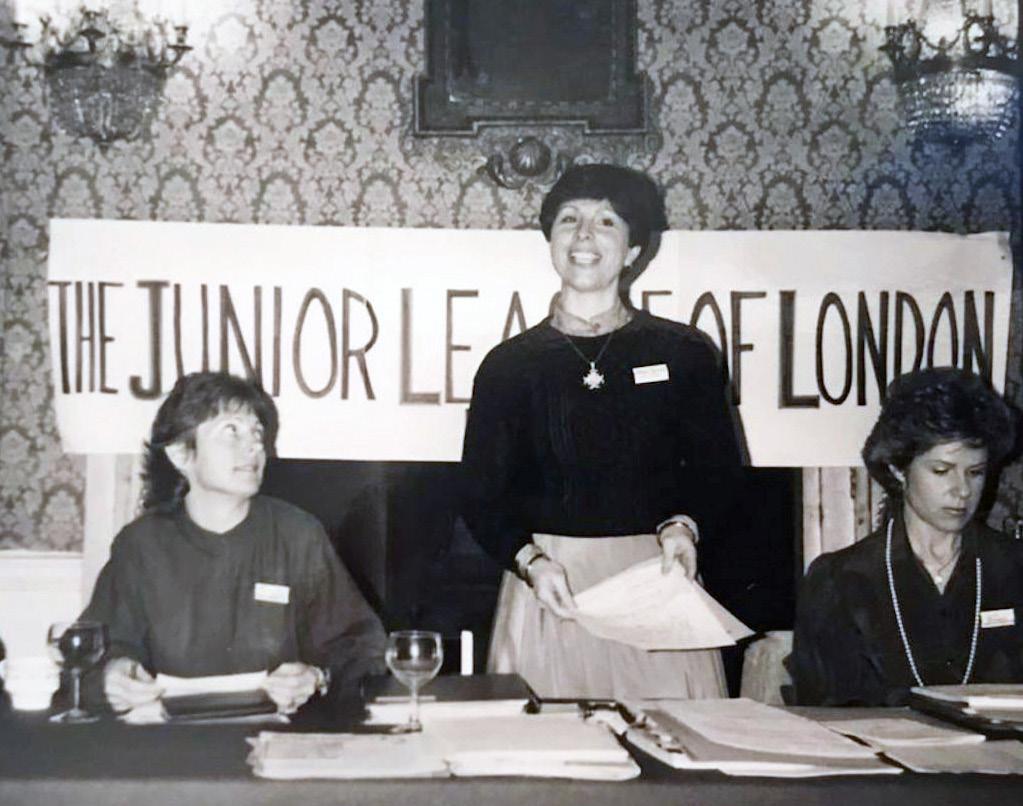
Information provided by Kimberly Burton, Communications Vice President of the Junior League of London
The Junior League of London was founded as the London Service League in 1978 and joined the Association in 1985. This action was honored by Prime Minister Margaret Thatcher.
Over their more than 35-year history in London, the JLL has delivered hundreds of thousands of hours of community service and contributed more than three million pounds towards volunteer training initiatives and direct support for the London community. The League has been honored by multiple prime ministers and the Queen for its voluntary service.
Historically, the League has hosted events like Boutique de Noel (which raised more than three million pounds over four decades), published the Living in London Guide (which is now in its twelfth edition and can still be purchased on Amazon), and ran a successful charity grants program (providing over 150,000 pounds of funds to charities in need). The JLL was the first Junior League to have a website and founded the Little Black Dress Initiative as a fundraiser!
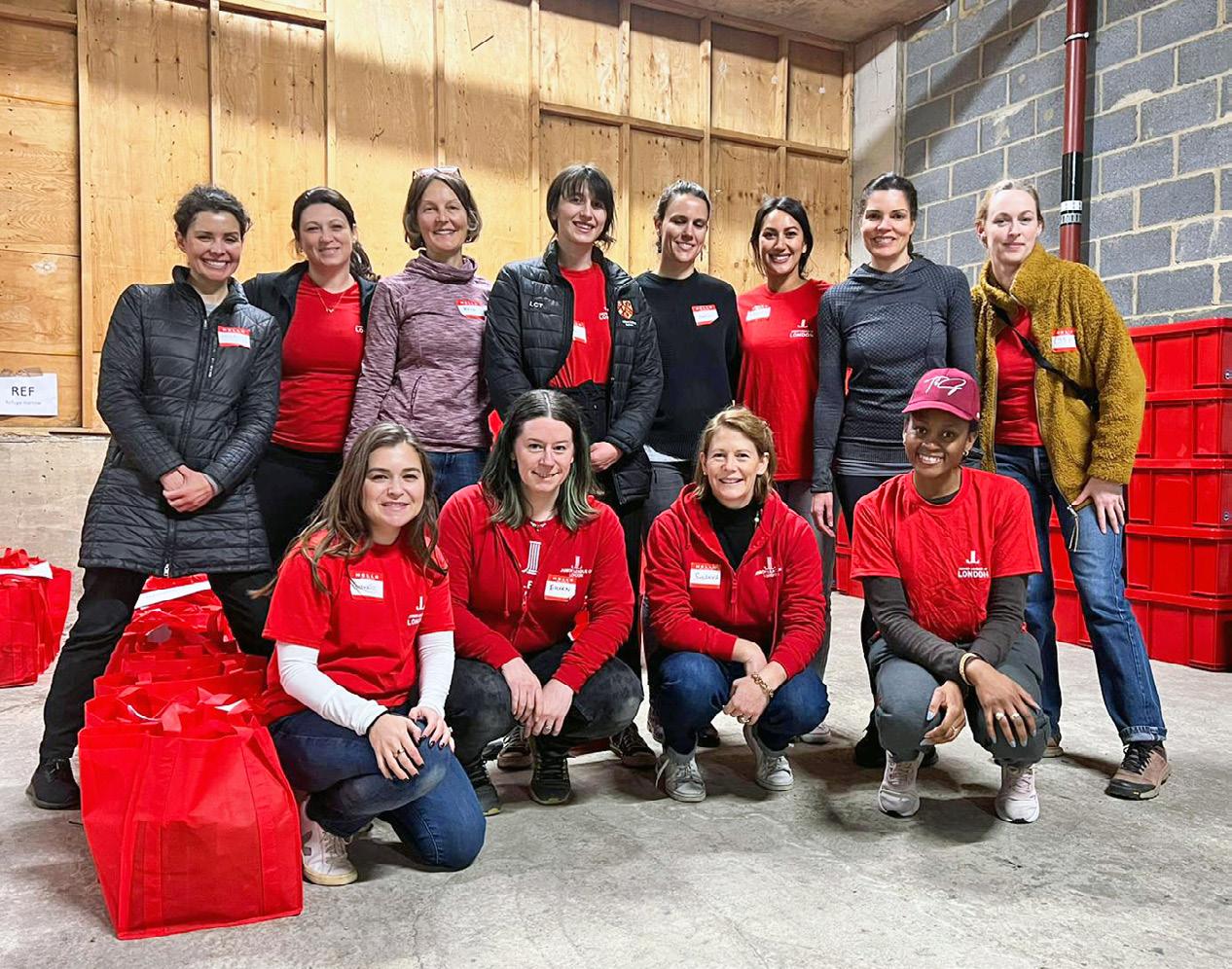
With over 200 Active and Sustaining Members from across the US and world, JLL is a fixture in the London landscape. The current focus of the League is alleviating poverty in London, and it has approximately 20 community partners for which it provides trained volunteers, in addition to other in-kind donations and services.
The League has delivered its signature Holiday Hampers program annually for over 25 years. Holiday Hampers provides holiday gift boxes and bags full of canned goods, books, toys, toiletries, and other food stuffs to families and elderly individuals in need. In 2023, the program impacted over 1,500 Londoners. Many of these individuals are in multi-generation families, are migrants/refugees, and/or include single mother households. The iconic red bins and bags used are a telltale sign of Junior League involvement, and assembly of these packages between Thanksgiving and the start of Christmas season is one of the League’s most popular events.
JLL also founded the Little Black Dress Initiative (LBDI) in 2014 around London Fashion Week and recently revamped the program in the League for the more modern Member.
JLL believes that having Leagues in countries outside of North America shows that The Junior League is not an organization only for North American women, but a worldwide organization full of global citizens.
Global representation is needed to ensure we are doing work that is meaningful in our local communities, and our world. The League welcomes all global Leagues, as they are a great support system for expatriate women and locals alike. Junior Leagues foster amazing networks, friendships and support systems for women of all backgrounds. It’s cross-cultural collaboration, and a way to make an impact no matter where your job, life, or family takes you.
In the JLL, all Members (Sustainers, New Members and Actives) have the right to vote on League matters, and Sustainers are eligible to hold leadership positions. In fact, most Board of Trustees members and leaders are Sustainers. In addition, JLL has Members who not only transfer in from Junior Leagues across North America, but they also have women who discover them when they move to London from the US or Europe.
If you would like to have your League featured in an upcoming League Spotlights feature, please submit your information here.
Join us in celebrating Leagues with Milestone Anniversaries this year!
110 YEARS (1914)
Detroit, MI
Kansas City, MO
St. Louis, MO
105 YEARS (1919)
Buffalo, NY
Denver, CO
Omaha, NE
Poughkeepsie, NY
100 YEARS (1924)
Colorado Springs, CO
Evanston-North Shore, IL
Jacksonville, FL
Lancaster, PA
Lexington, KY
Minneapolis, MN
New Orleans, LA
Reading, PA
San Antonio, TX
Seattle, WA
75 YEARS (1949)
Galveston County, TX
Wyandotte & Johnson Counties, KS
50 YEARS (1974)
Lafayette, LA
Greater Lakeland, FL
Owensboro, KY
25 YEARS (1999)
Greater Covington, LA Northwest Arkansas
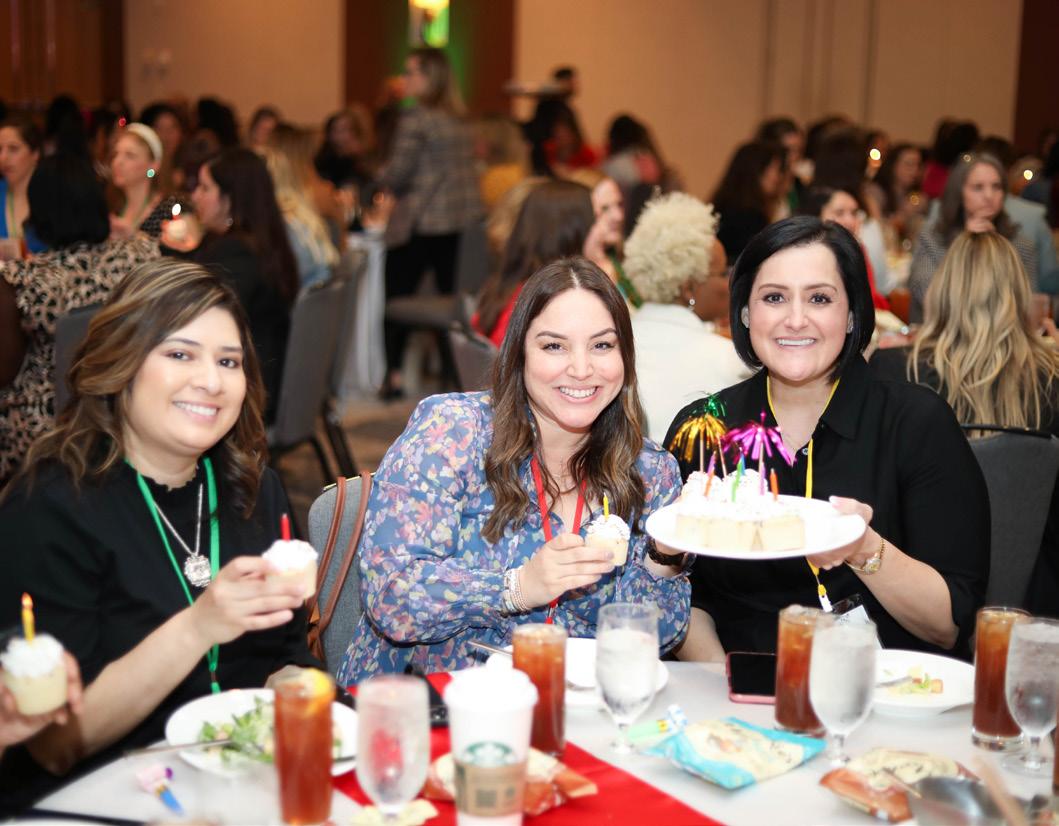
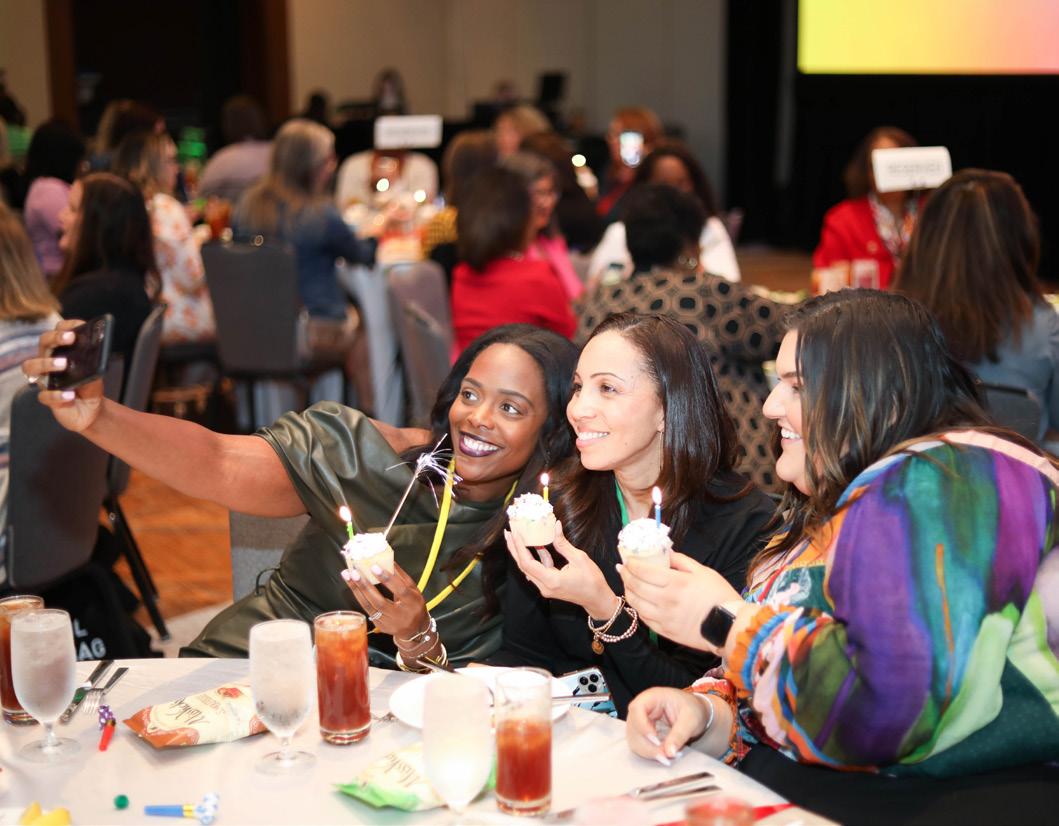
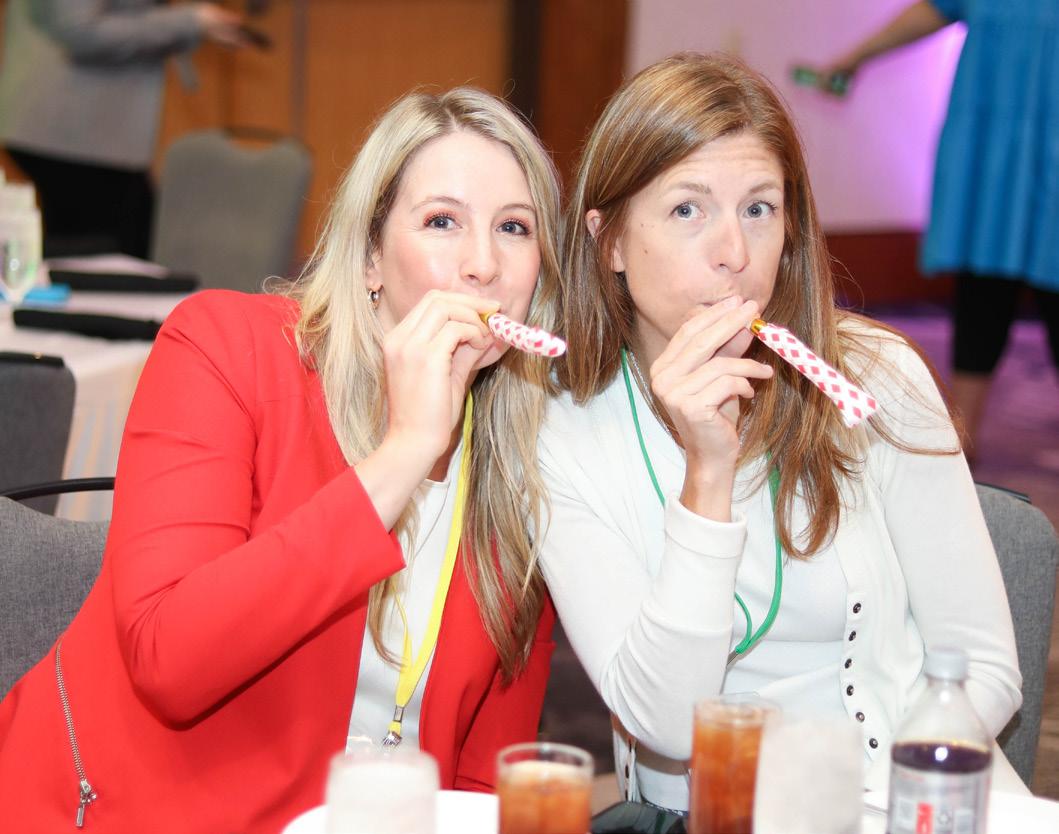
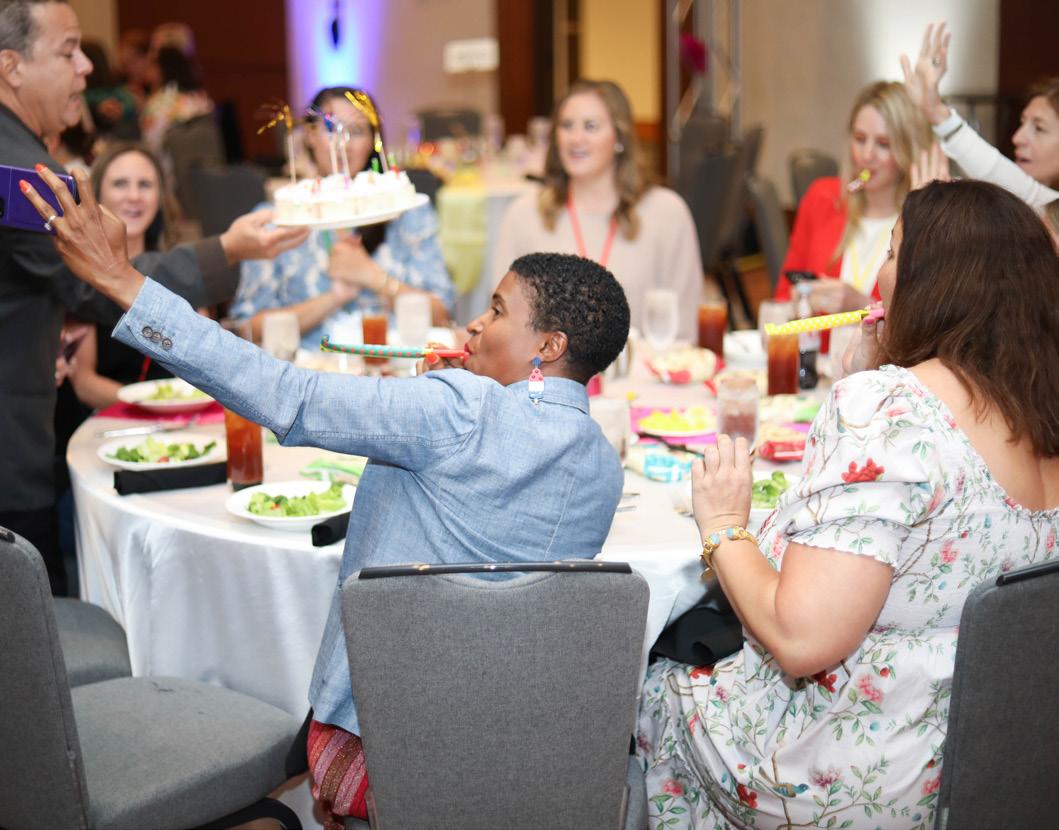
The world around us is stunningly diverse. Yet in 2024, it feels as though conversations about our differences are getting increasingly challenging to have.
Two women who met through The Junior League of Atlanta, Gabby Leon Splatt and Candace Bazemore, could not be more disparate in identity (Gabby is white and Jewish and Candace is Black and Christian), however they believe it is what makes us unique that creates a more beautiful and interesting world. Because of this, in April 2022 they published a children’s book, titled Shabbat and Sunday Dinner about elevating and celebrating our differences so that we can better talk about them and understand one another.
AJLI: Let’s start with how you both got started in The Junior League and met one another.
Candace: I joined the Junior League of Atlanta in 2008. One of my fellow alumni from Clark Atlanta University knew I was very active in volunteering and told me one day that she had found this great group of women who were volunteers, but she said to me, ‘Candace, they need you.’ I thought to myself that it was not possible that they need me – I didn’t know what she was talking about. Finally, she said they needed a
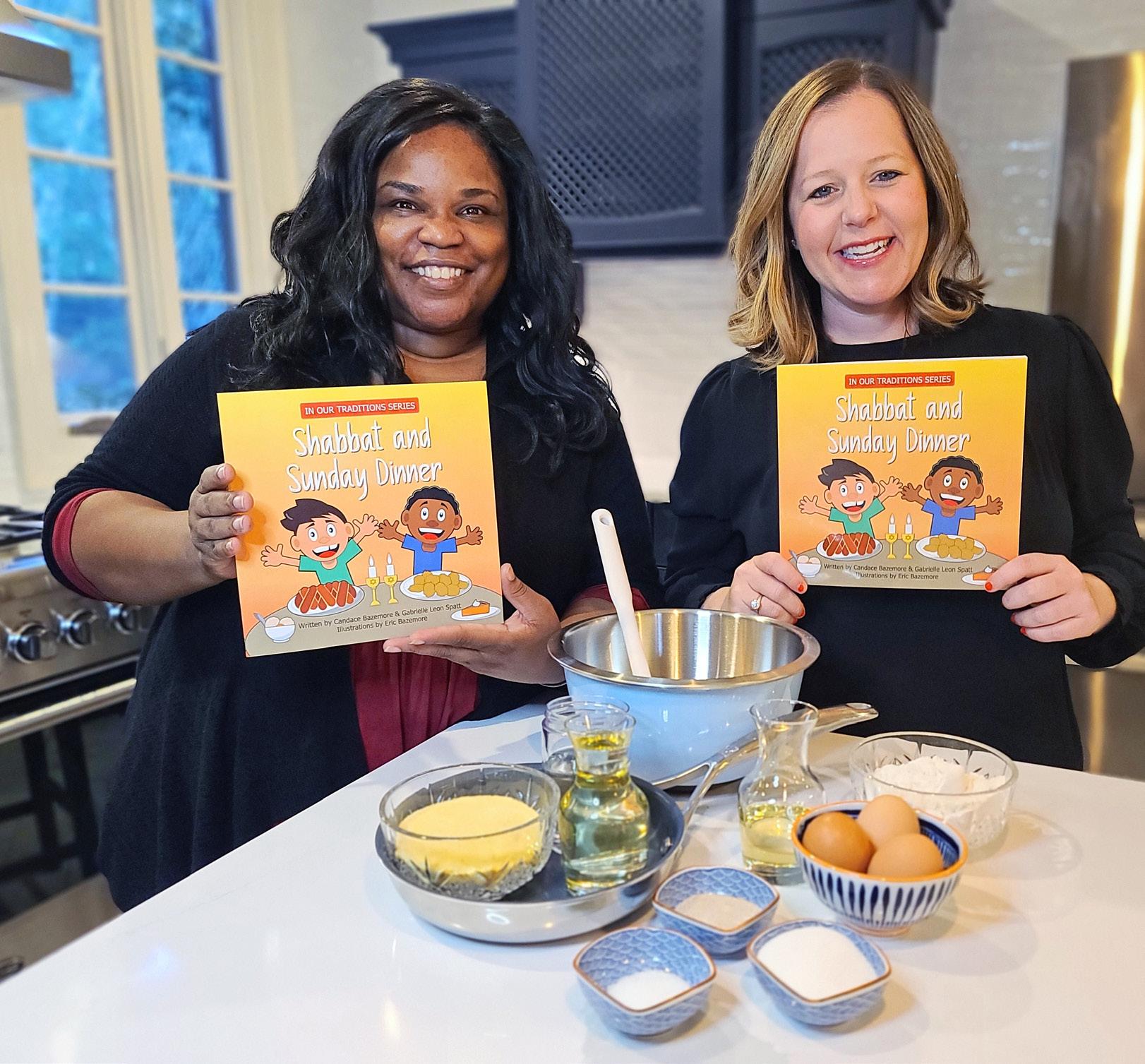
"The Junior League teaches you that you may have a tiny budget, you may have jobs and children and very little volunteer time, but you get it done. And you get in a room and your committee chairs and their backgrounds and whatnot, everybody brings something to the table in order to accomplish what needs to be done. This book is just one more example of that."
more diverse perspective and invited me to come. I came to their first information session and back then, of the over 100 people in the room, there were maybe 10 people of color. At that information session, I met another woman from Spellman and we made a pact that we were going to join because we wanted to bring some diversity to this group of women who were earnestly trying to help their community, they just didn’t know how to connect with others outside of their normal groups. If The Junior League grows by referral and the only people you know look like you, you’ll have a pretty homogenous group. But the League now has come so far and I am incredibly grateful to be a part of it, not least of which because it helped me meet Gabby!
Gabby: I joined the Junior League in Gainesville, FL about 15 years ago and then transferred over to Atlanta when I moved in 2010. Candace and I had seen each other and chatted a little at Junior League events but a year or two later, we ran into each other at a Black/Jewish Coalition program and were like, ‘hey! I know you!’
AJLI: Tell me more about the Black/ Jewish Coalition!
Candace: The Atlanta Black/Jewish Coalition started in 1982 to bring together Atlanta’s Black and Jewish communities for the renewal of the Voting Rights Act. It’s an incredible organization that puts on some great programming.
Gabby: Candace and I both went through their Project Understanding program, but we did so in different years. During Project Understanding, they bring together 36 individuals – 8 Black men, 8 Black women, 8 Jewish men, and 8 Jewish women. In 2021, we hosted an alumni brunch for people who had been through the program before. It was virtual, of course, because this was still during the height of COVID, so while we were waiting for the other facilitators to join, Candace and I got to talking about what we were going to make for brunch. I told her I would be having bagels and lox –
Candace: – and I said I would probably have chicken and waffles.
Gabby: So, we kind of joked that we should write a cookbook or children’s book or something. It started as a joke, but a month or two later we decided we should actually do it.
AJLI: So how did the process of creating the book go?
Gabby: Well, we applied for a grant from the Jewish Federation of Greater Atlanta and they supplied us with $2,000 as some seed money. With that, we were able to do it professionally. We used an editor and an illustrator to help bring life to is and produce it in a professional manner.
Candace: But the thing about the publishing industry is that, from the idea stage to seeing your book out in the world, it could take about three years. When we were working on this, it was right around the time George Floyd was murdered and there was some serious tension in our country, so we just really wanted to get the book out more than anything.
Gabby: So instead, we went through Amazon and now two and a half years later, people are still talking about the book. We have a program on MLK Day to read it and have a conversation with young children, we’ve spoken at churches, we’ve spoken with teens, we’ve done programs with all kinds of people.
AJLI: That’s amazing. Do you think that the fact that this is a children’s book versus a book for adults is part of why it’s so successful? Why did you choose that format specifically?
Candace: It was pretty intentional for us to choose that demographic so that these conversations could be had early on. There are tons of books that talk to adults and people our age, but not as many for young people. We figured that you don’t want to look for friends when you need them; you want to build those relationships early. And for kids, you want to encourage them to do so when they’re at a point where they like everybody. You want to encourage them to share their traditions and learn about others’ traditions too. It’s a great way to get people to be more open and understanding. The whole idea of the book being a conversation over dinner and including the recipes in the book is that, when you break bread with people, you’re able to talk about things more.
Gabby: We always say, when your stomach is full, your mind and heart are open.
Candace: It’s great to prepare kids early on to learn how to interact and to share. If we had more of that in the world earlier on, just think where we would be today.
AJLI: It seems these days that people really struggle with having conversations about what makes us different. How do you think your book helps to facilitate those conversations and make it a little easier to have these ‘scary’ conversations?
Gabby: Candace and I know firsthand that when you open yourself up to different experiences, your life gets fuller and richer. Because of my relationship with Candace, we now have so many shared life experiences that I would have never had if I hadn’t opened myself up. I’ve gone to church with Candace and been one of the only white women in the room and she’s come to me with a challah bake and been the only Black woman in a room of 250 Jewish women. That means something to us. They’re personal experiences, but they’re community experiences as well, and more than anything, it’s built on love, friendship, and understanding. When I’m with Candace, I pray before my meal. I don’t typically do that but it’s something I’ve learned and value as an experience.
Candace: It’s been – more than anything – a gift to learn and to be able to understand one another in that way. We want to normalize the idea that people can be different and in the same room and it is a good thing. In the book, the kids are presenting to their classroom and all the kids are different. You’re going to be around people who have differences so we want to encourage people to look at differences as – not something that makes you ‘other’ – but rather as something that makes the room more unique. In the book, we have David, who gets up to talk about the Shabbat ritual and starts off by saying ‘Shabbat Shalom, y’all!’ It shows that he’s combining his Jewish faith with his southern heritage.
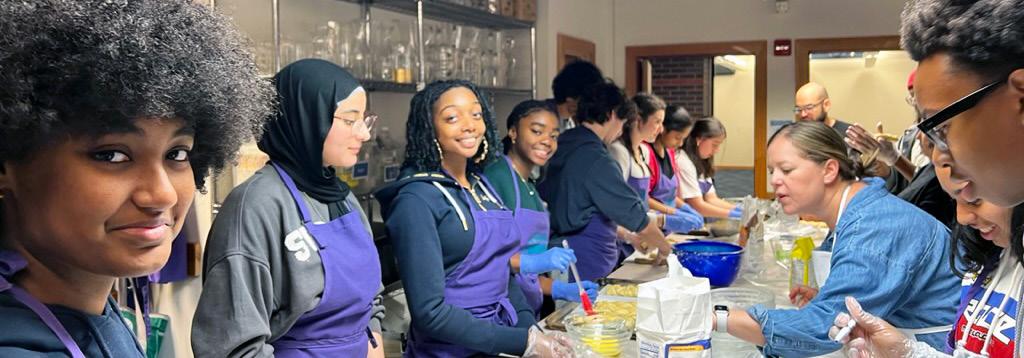

AJLI: What do you hope people who purchase and read this book will get out of it? What do you hope it will accomplish?
Gabby: I think, more than anything, our hope is just to create a more welcoming, thoughtful, knowledgeable community. We hope that, even if an adult who doesn’t necessarily think this way or who hasn’t had the opportunity to have some of these experiences or conversations, if they read it with their child, it gives them the opportunity to think differently and open themselves up.
Candace: We include discussion questions in the back of the book and one
of them is, ‘have you had a conversation with somebody who thinks differently than you in the last week?’ We hope that it reaches adults just as much as it does children.
AJLI: Thank you, ladies, for sharing with us. Is there anything else you’d like your fellow League Members who will read this to know?
Candace: One thing that I think can’t be overstated is how being a part of The Junior League helped us make this happen. Aside from making the connection between myself and Gabby – two people who (like many Junior League women) love to keep adding
things to their metaphorical plates that are already very full – the things we were taught through our experience made this all happen.
The Junior League teaches you that you may have a tiny budget, you may have jobs and children and very little volunteer time, but you get it done. And you get in a room and your committee chairs and their backgrounds and whatnot, everybody brings something to the table in order to accomplish what needs to be done. This book is just one more example of that.
Shabbat and Sunday Dinner can be purchased on Amazon .
Have you or a Junior League Member you know written a book and want to be spotlit in an upcoming Book Talk feature?
Fill out this survey and let us know: www.surveymonkey.com/LLBT !
Continued from page 23

Every year, Members of Leagues from all across the Association gather for AJLI’s largest event – our Annual Conference. One thing is for certain – this year’s conference, which takes place May 15-18 in New Orleans, will be one Leagues will talk about for years to come.
This year’s theme is Unmasking Endless Potential, which will be embedded in every aspect of Annual Conference. Attendees can expect to walk away from this event having unmasked not only their own potential, but the potential of their individual Leagues, as well as having been a part of unmasking the potential of the Association at large. This key component of unmasking the potential of the Association at large will occur at the critical pieces of every Annual Conference, which are the Annual Governance Dialogue and subsequent Business Meeting. These functions provide Leagues with the opportunity to make the decisions that drive the direction of the future of the organization. Many topics will be brought to the table for discussion this year, including the external statement process, bylaw changes, revision of the organization’s purpose, and more. The full slate of items that will be discussed will be released in March so keep an eye out for more information.
Of course, it would be an insult to our beautiful host city to focus the entire event on Association business. We are so excited to be bringing plenty of New Orleans flavor to every meal and mainstage presentation at Annual Conference.
Attendees can expect celebrations filled with plenty of music, food, and flare. We cannot wait to ‘laissez les Bontemps rouler’ (let the good times roll) with you in the Big Easy, and no one is more excited than our AJLI President-Elect, Alice Glenn, who currently hails from the city itself.
“It is an incredible honor to welcome Junior League Members from around the world to New Orleans in the same year that our own League celebrates 100 years of service to our community,” she shares. “Our city is built to host gatherings of all shapes and sizes, and no one compares when it comes to the way we seamlessly blend business, training and celebration into one unique transformative experience. That I will be sworn in as chair of the AJLI board during this Annual Conference is serendipitous, so on behalf of our incredible organization, I extend a warm invitation and hope you will not hesitate to reach out to me if I can do anything to ensure your Annual Conference unmasks all the possibilities of the year ahead.”
With so much to look forward to at this event, we encourage that Leagues sign up early, as space will fill up fast for this event. The cost for the event is $650 if you register before April 10 and $750 from April 11-May 1. Find out more information about the schedule of events, register, and book your hotel room here. We look forward to celebrating with you in New Orleans!

 BY JACQUELYN BAUMAN, AJLI DIRECTOR OF CONFERENCES
BY JACQUELYN BAUMAN, AJLI DIRECTOR OF CONFERENCES
Junior Leagues are filled with motivated, ambitious women who are as close to superwomen as you get outside of a comic book. But as Oprah Winfrey once said, “You can’t do it all yourself. Don’t be afraid to rely on others to help you accomplish your goals.”
This is simple in theory, yet people find the art of delegating difficult for many reasons.:
• We are hesitant to delegate because we believe it would take longer to explain a task than completing it ourselves
• We want to feel indispensable to our team
• We enjoy completing certain projects
• We feel guilty about adding more work to someone’s to-do list
• We lack confidence or trust in the people we could be delegating to
• We believe we’re the only ones who can do the job correctly
Do any of these reasons sound familiar? Regardless of the “why” behind our hesitation to delegate, it is ultimately an important skill to develop.
Sharing responsibility helps to avoid burnout – something many women struggle with daily. There are so many “asks” from the world around us, whether it is in the workplace or in the home, oftentimes our tasks feel like a never-ending to-do list. When we grant ourselves the grace to share some of our duties, it lightens the load in our minds, which allows us to continue doing good work for longer. You can’t pour water from an empty bucket, and learning how to delegate is one way to ensure your well doesn’t run dry.
In addition to the benefits that delegation brings to individual leaders, it is beneficial for your team and your organization as well. As a leader, it’s important to know that everyone brings something unique to the table, and everyone wants to contribute. The best leaders are the ones who let other’s skills shine. Even if the task at hand isn’t one that highlights a skill or talent that someone inherently has, it offers them the opportunity to develop them. Junior Leagues are training organizations, with a focus on leadership development. It is not just about having ourselves stand in the spotlight but allowing others to do so as well. Additionally, when people have a stake in a project, they feel invested in its success. Having engaged and invested individuals helps with Member retention and keeps them around longer.
Of course, everyone has had at least one experience (if not more) of a time when they have asked an individual to complete a task and it ended up incomplete. These experiences compound over time and can cause us not to trust others in the future. So, the important question becomes, how can you learn to trust others to do what you ask of them?
There are a few psychological theories behind motivating others to ensure tasks get completed by your team. The first of these is Herzberg’s two factor theory, which was created in the 1950s by American psychologist Frederick Herzberg. The two facets of this concept are outlined as “hygiene factors” and “motivating factors.” Hygiene factors are the environmental factors that create dissatisfaction and can limit people’s desire to complete tasks such as poor interpersonal relationships, policies, or volunteer conditions. These will not increase motivation, yet if they are unfulfilled, they can have a detrimental effect on your team’s motivation.
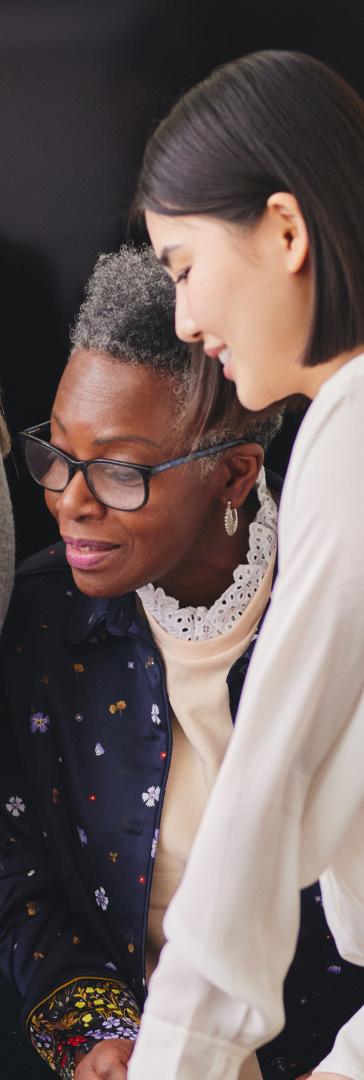
These motivating factors are aptly named because they are the components that increase motivation, such as achievement, recognition, growth, or advancement. When these two factors are both met, a person is more likely to be motivated and ensure their responsibilities are handled.
Another psychological theory that addresses how to motivate teams is Maslow’s hierarchy of needs. Developed by another American psychologist, Abraham Harold Maslow in 1948, this motivational theory is often portrayed in a five-tiered pyramid. The theory states that in order to reach the state at the top of the pyramid – self-actualization – the other needs must be met and built upon first. The five tiers of the pyramid are as follows (starting with the bottom tier):
• Physiological needs, such as food and rest
• Safety and security, such as health and finances
• Love and belonging, such as friendship and sense of connection
• Self-esteem, such as achievement and independence
• Self-actualization, such as realizing personal potential
It should not be surprising that if someone on your team is struggling outside of their Junior League work with the first two tiers of the pyramid, (their physiological needs and/or their safety and security needs) they may not be able to accomplish their work for the organization. If they are having those needs met and still are not tackling all the tasks they need to for the organization to function, they may be missing the following two levels of their needs – love and belonging and self-esteem. Ensuring they have healthy relationships within your League and building their sense of self in their work through positive affirmations or increased responsibility can help to maintain their drive and increase the probability that their projects are completed.
The last theory is one that builds upon Maslow’s work –McClelland’s three needs theory. This theory was written by David McClelland in his 1961 book, The Achieving Society. In this, he identified three main motivators – affiliation, achievement, and power. He believed that people have all three motivators, however, whichever is the most dominant will change how to approach encouraging a particular individual. Those who are affiliation driven will work best in a group environment and will be risk averse. They desire personal feedback and will be more motivated by the relationship you build with them or allow them to build within their teams. Achievement dominant personalities will prefer challenging tasks and shine best when they are problem solving and overcoming difficult situations. Lastly, there are those that have power-dominant motivators. These individuals will work best when they are leading a team. They enjoy competition so they do well in goal-oriented tasks.
Of course, these three concepts are not the only motivational theories that exist. There is also Sirota’s three-factor theory, Amabile and Kramer’s progress theory, intrinsic motivation theory, ERG theory, and so many more. If you are struggling with motivation or trust within your team, it may be helpful to look into resources online or at your local library that will help expand your delegation skills.
Whatever method speaks most to you, the most important thing is understanding that trusting your fellow League Members is critical to your success as an organization. As American philosopher and founder of the Institute for Ethical Leadership Joanne Ciulla once said, “Leadership is not a person or a position. It is a complex moral relationship between people based on trust, obligation, commitment, emotion, and a shared vision of the good.”
When we grant ourselves the grace to share some of our duties, it lightens the load in our minds, which allows us to continue doing good work for longer.

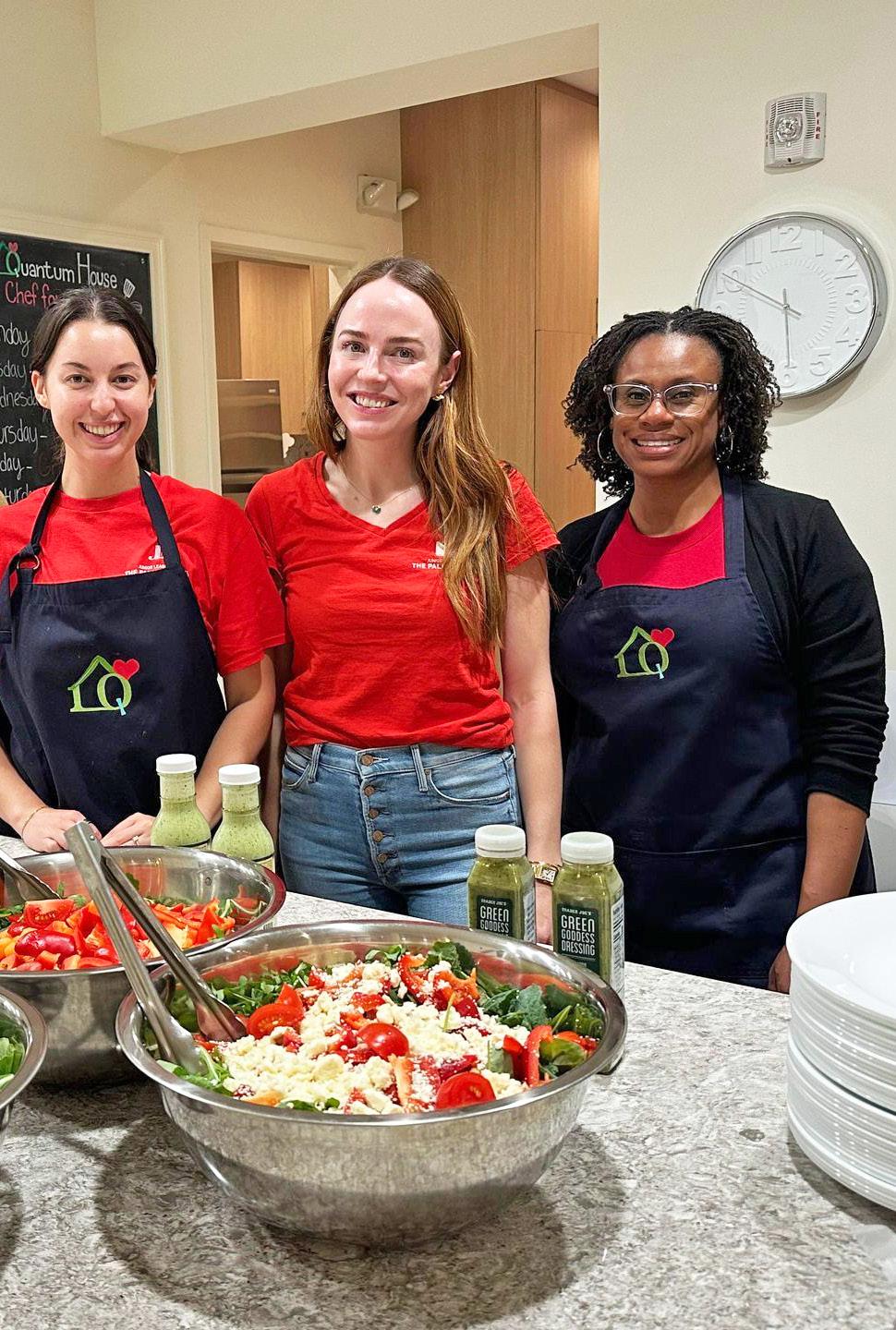
“The Mission statement didn’t have the same meaning or relevance that it once had when our organization started,” explained AJLI Board Member Melissa Allen who was a major player during the years these changes were discussed. “Because it didn’t resonate as well with the women of today, many Leagues found they were struggling to recruit with the Mission as it was.”
If you were not a part of the Junior League prior to 2022, or if you were unaware of the Mission changes occurring at the time, the previous iteration of the Mission statement was as follows:
The Association of Junior Leagues International, Inc. (AJLI) is an organization of women committed to promoting voluntarism, developing the potential of women and improving communities through the effective action and leadership of trained volunteers. Its purpose is exclusively educational and charitable.
“What came from our discussions as a Membership was that the Mission statement needed to be more relevant and reflective of the women in our organization today,” Allen continued. “We wanted to modernize the Mission statement, versus radically overhaul it.”
On May 4, 2019, an advisory resolution was brought to the floor of the Annual Business Meeting in Denver, CO to look at making changes to our Mission statement. At the time the question was posed, our organization was nearing its centennial anniversary, and the Mission in place had been around for over three decades. With such a history, why did Leagues feel the need to make any changes?
It was revealed in the three years that followed the advisory resolution, during countless discussions across the Membership at large that, while the sentiment behind the Mission statement was still relevant, the words themselves were dated. Although on the surface this may seem like a minor issue, it came to light that the outdated language proved to have a bigger influence on the daily operations of the League than many realized.
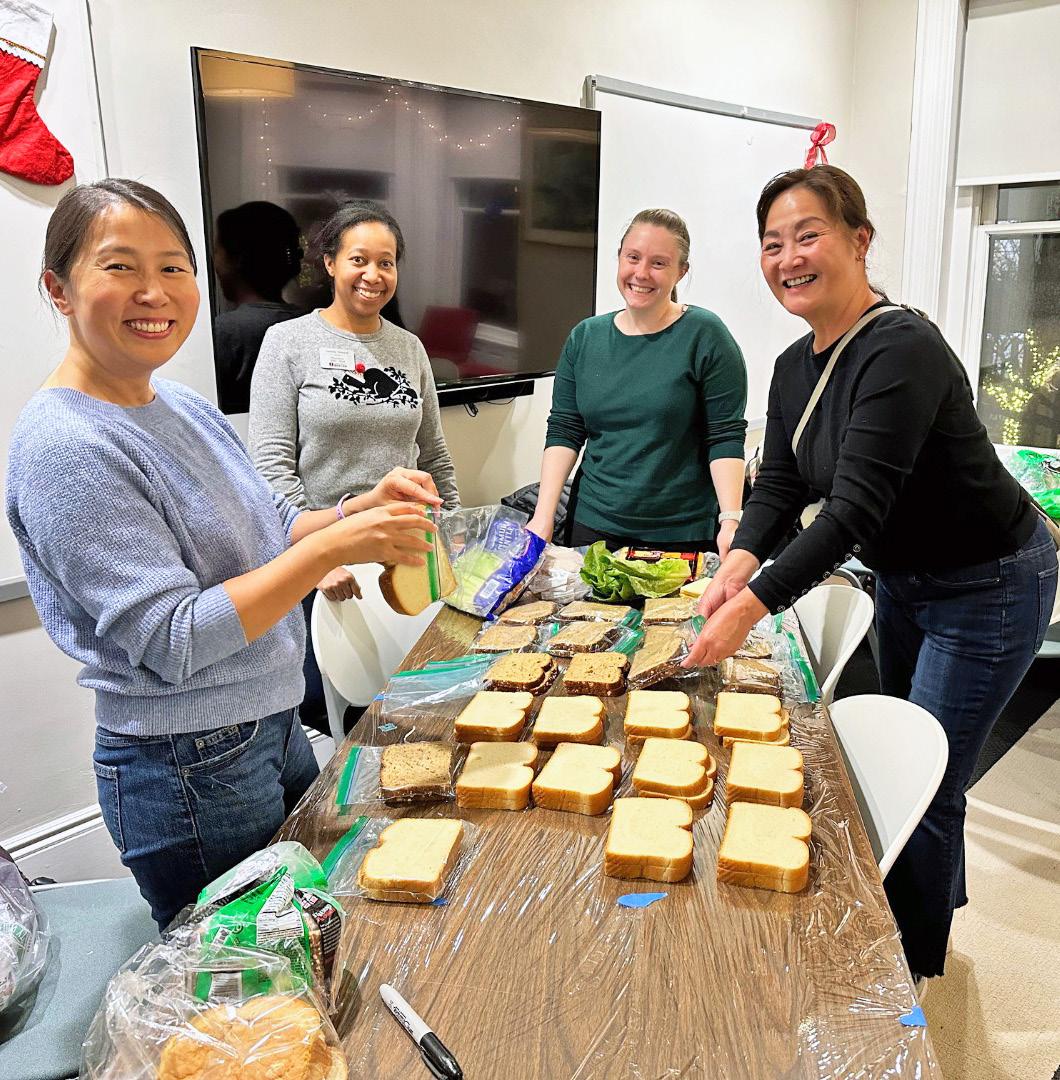
“What came from our discussions as a Membership was that the Mission statement needed to be more relevant and reflective of the women in our organization today,” Allen continued. “We wanted to modernize the Mission statement, versus radically overhaul it.”
Image courtesy of The Junior League of Boston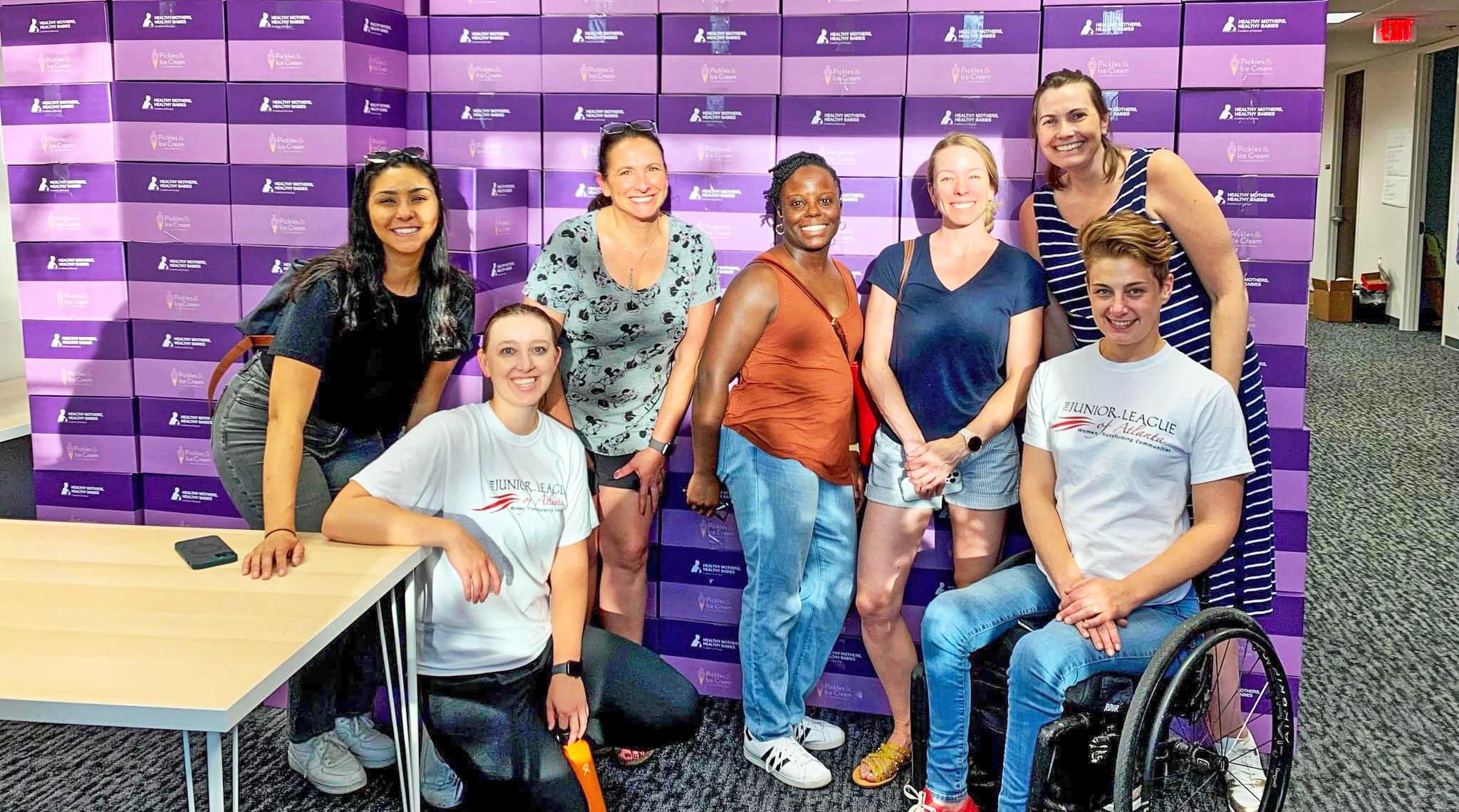
Today, our Mission statement reads as follows:
The Association of Junior Leagues International is an organization of women whose Mission is to advance women’s leadership for meaningful community impact through volunteer action, collaboration, and training.
The result of the countless passionate and robust conversations on the words used in our Mission revealed which pieces of our needed to be emphasized and which no longer aligned with our identity.
“During our discussions, Members overwhelmingly agreed that what resonated most strongly with them both internally and externally was the concept of women as catalysts for lasting community change,” Allen shared. “Community impact continues to be our organization’s major priority, therefore what needed to be centered in our Mission was advancing women’s leadership FOR community impact, not women’s leadership AND community impact and not women’s leadership on its own. It was important to bring those two aspects together.”
With the cornerstone of the new Mission solidified, the next step was to revise the portions that no longer properly fit. One of the first pieces of the old Mission that Members wanted to address was “developing the potential of women.”
“The League Members of today are not the same women as our Membership 30, 40, or 50 years ago,” Melissa Allen continued. “Our Members have more opportunities than their predecessors, so many of them are joining the League with already developed skills. They don’t need to have their ‘potential developed,’ which some claimed in our forums was insulting terminology. They have the skills. They want the experience. They want to connect with other women and be a force for good and to grow as a part of that.”
The phrase “improving communities” proved to be another aspect of our old Mission that our League Members found no longer properly represented our identity. Many declared that, although the motivation behind it was strong, the expression itself was tone deaf and didn’t accurately reflect the intent of League’s work in their communities.
Lastly, the term ‘voluntarism’ was one that Members agreed was antiquated and often misunderstood. Voluntarism –the principle of relying on volunteer action – was discarded in favor of the more direct and specific ‘volunteer action.’
With these changes finally cemented, the new Mission was voted into effect at our 2022 Annual Conference in Dallas, TX.
The new version of our Mission is not only stronger, shorter, and snappier, it is also an essential part of League’s recruitment toolkit as it now succinctly describes the value the organization provides to potential Members.
“Even though some of the new Mission is conceptually similar to what we had before, it’s now more reflective of where we want to go and, more importantly, how we want to get there – by making an impact both individually and together,” Allen expounds. “It gives us a little bit more focus because the words that are in there now are much more action oriented. Ultimately, our Mission should drive our strategy and this version sets the expectation with current and prospective Members in a clearer way. It lays out how, as a League Member, you are going to act as a Leader and make a difference in your community while making connections and honing your skills.”
2 023 brought about the start of a new chapter for The Association of Junior Leagues International – one which centered around the future we hoped to build as an organization.
In May of last year, Melanie Schild stepped up to the podium at Annual Conference in Indianapolis to share with Members the six priorities to “secure our future” as an organization. These were:
1. Establish ways to help our Leagues succeed.
2. Provide services and connection opportunities for individual Members.
3. Engage in community impact and advocacy.
4. Amplify the image and the relevancy of The Junior League.
5. Grow and retain Membership.
6. Prioritize financial prudence and growth.
(To read more about these six priorities, please see the “Secure Our Future” article on page 16 of the Fall 2023 issue of The League Life.)
As we approach our 2024 Annual Conference this May in New Orleans, it is only natural that we take the time to reflect on the progress the Association has made to deliver on these promises.
So, what did we do in 2023 to push these priorities along? Let’s break it down.

Establish ways to help our Leagues succeed.
One of the most impactful changes implemented this year was the launch of the League Success Managers at AJLI. League Success Managers (LSMs) are association contacts assigned to individual Leagues to assist them with their everyday challenges, such as struggles with nominating, recruitment, New Member training, conflict resolution, and more. To find your League’s LSM, go to https:// www.ajli.org/?nd=lsm_landing. Over the past year, AJLI Staff in these newly formed positions have held multiple consulting sessions with Leagues, have exchanged emails with League Presidents, and have connected with Leagues Members in a variety of positions such as Directors, Chairs, and VPs.
“I feel like I understand more now how AJLI actually benefits me,” says one Junior League Member about her experience with her League Success Manager. “I reached out because we were having Member engagement issues and it helped me in so many ways.”
These connections are already paying dividends in improving the health of our organization. Based off feedback from
monthly meetings with League leaders, the LSMs are now spearheading projects to create resources for Leagues about nominating, recruitment, and other topics, as well as developing training on holding Member-based recruitment events.
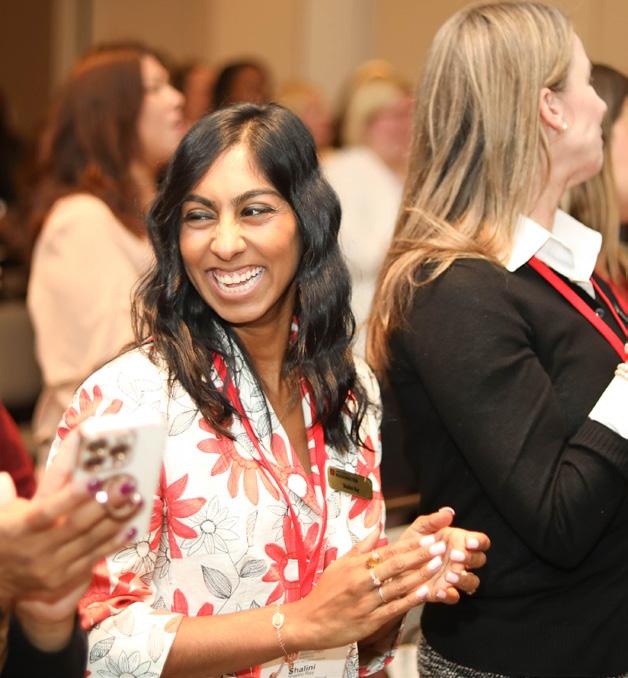
“I feel like I understand more now how AJLI actually benefits me,” says one Junior League Member about her experience with her League Success Manager. “I reached out because we were having Member engagement issues and it helped me in so many ways.”
Image courtesy of Erika Cain
“The purpose of AJLI is to provide a benefit to the Leagues and their Members,” says Melanie Schild . “Without the Leagues, AJLI would not exist – but the Leagues would continue to exist without us. It is important that we remember that. We need to work to provide value to Members, and connecting with them on a personal level, through our League Success Managers, helps us do that. We’re able to keep our finger on the pulse of the needs of the Membership so we can offer solutions.”
Over 2023, AJLI also hosted several “Connections for Change” sessions – a virtual roundtable series that offers Members a chance to participate actively in the transformation and evolution of The Junior League Movement by providing feedback on topics directly to the Association. The topics covered so far are recruitment and admissions strategies, New Member education, advancing women’s leadership, and shared services.
“Connections for Change has brought invaluable insights to our organization,” explained AJLI Executive Communications Manager Madeline Neyenhaus. “These conversations have shed light on what our Leagues really need. We have tackled everything from recruitment to advancing women's leadership to how to ensure our Members are getting the most out of their time in The Junior League. Thanks to everyone who participated for helping to shape a stronger, more connected organization.”
Provide services and connection opportunities for individual Members.
Another successful endeavor that had League Members buzzing this year was the return of the Organizational Development Institute (ODI). For League Members who joined after our last ODI in February 2020, these events are training conferences focused on organizational growth for Leagues and personal development for Junior League Leaders and Members. This three-day conference, which took place in November in Washington DC, hosted workshops and mainstage presentations on crucial conversations, Member expectations, marketing, DEIB (diversity, equity, inclusion, and belonging), recruitment, public speaking, advocacy, Member engagement, and more.
The revitalized event saw a record number of registrants, with AJLI needing to close registration due to capacity constraints for the first time in history. There were over 300 League Members in attendance representing 119 Junior Leagues, including international Leagues such as Mexico City, Calgary, and an affiliating group, Puerto Rico.
“I never once looked at my watch waiting for the sessions to be over like I have in previous conferences,” explained one ODI attendee on her post-event survey. “I was engaged from start to finish.”
Aside from the content, many Junior League Members who joined us in DC were most moved by the connections they made and feeling the impact of the Association at large.
“My favorite part of the conference was discussing concepts with other Leaguers,” another survey respondent shared. “Our different experiences increased the utility of our discussions. Those new perspectives on what other small Leagues are doing about the same issues we’re facing, as well as what large Leagues are doing and how we can strive for similar growth.”
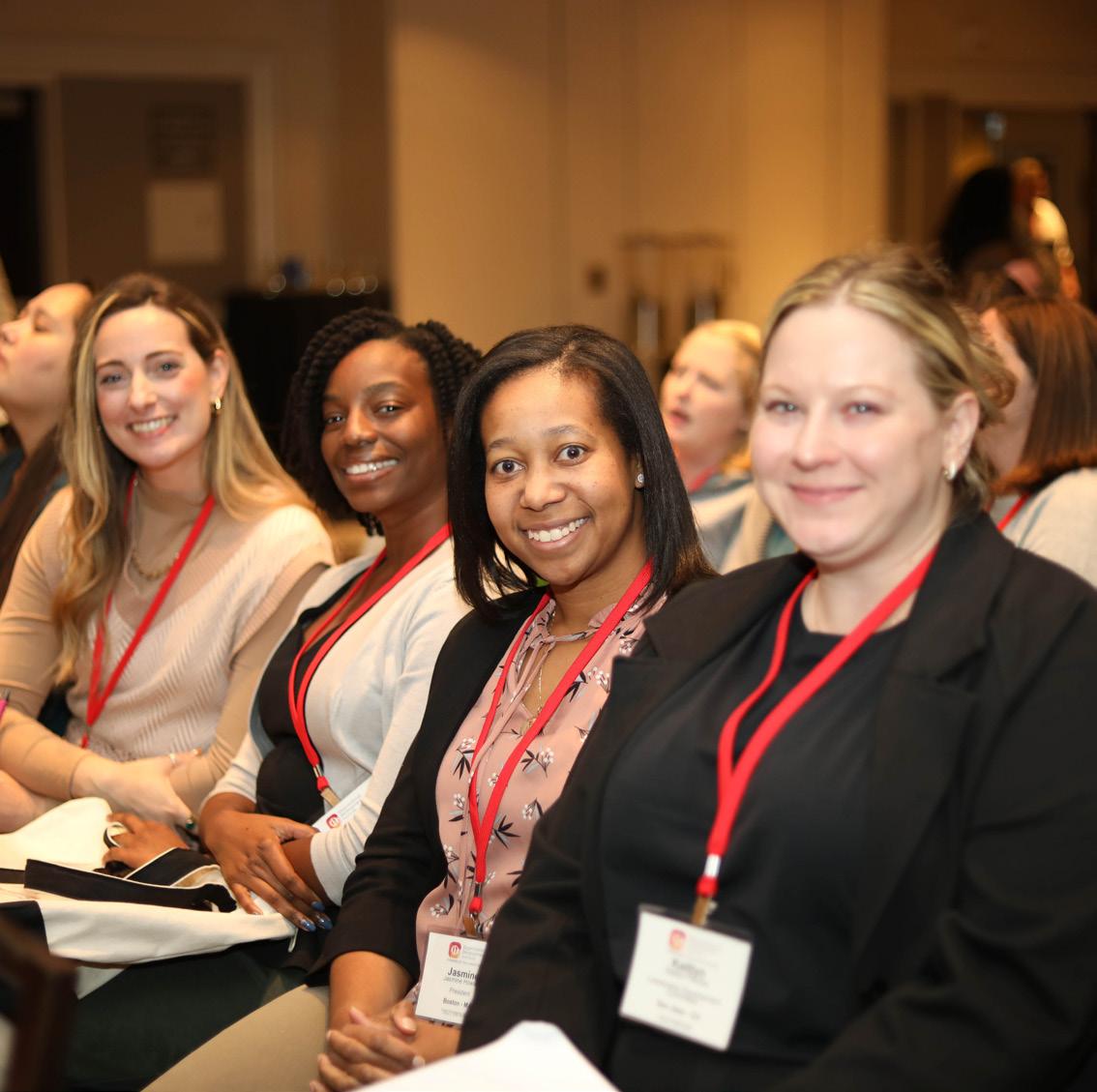
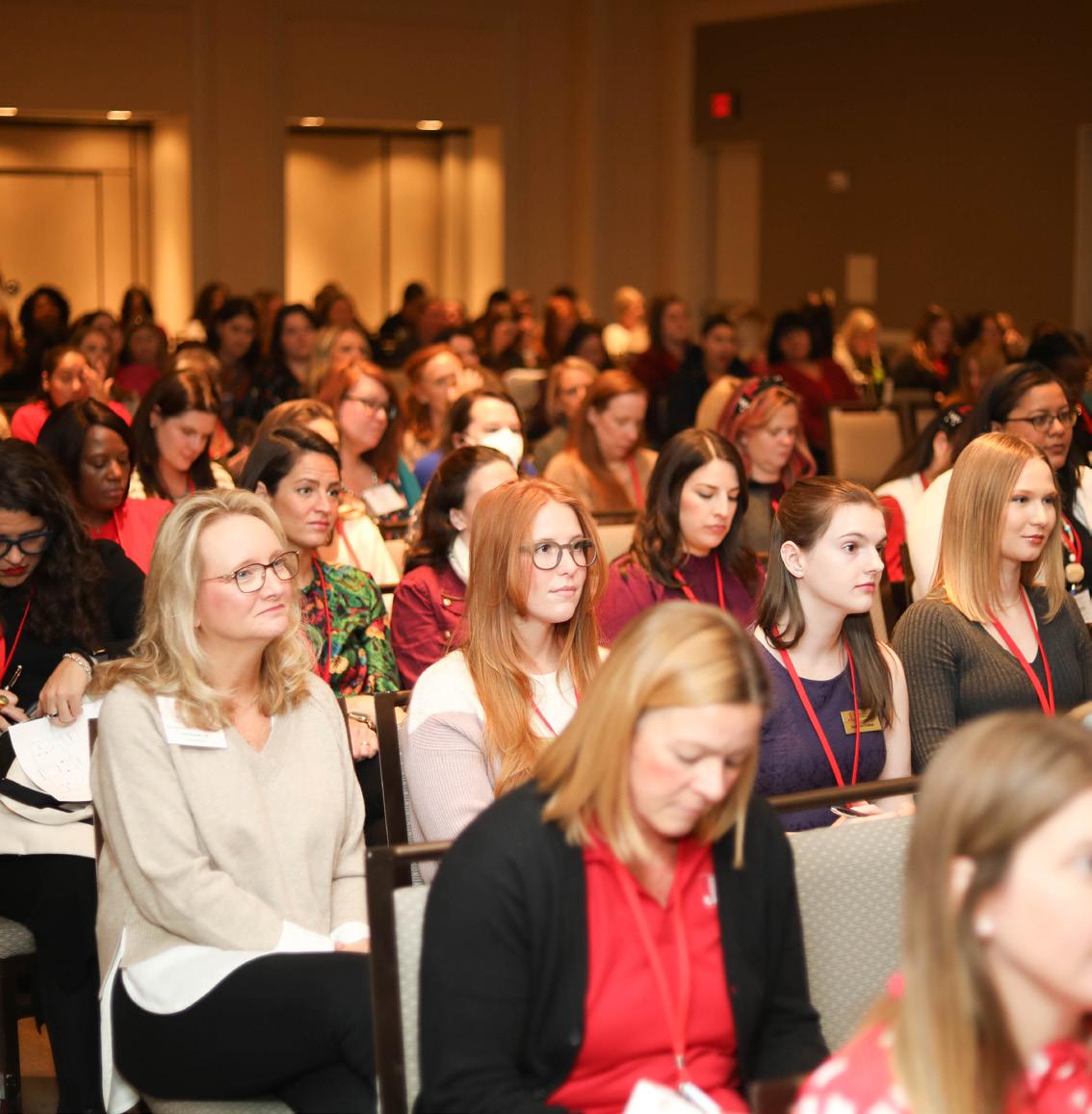
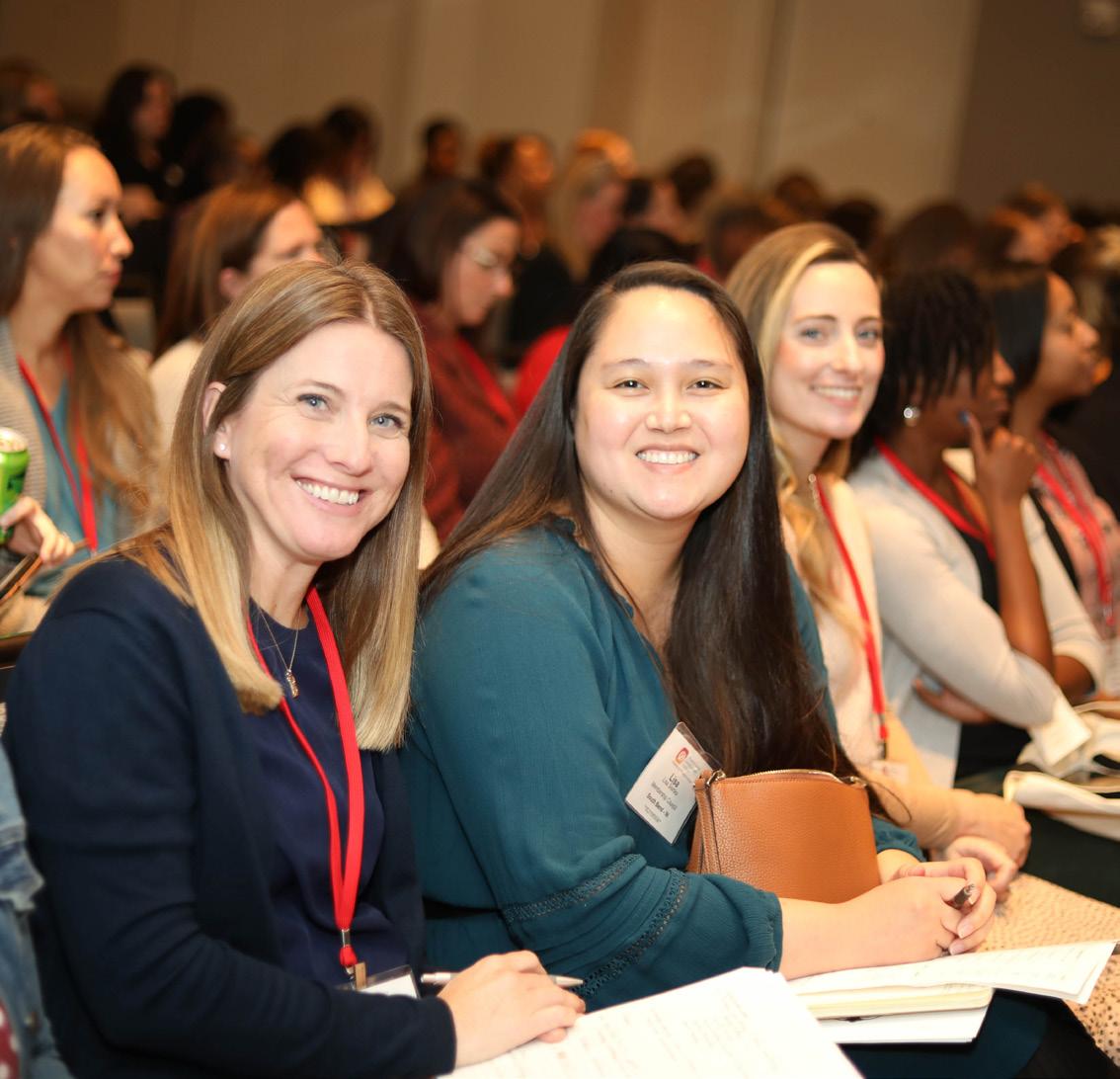
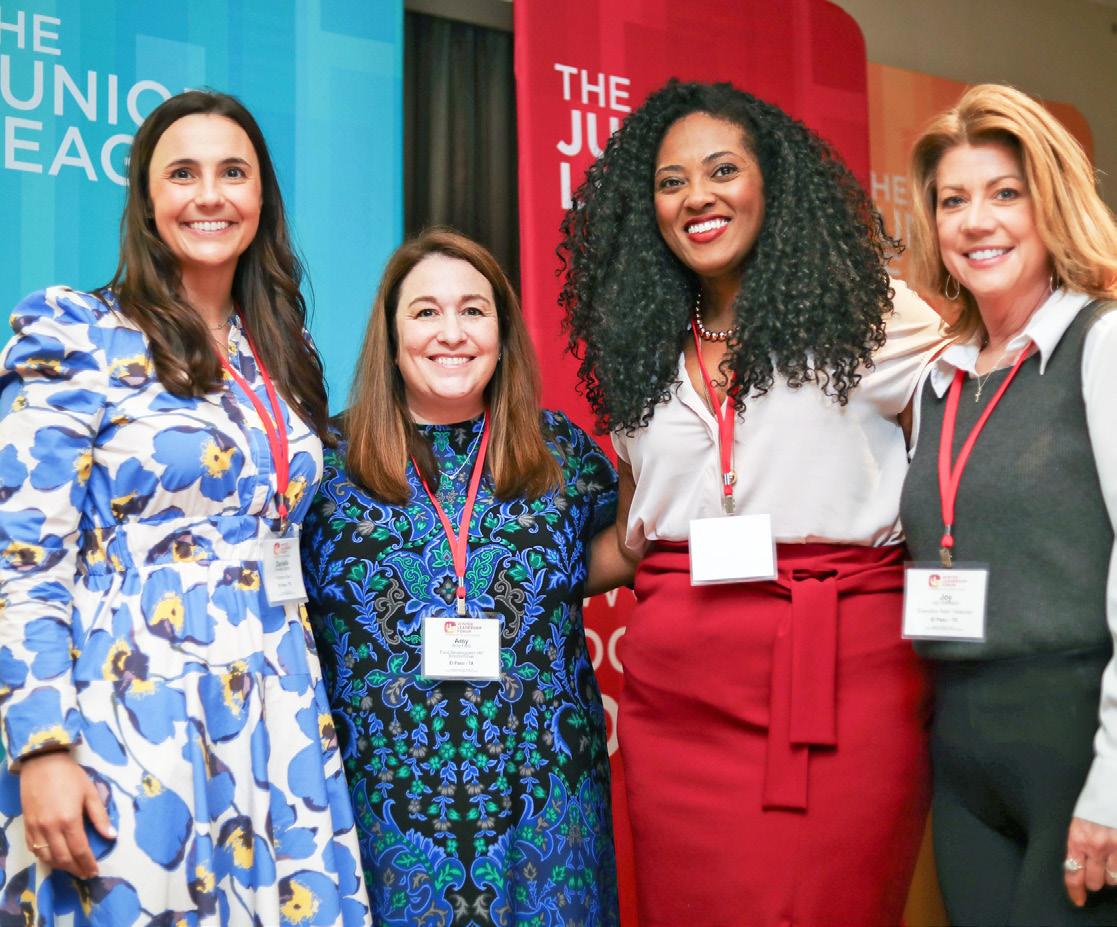
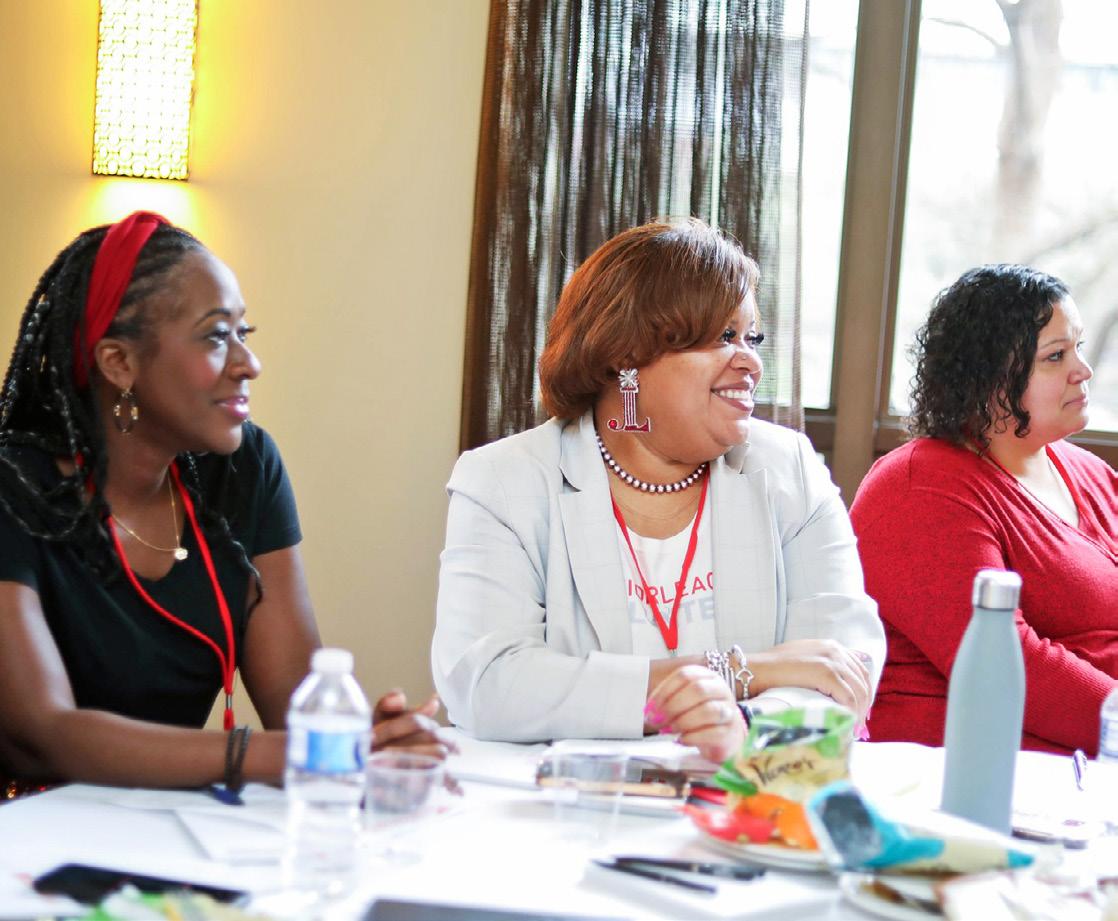
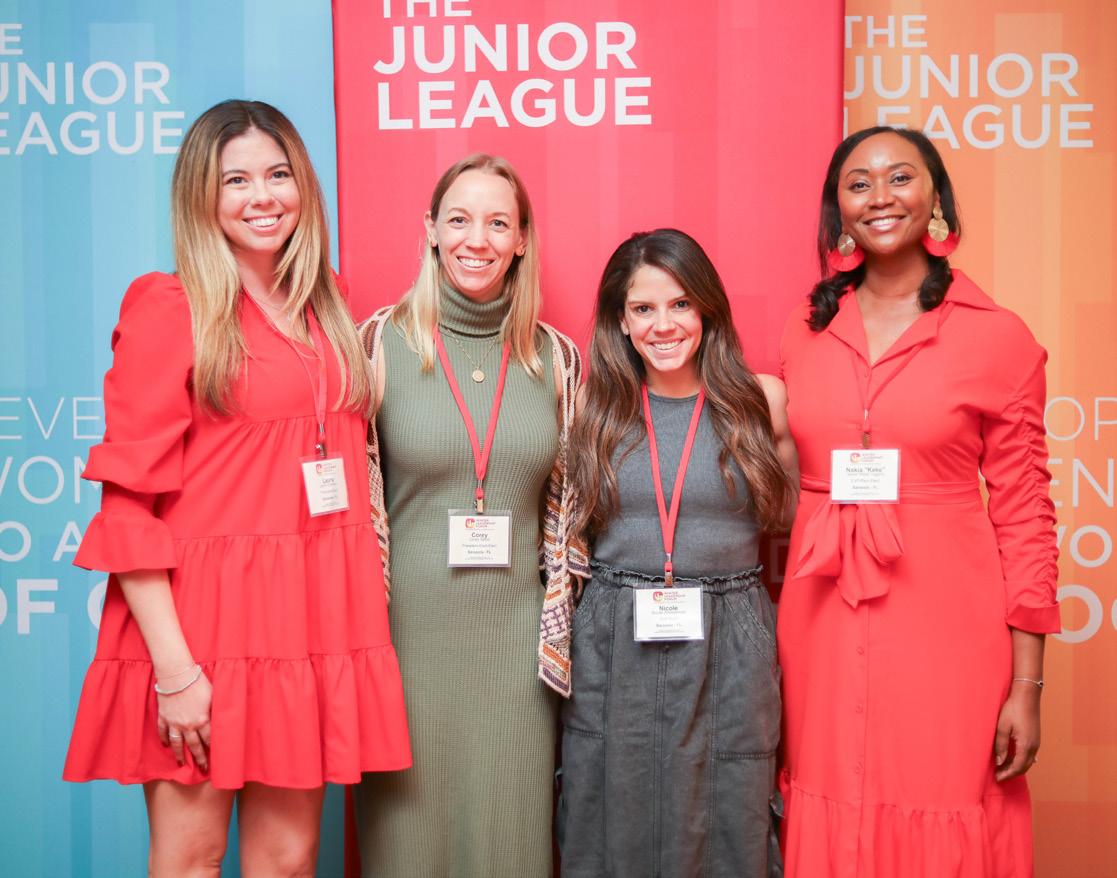
As a women’s organization, we have shifted our advocacy focuses to address the specific needs of women, including barriers tox women’s leadership, loneliness in aging women, mental health for women – specifically around caretaking, and more.
February also saw the return of our in-person Winter Leadership Forum, which helped train incoming League Leaders and prepare them to run their Leagues efficiently. AJLI is excited about being able to provide this training with increasing frequency to ensure that we are providing value to Members in all stages of their League journey.
Engage in community impact and advocacy.
This past year also saw the establishment of our inaugural Find the Good Day – an AJLI movement that celebrates compassion, community, and positive change. Leagues across the Association participated in this endeavor with initiatives like a free laundry day (Owensboro, KY), a teacher appreciation project (Durham and Orange Counties, NC), a “packing party” (Richmond, VA), and more! You can find more information on how Leagues participated on page 12 of our Fall 2023 issue of The League Life .
Obviously, it is not just advocacy on the Association level that makes a difference, as the power to effect change lies within our individual Leagues. It is with this knowledge in mind that AJLI is establishing an advocacy institute to provide training and resources to Leagues. Keep an eye on emails and social posts from AJLI for more information.
Amplify the image and the relevancy of the Junior League.
Crafting a brand identity that captures the current energy of our Leagues was an important task for 2023. While the Junior League red unites us as an organization, the identity of our brand was austere and didn’t paint a full and accurate picture of the spirit of our organization. At ODI in November, we launched our secondary color palette, which introduced more life into our brand identity.
“Our brand is a vibrant reflection of the passion and dedication of our Leagues,” says Nicole Bergman, Vice President of Marketing & Communications. “By embracing a secondary color palette, we are not just adding colors; we are infusing our identity with the diverse energies that drive our collective Mission.” With this new image, AJLI rolled out our updated website in January so that members of the general public could get a more authentic impression of our organization and fuller understanding of our purpose and the work that we do. The website highlights prospective members, community partners, and the importance of Junior Leagues.
In addition to the recruitment resources being compiled by the LSMs and the workshops on growth and retention being offered at our newly restored in-person events, AJLI is looking at creative ways of building our membership pipeline into the future.
Image courtesy of Erika Cain Image courtesy of Nicole Bergman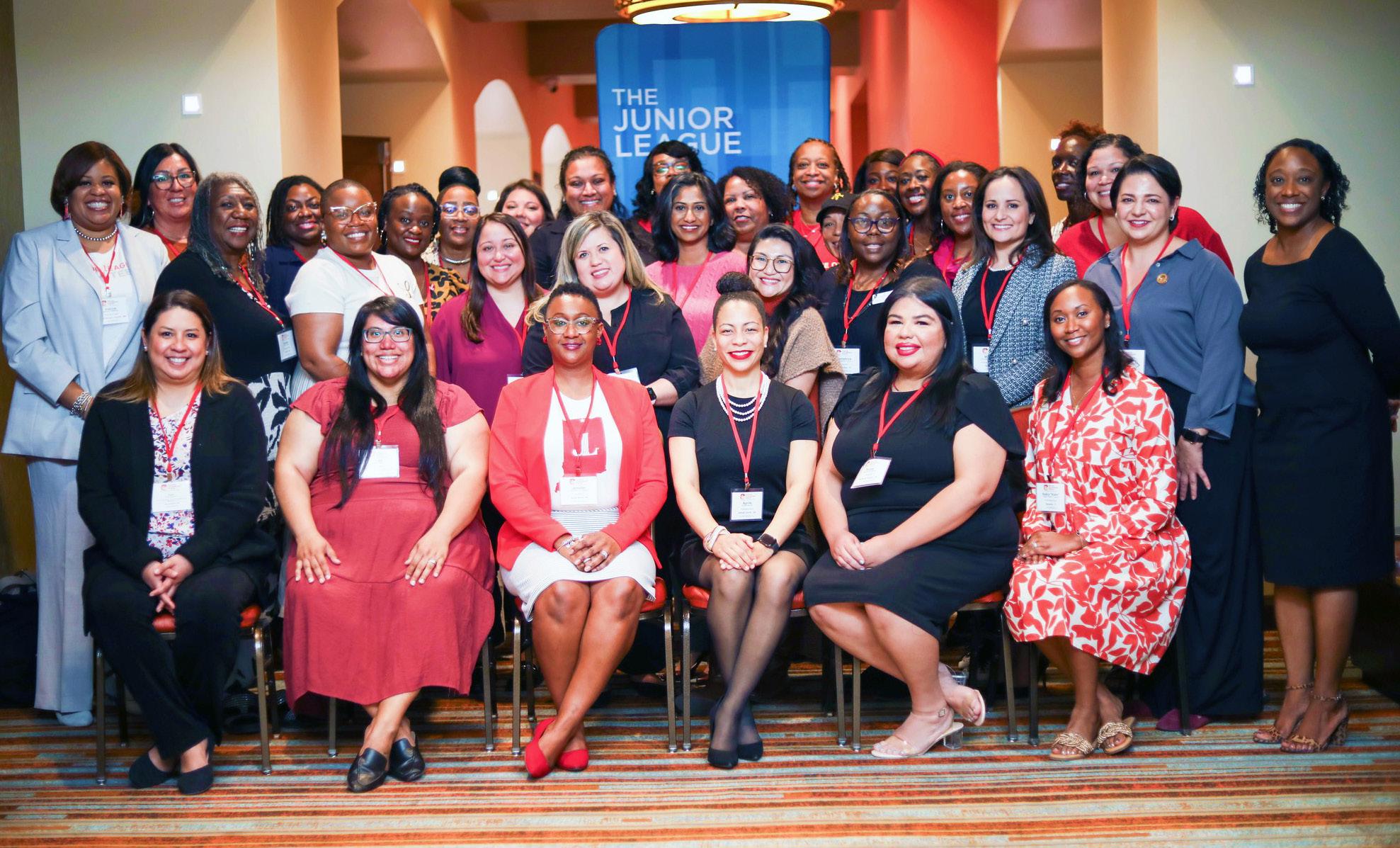
One endeavor that falls under this umbrella is the potential institution of our Junior League Teens and Jr. League Junior Teens programs, which would introduce not only our organization to a younger generation but would also help build and develop leadership skills for growing girls.
The Junior League Teens program would be for high school-aged girls. They would meet monthly and assist their local Junior League with their Fall community impact projects while planning and implementing their own community impact projects for the Spring.
The Junior League Jr. Teens would be for middle school-aged girls in the seventh and eighth grades alongside their female caregivers. This communitybased program would be encouraged to meet twice per month, with the young girls assisting with Done in a Day projects.
If you have an interest in learning more about these opportunities, please email AJLI Special Project Manager, Ginny Manguno at gmanguno@ajli.org
AJLI is looking at creative ways of building our membership pipeline into the future. One endeavor that falls under this umbrella is the potential institution of our Junior League Teens and Junior League Jr. Teens programs, which would introduce not only our organization to a younger generation but would also help build and develop leadership skills for growing girls.
Over 2023 and beyond, AJLI has been evaluating our past and current spending trends monthly and tracking variances, reducing the number of consultants, and identifying opportunities to streamline resources.
We also continue to assess our benefits to retain those that are a true benefit to Members and sunsetting those where cost or irrelevance outweigh true benefit, as well as identifying new benefits that will enhance the Member experience.
Last year saw a lot of growth and development for the Association, but that doesn’t mean we’re taking our foot off the gas! Keep an eye on AJLI communications and publications for updates on our current projects and to stay “in the know” as new initiatives come down the pike. Take a look at your Member profile and make sure you have the correct email address to receive AJLI newsletters.
Let’s make 2024 the best year for our organization yet!
If you are not receiving emails from AJLI, please email info@ajli.org .
In a tale spanning five states and stretching over 810 miles, the centennial celebrations of two Junior Leagues were about to intertwine, unveiling a remarkable story of sisterhood, commitment, and community impact.
The year was 2021, amid the challenges of a global pandemic, when the archivist of the Junior League of Columbus, Ohio, embarked on a mission of historical significance. Tasked with digitizing the League's historical treasures, from board meeting minutes to newsletters and a staggering 4,000 photo slides, she delved deep into the organization's past. This endeavor was in preparation for the Junior League of Columbus's grand centennial celebration set for 2023.
Amidst these dusty archives, a piece of history was discovered – a letter, delicately printed on tracing paper, from none other than the Junior League of Honolulu, Hawaii. Sent by the League's President from 1971-1972, the letter conveyed warm congratulations to the Junior League of Columbus on their 50th anniversary, as the Honolulu League too was celebrating its own milestone. This simple letter would spark an idea that would set the stage for an extraordinary connection between two Junior Leagues.
With heartfelt intentions, the Junior League of Columbus decided to extend their best wishes to other Leagues also celebrating their 100 th anniversaries. Without grand expectations, eight letters were penned and sent to these sister Leagues, offering support and well-wishes during their centennial year.
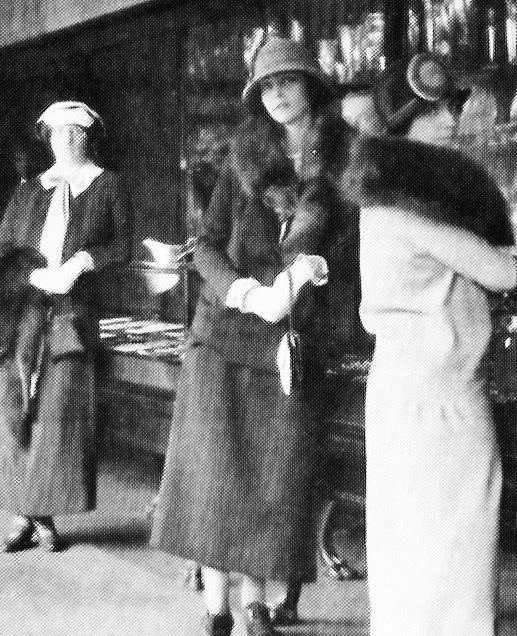
Months later, at the 2023 Annual Conference, the stage was set for an unexpected and heartwarming reunion. Little did the Junior League of Columbus know that the Junior Leagues of Tulsa had received their letters and made a profound historical connection. Serendipitously, on the final night of the Annual Conference, the Junior League of Columbus won an AJLI award, which brought its Members to the stage and into the spotlight. It was the perfect opportunity for the Junior League of Tulsa to connect with its sister League.
BY NICOLE BERGMAN, AJLI VICE PRESIDENT OF MARKETING AND COMMUNICATIONSIn a touching moment, the President of the Tulsa League expressed her gratitude for the letter sent months prior and shared an astonishing revelation. She revealed that the first president of the Junior League of Tulsa, Francis Black Lockwood, and the inaugural president of the Junior League of Columbus, Ohio, Margaret Black Edmunds, were sisters! The group was filled with awe at this unexpected twist of fate as the historical connection between these two Leagues became clear.
The Junior League of Tulsa's journey to uncover this historical connection unfolded as they delved into their own centennial preparations. They found and reconnected with a member of the Lockwood family, leading to a fascinating discovery. The Great-Granddaughter of Francis Black Lockwood found an obituary in which it states, 'her only sister, Margaret Edmunds, was a founder of the Columbus, Ohio, Junior League and served as its President for the first two years.' This revelation added a profound layer of historical significance to the occasion.
The story then transitions to a series of questions that remain unanswered. Who were these remarkable sisters, and how did they come to know about The Junior League? Were they members of Leagues elsewhere before founding these Leagues? The origin story remains shrouded in mystery, but their impact and legacy continue to resonate.
Francis Mary and Margaret Manning were born in 1890 and 1892, respectively, in Somerville, Massachusetts, to Joseph B. and Francis A. Black. But how did they find their way to Tulsa, Oklahoma, and Columbus, Ohio? The answer lies with their husbands. Francis married Robert J. Lockwood, an Ivy League graduate who moved to Tulsa, Oklahoma, and was an attorney for the Lockwood family’s Sabine Oil Company. Before going into the insurance industry. Margaret married Rolland Mooney Edmonds, another Yale alumnus, and moved to Columbus, Ohio, where Rolland also practiced law.
Fast forward a decade, and these sisters, now married and raising families, found themselves at the helm of The Junior Leagues they had co-founded. The story of why they chose to found and become Presidents of Junior Leagues in their respective areas, and how they came to know about the Mission remains a mystery. Yet, what is undeniable is the lasting impact and legacy they left behind.
Francis Black Lockwood served as a two-year president from 1923 to 1925. Her leadership was marked by an unwavering commitment to The Junior League's Mission. In a time when the League's work was not widely understood, she tirelessly worked to interpret its aims and ambitions to the broader community. Her active years in the League were fruitful and rewarding, as she lent her wisdom and thoughtfulness to counsel those in need. Her unfailing good humor and her exceptional ability to uplift others made her judgments invaluable. Francis passed away in 1961 at the age of 71.
Margaret Edmonds, like her sister Francis Lockwood, made an indelible mark on her Junior League and her community during her two-year presidency from 1923 to 1925. Margaret's boundless enthusiasm for life and her magnetic personality endeared her to everyone she met. Her dedication extended beyond The Junior League, as she served on the Women's Board of the Children's Hospital and the Tuberculosis Society Board. Margaret's leadership also extended to the Criton Club, where she served as president.
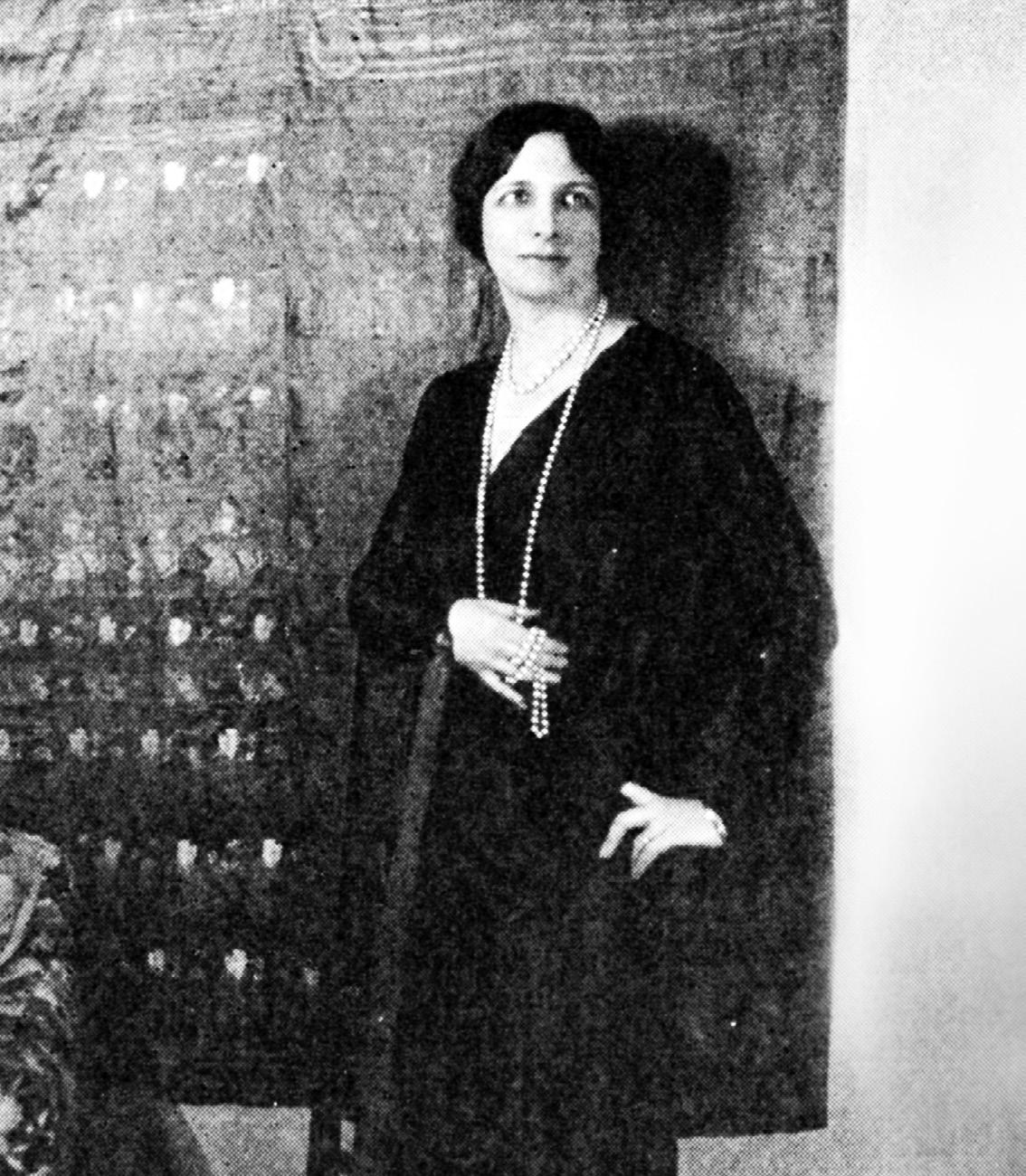
Margaret's commitment mirrored her sister's in interpreting The Junior League's Mission to the broader public. Her legacy lives on through the impact she had on League and the people she touched. Margaret passed away in 1978, at the age of 85, leaving behind a rich tapestry of memories and a profound influence on the organizations and causes she held dear.
In this extraordinary tale of two Leagues celebrating centennials, it is the enduring bonds of family, the shared commitment to community, and the legacy of two remarkable sisters that stand as a testament to the power of sisterhood and the enduring impact of The Junior League Movement. Their story inspires us to celebrate not only milestones but also the meaningful connections that unite us across time and distance.
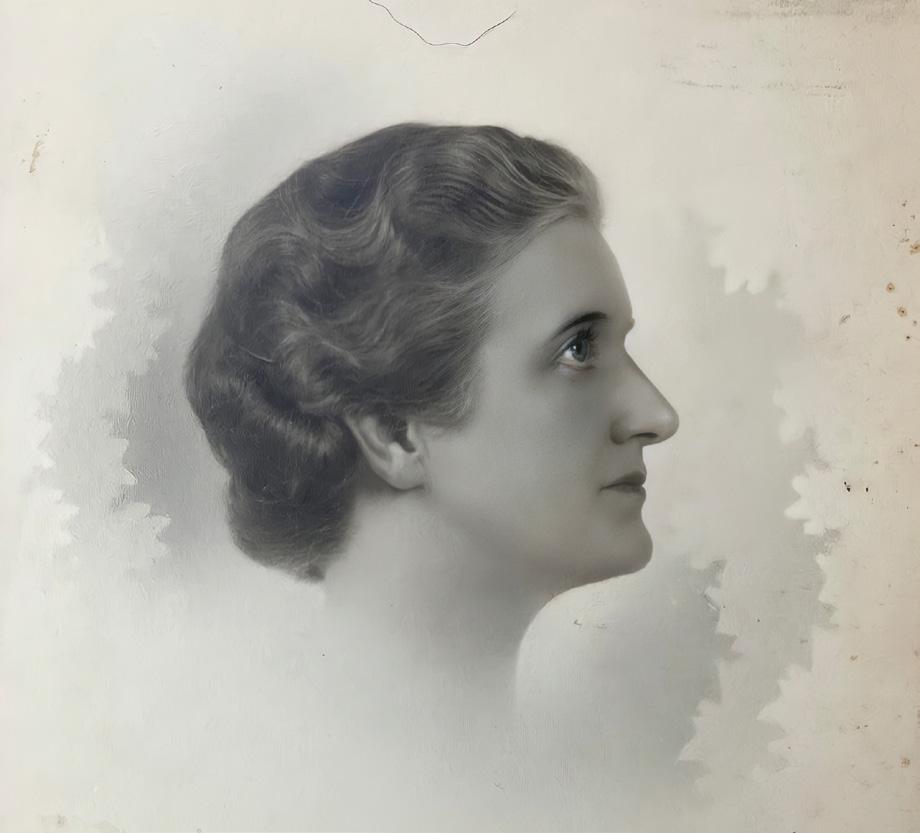
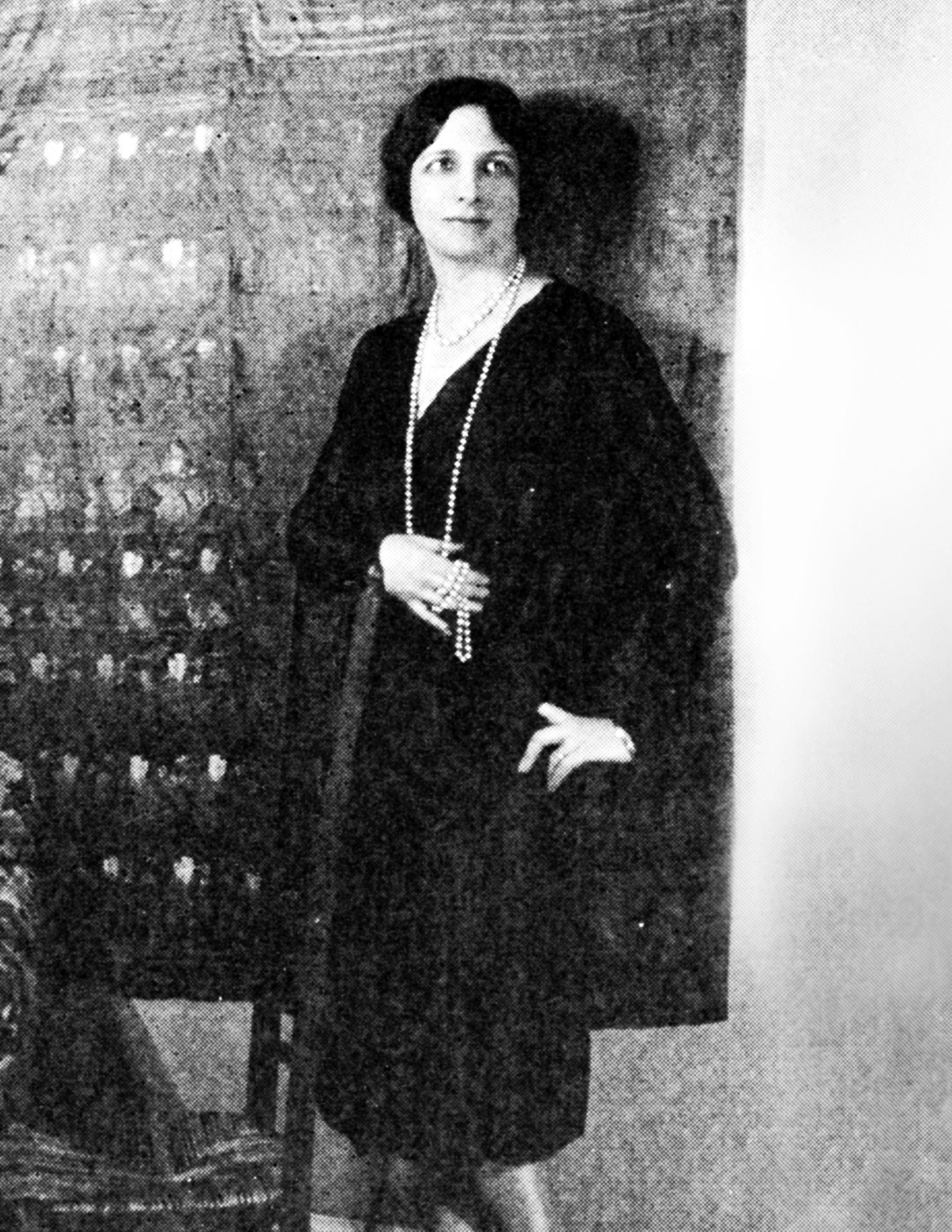
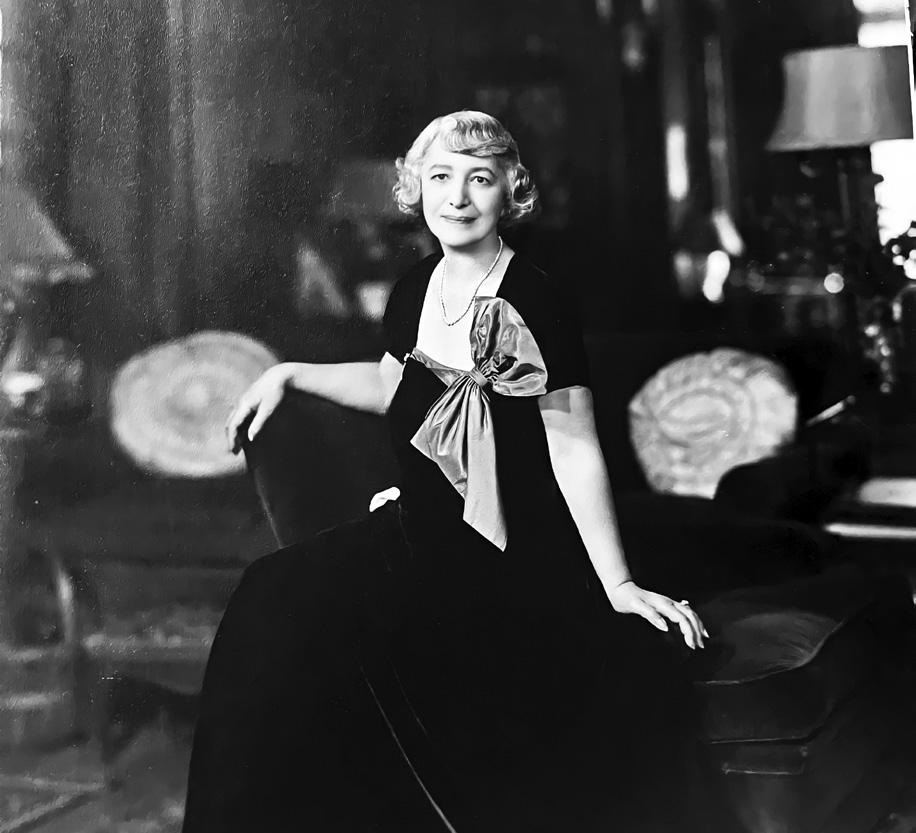
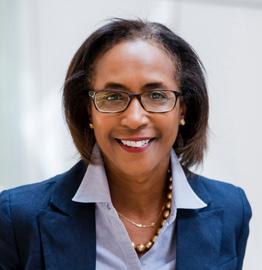
DONA PONEPINTO President 2022-2024 Junior League of Tacoma
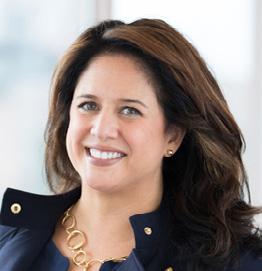
MICHELLE VAETH Vice President
2022-2024 Junior League of Cincinnati
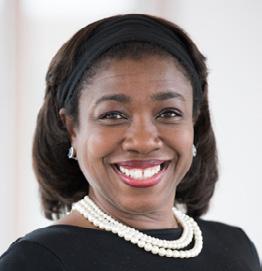
LASHONDA KENNEDY Governance Committee Chair 2023-2024 Junior League of Palo Alto • Mid-Peninsula
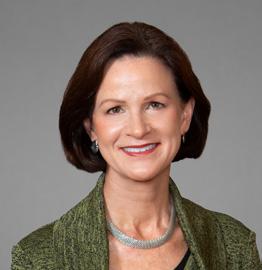
JUDITH JORGENSEN
At-Large Director 2022-2025 Junior League of Portland, OR
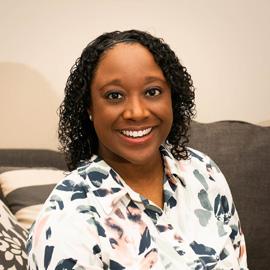
JESSICA SHARP Governance Committee Vice Chair 2023-2024 Junior League of Houston
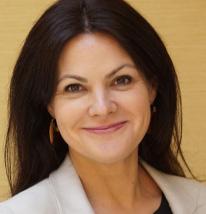
ALICE GLENN President-Elect 2023-2024 Junior League of New Orleans

GENA LOVETT Treasurer 2023-2025 Junior League of The City of New York
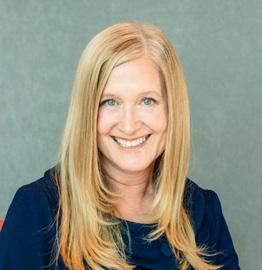
MELISSA ALLEN At-Large Director 2023-2026 Junior League of London

KATHRYN KOESSEL
At-Large Director 2023-2026
Junior League of Minneapolis

LASHONDA KENNEDY Governance Committee Chair 2023-2024
Junior League of Palo Alto • Mid-Peninsula
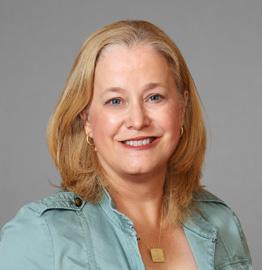
GRETCHEN GARCEAU-KRAGH Secretary 2022-2024 Junior League of San Antonio
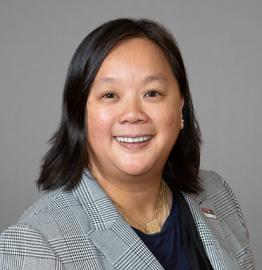
LYNNA DO At-Large Director 2021-2024 Junior League of Palo Alto • Mid-Peninsula
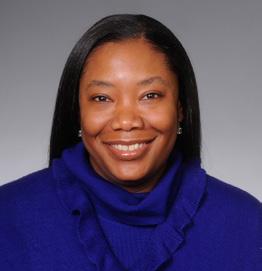
SABRINA LEWELLEN
At-Large Director 2022-2025 Junior League of Little Rock
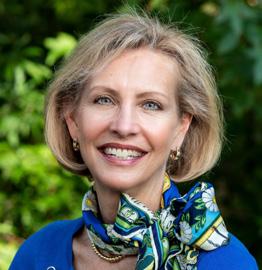
DIANE FLANAGAN
At-Large Director 2021-2024 Junior League of Charleston

DR. ZONZIE MCLAURIN At-Large Director 2021-2024 Junior League of Jackson

JESSICA SHARP Governance Committee Vice Chair
2023-2024 Junior League of Houston

KATHY OAKS
At-Large Member
2022-2024 Junior League of Lubbock
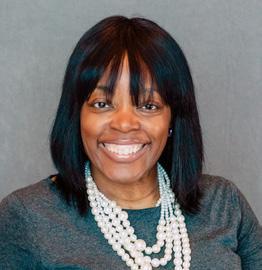
STACEY A. CHAVIS At-Large Member 2023-2025 Junior League of Atlanta
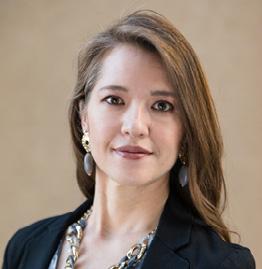
MARYANNA HUONG PEAVEY At-Large Member 2023-2025 Junior League of Boise
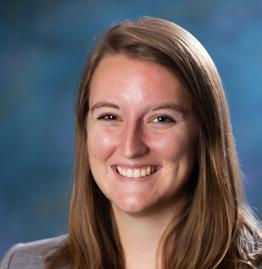
BRIANNA HICKMAN At-Large Member 2023-2025 Junior League of Wheeling
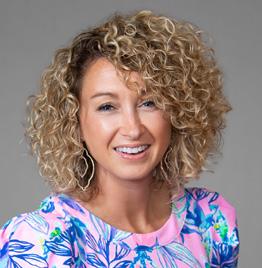
ALEX RISTER At-Large Member 2022-2024 Junior League of Greater Orlando
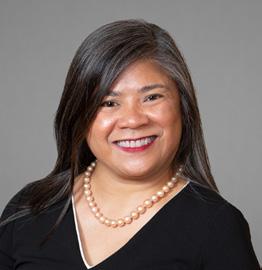
MERILOU GONZALES At-Large Director 2022-2025 Junior League of Milwaukee
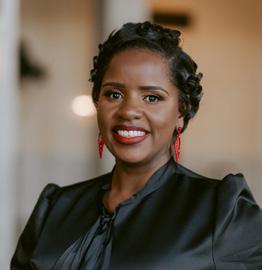
GRACE SEMONES
At-Large Director 2023-2026 Junior League of Alexandria
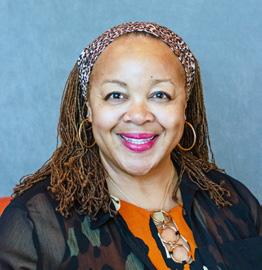
ZENA MARTIN At-Large Member 2023-2024 Junior League of Atlanta

LAURA TACKETT At-Large Member
2023-2025
Junior League of Ann Arbor
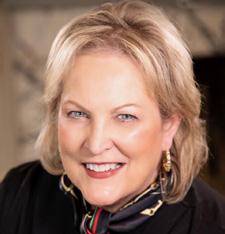
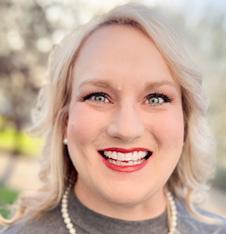
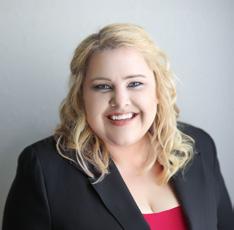
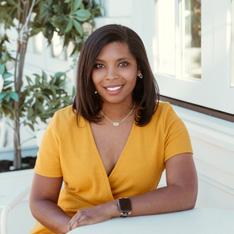
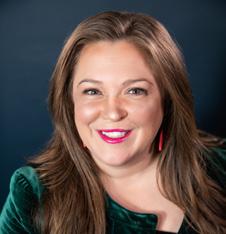
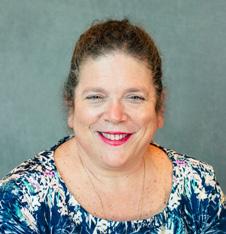
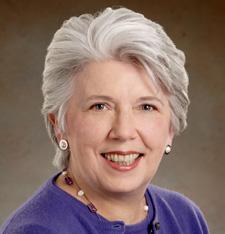

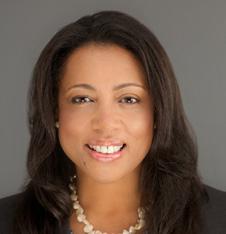

MELANIE SCHILD
Chief Executive Officer
MELODY LAROSE Senior VP, Operations
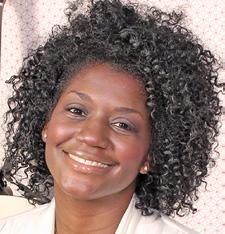
NICOLE BERGMAN VP, Marketing and Communications

JOSLYN MCGRIFF BENSLEY VP, Fund Development and Member Engagement

ERIKA CAIN League Success Manager
HEATHER GAYLORD Digital Media/Data Specialist
KATELYN GRAY League Success Manager
KATIE WALSH VP, League Services
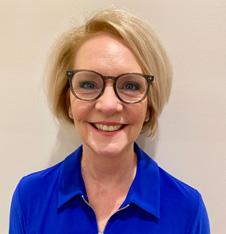
JUDY ALBERTSON
Sr. Director, Finance and Accounting
ANNE DALTON
Sr. Director, Advocacy and Engagement / League Success Manager
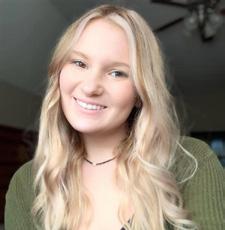
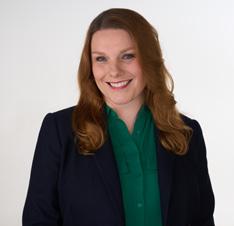
GINNY MANGUNO Special Projects Manager
MADELINE NEYENHAUS Executive Communications Manager
LISA RHYAND-VAUGHAN League Success Manager
INES SUCRE
Sr. League Success Manager
PAMELA ANTOINE WEEKES Sr. League Success Manager
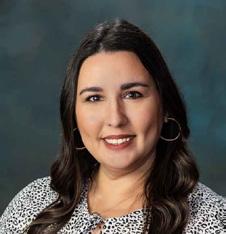
PAM SMITH Special Projects Manager
JACQUELYN BAUMAN Director of Conferences

EMMA BRIGGS
Director of League Programs
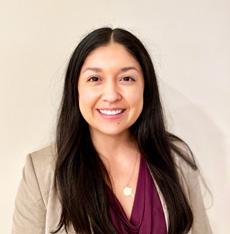
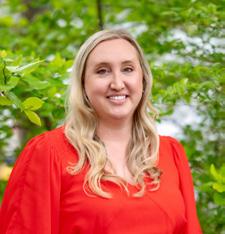
NICOLE STREET League Success Manager
BROOKE TIBBITTS Fractional Controller
ELIZABETH WHITED Social Media/Graphic Design Manager
STRAWBERRY CAKE
Mrs. George M. McCarroll
The Junior League of Lafayette
CAKE
1 box white cake mix
4 eggs
1 cup vegetable oil
1 cup strawberry juice
1 pkg strawberry Jello (combined with ½ cup water)
Combine all ingredients and blend for 4 minutes. Dough may seem watery. Pour into 3 round or square pans and bake 30 minutes at 350 degrees.
ICING
1 box powdered sugar
½ stick butter
2 pkgs frozen strawberries
Enough juice to blend
Melt butter. Combine with other ingredients and add juice until you reach spreading consistency.
Click here to view this recipe as a PDF
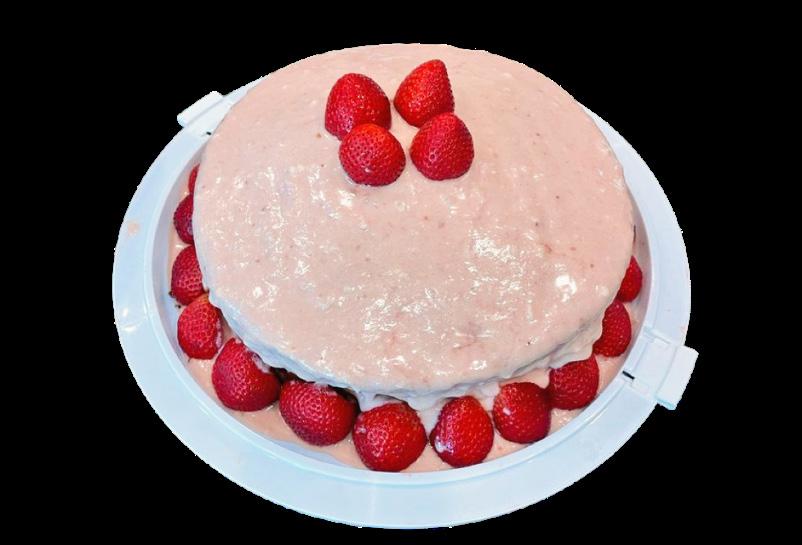
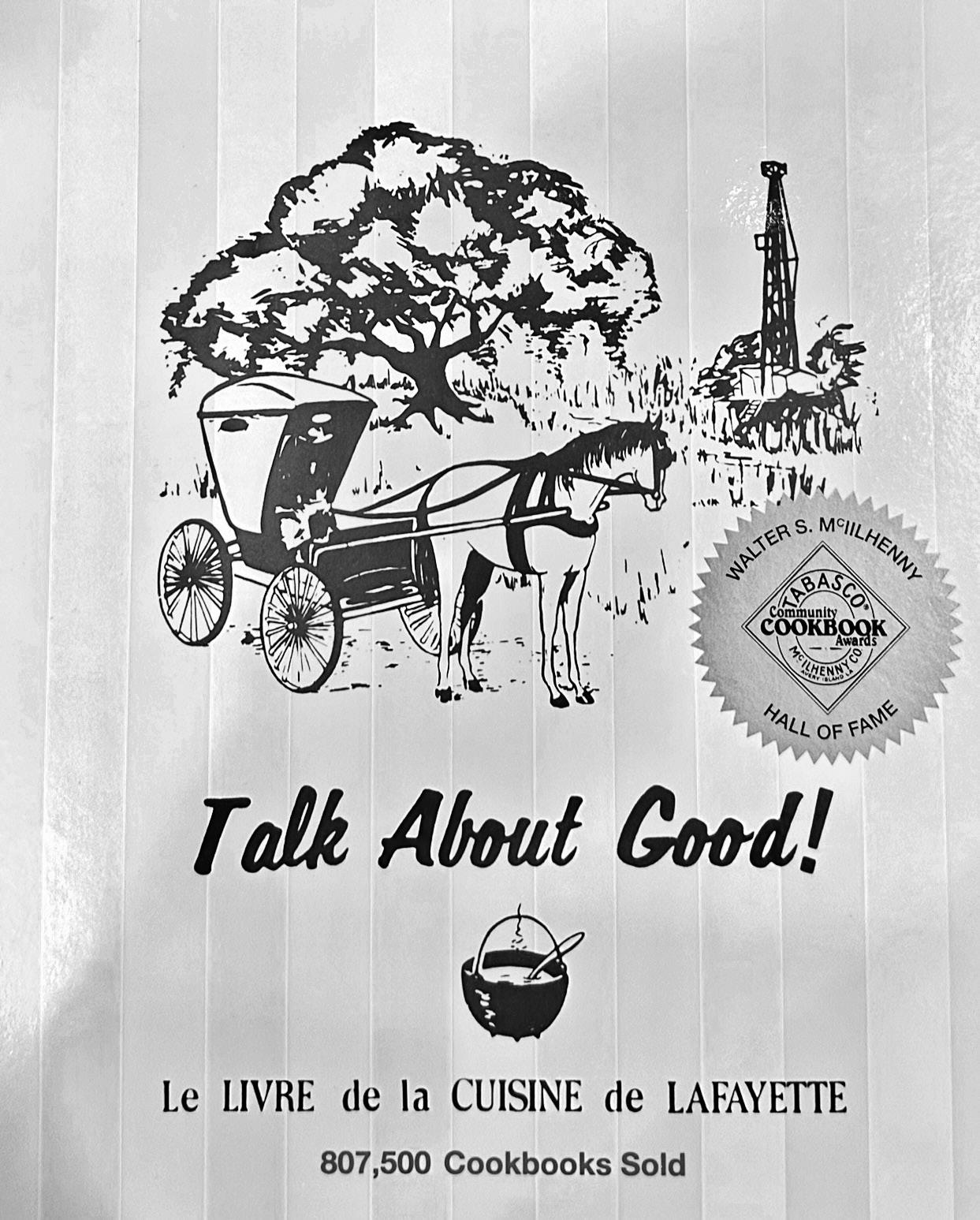
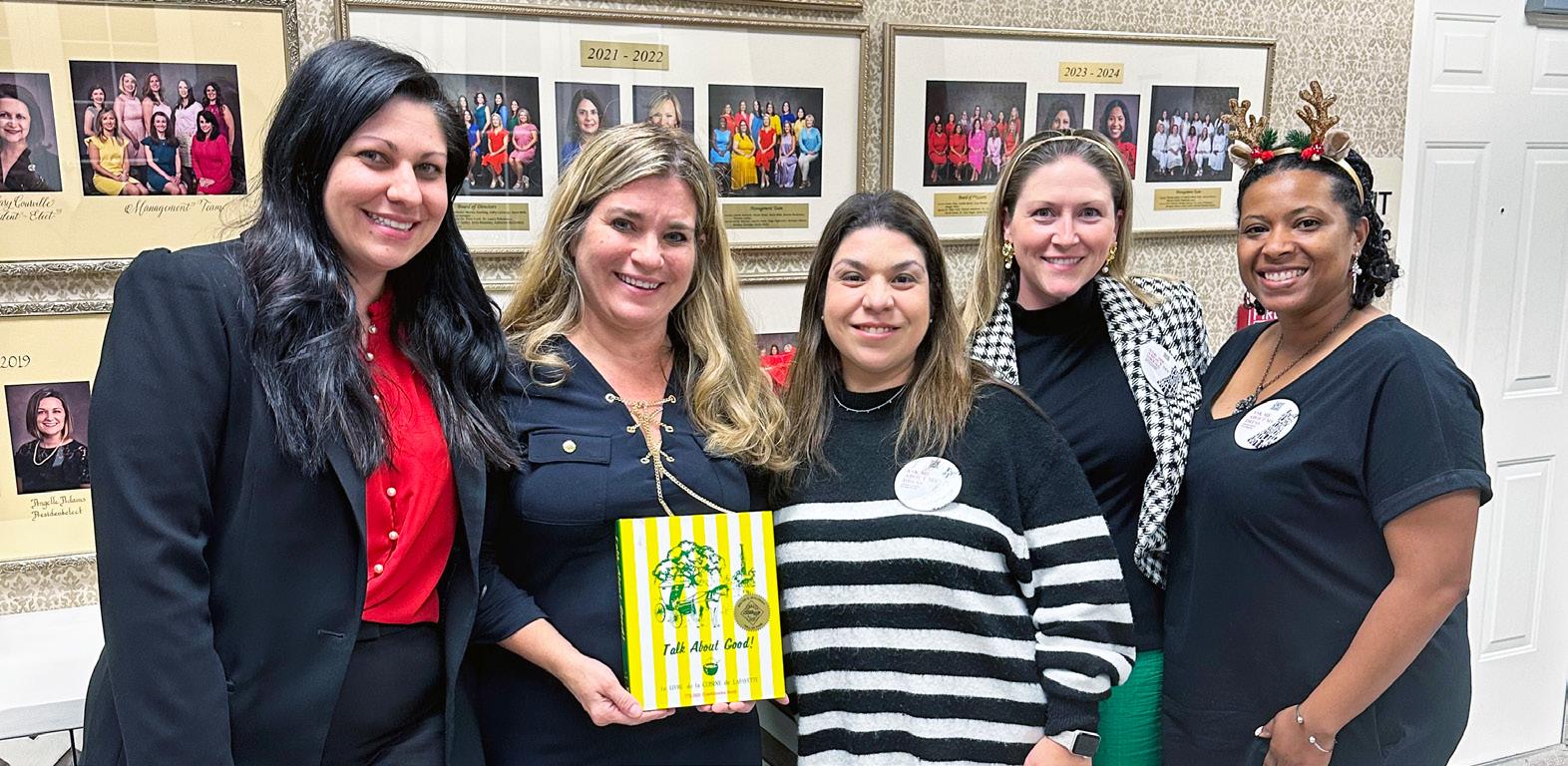
Interested in being a part of the creation of The League Life ? Email jbauman@ajli.org for more information!